have a seat, have a cookie, there's tea in the kettle and a ton of armchairs. relax, let's chat.I have an ask box. Any questions, queeries, reccomendations? I would be thrilled
Don't wanna be here? Send us removal request.
Text
Keep The Stories, Not The Books
For all those who are unhappy with what JK Rowling is doing but don't want to give up your wizard school books, I get it. Trust me, I do.
But she is directly and intentionally hurting a lot of people with that Harry Potter money. Trans people are a part of that, but they are not all of it.
You don't have to burn your old Griffendoor Crocs, or even stop wearing them. But understand that every cent that goes to her goes to causing real damage, and exposure and popularity contribute towards that.
I describe her actions as a "betrayal" for a reason.
So... I have a proposal. A different magic school. Keep that feeling of whimsey, keep the love of stories about friendship and the sense of wonder from a story where almost anything is possible. Keep the story, not the book.
Enter this post, as a kind of recommendations list. I have a few stories that I like for different reasons, and I hope that maybe you will enjoy them as well.

Dazzling will break you, and I mean that with as much love and reverence as I can muster. Chịkọdịlị Emelụmadụ's grasp on emotionality is unique and resonant in a way I'm not entirely sure how to articulate. Dazzling will break you.
It's also a story by a Nigerian author and set in Nigeria, which makes it a really contrast to the Eurocentric storytelling of mainstream literature. Essentially, it's a cool book and if you grew up reading the Harry Potter books, I guarantee you this will be something both recognisable and completely new.

The Gatekeeper Chronicles are pure vibes. I was surprised at how essential this series and especially the first book was for this post. As in, on paper (heh) it's not that similar to the Harry Potter books, but holy moly does it scratch that itch.
It's urban fantasy with some cool worldbuilding, but it's also paced very peculiarly, and I find that fascinating. To me, one of the draws of Harry Potter was how it felt to read.
Morality and skill are not one and the structure of the Harry Potter books is engineered to keep you reading. The Gatekeeper Chronicles understands that flow of interest and anticipation and movement in a way that I guarantee you will love.
The reason JK Rowling is a bad person is her bigotry, not her writing aptitude. Do not get that twisted. The way to outdo her as a writer isn't to go overboard into flowery language, it's a lot easier. Don't be racist, don't be homophobic, don't be transphobic, DON'T BE AN ASSHOLE ONLINE. It's not hard.

Little Witch Academia is one of the most heartfelt stories out there.
I dont watch enough Anime to comment on how the story fits into its genre or style. I've seen two episodes of Frieren and that's it. I saw LWA for the first time because a friend noticed I was writing this post and made me watch it.
That being said, Little Witch Academia is gorgeous. The art is really nice, the tone is really a sweet, the acting is adorable
This was a story that felt, to me, whimsical and folkloric, in the same way that the first few Harry Potter books felt small scale and fairy tale.
The other stories on this list are emotional or powerful or resonant. I would reccomend LWA as a comfort watch.
Genuinely, find a mug of hot chocolate and a stuffed animal and maybe a few friends to watch this with, and I promise you that it will match the experience of watching the Harry Potter films.
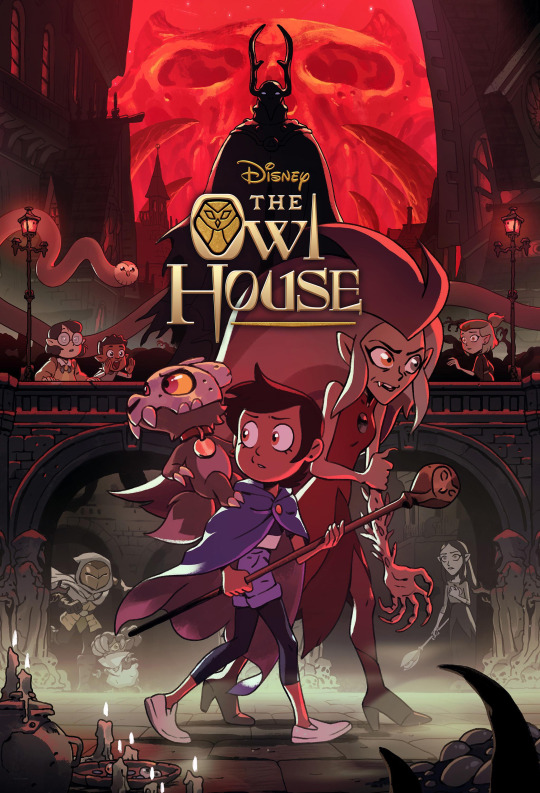
I have to include The Owl House here. It's one of my favourite stories out there, to the point where I am almost finished a series dissecting each episode. It is also a Harry Potter parody and open about that, except for one thing.
The Owl House feels like the obvious choice, but I don't think it makes this list fairly. As far as Wizard School stories go, The Owl House doesn't really have a lot of it. The story is more about the wider world.
In any case, 13/13 would recommend.

Kids On Brooms is the poster child for my final reccomendation, but I could easily have put almost any any TTRPG here. Tell your own story with friends.
Cantrip is awesome and inspired by Little Witch Academia, and DnD5e and Pf2e both have magic school adventures that are really quite good. That's coming from someone who despises Pf2e's adventure paths, so you know it must be good.
Essentially, get some friends together for a one-shot or a campaign set in a wizard school and have fun.
Also, side note, Pf2e has potions that Trans your gender and that are really accessible for low level characters and even commoners and other NPCs. Trans people are built into the mechanics of the system and settings and I think that's cool.
.......
Now, these are stories that those around me love but I didn't get much out of. I think they are worth reccomending, but I don't have much to say beyond that. So, please accept these second hand reccomendations.
Wednesday. A lot of people love this and I know tumblr itself would murder me if I didn't include it.
Wicked. The book not the musical. I love the musical, but my sister insisted I include the book here, so here we are.
My Hero Academia. I know nothing about this series. I have not seen it. But I am told it is very good.
Summoner. The only reason this book series didn't make the main list is that I couldn't convince myself the school was that important to the story. Still worth a read tho.
The School For Good and Evil. This one comes highly reccomended from a plethora of people, even if I did bounce off it pretty quickly.
A Wizard Of Earthsea. Honestly, this was the obvious answer, and The Owl House already had that spot locked down. Really good book though. Yet another property that I discovered through the film and then read the book.
#harry potter#fuck jkr#book reccomendation#story recommendation#dazzling#Chịkọdịlị Emelụmadụ#gatekeeper chronicles#little witch academia#toh#the owl house#pathfinder#dnd#strixhaven#kids on brooms#wednesday netflix#summoner#mha#my hero academia#wicked book#wicked#school for good and evil#a wizard of earthsea
14 notes
·
View notes
Text
The Siege Of Hexside (For The Future)
The Boiling Isles fell at noon.
In the morning or the evening, a witch could look to the sun and see which way to go. The sun was a guide, offering the compass points, and at the very least, a direction to travel.
At night, witches turned to the moon and the stars for protection. Set out by the titans or even before that time, the moon and the stars are stewards of the travelers who wished to find a place to call sanctuary. The stars were silent, after all. Angels of secrecy.
But at noon, the witches were trapped and uncertain. Disorientated by merciless light. Could the sun be setting or rising or hidden entirely. Which way could they go?
The Boiling Isles fell at noon.
Let me explain.
SPOILERS AHEAD (The Owl House)

One Day.
A mangled scream echoed through the halls of Hexside, turning quickly into a roar and a crash. More screams, then silence.
The spell circle began to glow brighter, almost as if it was spinning in place around a great, white furred boar. Four jagged tusks rose up like a cage around the monster's face, and two rows of stone spines ran down the length of its back. Its eyes, however, were childish, and frightened.
The boar began to shrink, its spines crumbling to ash and hair receding until all that remained was a student clad in a yellow sleeved uniform, shivering and staring up at the teacher who had saved them.
Another student sat at a desk nearby, his head in his hands.
This was Edric Blight, second child of a magimechanical empire, illusionist and trickster extraordinaire, failure.
His eyes flicked between his near empty cauldron and his friend being led away to the healing homeroom. His head hit the table. He should have stuck with illusions.
“Impressive.”
Emira, Edric’s twin sister. Successful, confident, everything Edric needed a concealment stone to be.
Edric shook his head.
“Come on, we have to get home.”
Edric gave a sigh of resignation and turned his gaze to the window. He knew only pieces of what was to come, and that fact terrified him.
Was Belos going to send a single spell and wipe everyone out on the spot? Could they hide behind a wall or underground?
The Golden Guard, Hubert, if Edric’s memory served him correctly, had spoken of a draining spell and a plan to eradicate the Boiling Isles completely. But there was a certain practicality to the whole affair that Edric found uncertain.
Would it be an army? Belos had soldiers; it was certainly a possibility.
Or was it a creature. Was Belos going to summon some entity from the sky to crash down and devour the very titan itself?
In any case, Edric knew he needed safety and assurance. He liked to have things ready in advance, he liked knowing where he stood. He needed this potion to work.
Almost thoughtlessly, Edric took a vial and scraped the remaining dregs of his potion into it, before stoppering it, and placing it into his pocket.
His thoughts were still glued to that purple liquid when he reached his parents’ manour.
One Hour.
Crystal balls flickered to life across Hexside accompanied by the tapping and flapping of penstagram scrolls. In classroom after classroom, all eyes were fixed on the Day of Unity. All ears listened attentively to Perry Porter’s excited introductions of the Coven Heads. All minds were transfixed by the Emperor’s Castle.
All except for one.
Wandering the empty halls was Skara, her mind racing, her fingers drumming a light rhythm on every surface. Absentmindedly, she began to whistle.
Everyone else had reacted with dread to the news of the emperor’s betrayal, everyone except Skara. She was cool, she couldn’t lose composure. She had to use what she knew, and she knew about music, and she knew about sport.
In both cases, you had to improvise, but in both cases, it was wise to read ahead. In music, Skara was a scholar, she knew almost every piece on the Isles, and had a talent for memorisation. In grudgby, Skara preferred to research her opponents in advance and make plans to counteract their tactics.
Skara knew that the emperor had an army, so her best bet would be to challenge them on her home turf. They had already fought part of the Emperor’s Coven here before, and had prevailed, but Skara wasn’t satisfied.
She needed to know every hall, every choke spot, every blind corner. She needed escape routs and false walls and…
“Hey!”
In her haste, Skara had turned a corner and collided with another student, knocking both of them from their feet.
Skara impacted the ground hard, and the air hissed froaway from her as she lay on her back. A voice called out, the voice of a friend.
“What was that for?”
Skara tried to respond but found herself still winded and able to give but a wheeze. She heard a gasp, and footfalls.
Someone lifted her and propped her up in a sitting position against a wall. Skara saw a student in a uniform denoting a multi-track specialty, and a peculiar earring. Viney.
The spell circle was summoned, and Skara felt her breath returning to her.
“You ok?” Said Viney. Skara nodded quickly, and Viney stood, beginning to walk away.
“Wait!”
Viney stopped.
“You saved me,” Skara stammered. “From Graye, I mean. I never got a moment to say thank you.”
Viney shrugged. She was yet to turn around, so her voice came weird and distant.
“Now you have. You’re welcome.”
Silence.
“Thank you.” Said Skara.
Silence.
Viney turned slowly, resting her hands against her hips.
“Ok, spill it, Skara. What are you doing?” Viney’s gaze was iron as she watched Skara rise to her feet.
Skara saw sympathy and bravery, but also the same fear she had seen in everyone else. She didn’t know Viney as well as she should have, but she could recognise someone who was acting.
“I don’t know.” She ventured. “Amelia and Cat won’t listen, and Bosha…” her voice trailed off. “What if Graye comes back, or worse. I don’t know how-”
“Skara.” Viney had crossed the room, and as Skara had raised her hands to her face to wipe away tears, had caught them. “Let me show you something.”
A few minutes later, a locker slid aside to reveal a much larger space contained behind it.
Viney led Skara inside, and Skara saw a tall, circular room. A stone slope curved around it like a spiral staircase, but Skara’s eyes were drawn to the hundreds of doors and trapdoors that were ostensibly built into the walls. Each sat at a different, peculiar angle, sometimes even upside down.
Viney led her down the ramp to an unassuming, pentagonal wooden hatch. On it, someone had scratched the word Bump in blocky letters.
“How?” Skara asked. “Even if this room has stayed hidden since Titan knows when, Principle Bump’s office is on the top floor.”
Viney shrugged. “Dunno. Take a listen if you don’t believe me.”
Skara pressed her ear to the hatch, and watched Viney do the same.
Beyond it, there came the unmistakably crotchety voice of Principal Bump in conversation with the school’s head Illusions teacher.
“All records seem to have been expunged.”
“But Sir, you said-”
“I know what I said.”
“Hieronymus, you and I both know that this is futile. We need to focus on the task at hand. Protect the students.”
Silence.
“Thank you Mrs…”
The hatch gave a disconcerting creak as Skara and Viney found themselves leaning further and further in to this conversation. They moved back by a step.
Those inside the room appeared to have heard the noise too.
“What was that?”
“Probably the floorboards.” You could hear the smile slowly creeping across Bump’s features. “But if, in the event that someone might be listening in to this conversation, miraculous and impossible as that may be, I think that they should know two things. The first, the Boiling Isles is older than Belos, and try as he may, history leaves its traces everywhere. And second…”
Skara and Viney strained their ears, trying to stay as silent as possible to catch every whisper. They saw a light begin to push through the cracks in the hatch, and looking around they could see that same golden aura emerge from every door in the room. They heard Bump hiss with pain, and they heard his words, conspicuously and deliberately even.
“The staff are fully ready, and I trust that I speak on behalf of all my colleagues, to lay down everything in defence of this school and everyone within it. And when that happens, you must run, and you must know that it has been an honour.”
One Minute.
The Emperor’s Castle was an imposing structure, carved like deep scar above the heart of the Titan. This was a fortress.
Presently, it sat beneath an eclipsed sun, held trapped by thousands of golden threads that filtered through an arcane forcefield, draining magic like parasites.
Outside, on a hill, there stood two shoes, each with a set of bat wings growing from it.
Three eyes searched the crowd, panicked, then with recognition.
“Mom! Mom!”
The wings flicked into gear, and Boscha rushed the shield. She saw her mothers notice her, and try to move, then fall in quick succession to the ground.
Boscha screamed, punching the forcefield again and again with one hand. Drawing a trembling spell circle and igniting it to try and burn her way through.
Nothing worked.
Boscha sank to her knees, resting her head on the shield and clutching her right wrist. She should never have taken it, never have come here. She wasn’t to blame for any of this but in her grieving mind, she did not know. She could not know.
A network of glowing veins began to trace its way out from beneath her hand, buzzing with static. A smell of ozone reached Boscha’s nostrils.
With her good hand, Boscha reached into a satchel at her hip, fumbling through ingredients until it reached a small, square piece of paper.
Boscha’s hand reached up slapped the Power Glyph on the back of her neck, where it joined a growing layer of others.
The veins receded, and Boscha glanced upwards, through the forcefield, at the sun.
One Second.
The Boiling Isles were frozen in time. Wind stood still, birds halted midair in their flight, and a child in pyjamas glanced out from the eye socket of the titan, raising one finger to point at the moon.
The Owl House lay dormant, empty and ransacked.
Boonesborough was deserted.
A small witch by the name of Matt Tholomule stood in a field of snow, staring upwards as, in the same moment, every other being on the Boiling Isles followed his gaze.
Noon.
The Boiling Isles was silent.
Had that genuinely just happened? Had the moon just shifted before everyone’s every eyes?
The Blight Manour lay in pieces, destroyed by a battle barely a day old.
Edric and Emira sat on the floor, Edric’s hand fiddled with a vial of purple liquid, spinning it between his fingers.
Between them, there was a circle drawn in chalk on the floor.
The Emperor Belos had developed teleportation glyphs that were complicated and vast. The perfect layout of spells that ran into each other, cancelled each other, and amplified each other into an almost wasteless mode of transportation.
Almost.
In truth, a teleportation glyph didn’t need to glow with different shades of light. But Belos was inefficient and liked to keep up appearances.
This, on the floor infront of the Blight twins, was none of that. Pure, unadulterated geometry and magic. A simple circle, nothing more, nothing less. These two wanted to leave this place, and there was very little anyone could do to stop them.
Outside, there was a humming, and the twins looked to their bedroom window to see witches. No. That couldn’t be right. These witches were flying without palismen or spells, and their forms, silhouetted against the sun, looked wrongs, somehow.
Then the twins saw their mother, and registered the size of these new entities. Each of these creatures’ seven arms was longer than Odalia Blight was tall, and the glowing blue string that hung from each finger stretched for another few metres.
“Mom! What are you doing?” Called Emira. Odalia gave no response, striding casually out into her front garden, ignoring the smoke curling from her right wrist.
Edric focused on the creatures, taking note of the hinged joints and the singular eye in the centre of an otherwise featureless face. He noticed that the pupil was curved, like a crescent moon.
“Friends.” Said Odalia. “You must be here on behalf of… well, whom ever you are working for. Welcome to Blight Industries. As the matriarch and an oracle, I am delighted to see a partnership in our future. I can offer guidance and advice, weaponry, or even-” Odalia Blight never got to finish her offer.
In a fraction of a second, one of the creatures had covered the fifty metres between itself and her and pressed a finger to her forehead. Odalia went still.
It was not Odalia’s hand that impacted the grass, but a wooden, puppet’s limb, attached to a glowing blue string that trailed off into nothingness after a few centimetres. Neither was it Odalia’s face that looked impassively up at her children. Odalia’s jaw did not have a hinge. Odalia’s eyes were not dull and glassy.
In Hexside, things were not fairing much better.
Students rushed through the halls, chased by spiderlike, seven armed creatures that plucked them from the crowd as if they were nothing.
Skara saw a teacher in the construction track lifted into the air, and saw their arms go limp. She saw her friend, Cat, lying motionless in a doorway. She saw Celine and Eileen cowering as a creature reached for them, only to stop as a burst of smoke interrupted it. Skara saw Barcus leading the two to safety.
“Boscha!” She cried out. Her friend was missing, and abrasive as Boscha was, Skara did care about her. There came no reply from the cacophony.
More students. More spells attempting to ward off the creatures. More chaos.
Someone ran into Skara, knocking her from her feet. This time, however, Viney caught her.
“Where’s Jerbo?”
“Where’s Boscha?”
“Move!”
Viney tugged on Skara’s arm, pulling her out of the way as a creature lunged for her. She heard it hit the ground and roll and turned to meet its gaze. It had one eye, one pupil, oddly shaped.
Skara didn’t have time to run as the creature lunged once more, she could only try to shield herself with her hands.
A burst of fire intercepted the hand.
A single ball of light bounced off the lockers and walls and ceiling, then back at the creature.
The gears in the creature squealed with displeasure as it recoiled from the flames, turning its attention to its assailant. Too fast to be a witch, unless…
Skara heard the scream. It was as if all other noise had cut off and all she could hear was that single, primal roar of rage and pain and grief. Though she had never heard its owner like that before, she knew that voice.
Boscha.
The Blight twins recoiled as the creatures turned their gazes towards them. Edric formed a spell circle and the balcony doors slammed shut. The locks clicked a fraction of a second before one of the creatures crashed into them. The two watched as it scrambled and scratched at the glass, then to their horror, they watched the key begin to turn of its own accord.
The teleportation circle. The twins turned, as the door crashed open and the creature tumbled through.
On the positive, the creature sailed between the twins, narrowly avoiding both of them. On the negative, it landed between them and the circle, blocking their escape.
There was a moment of stillness, then the creature lunged.
“What is she doing?” Shouted Viney above the crowd. “Trying to get herself killed?”
Skara stared as Boscha shot through corridor and classroom, aiming for the creatures. One by one, she saw them turn their anger to the flaming teenager, and instead of fighting, Skara saw Boscha speed further into the school to challenge another.
“No.” She said. “She’s drawing their attention away from us.”
Viney’s eyes widened, half in amazement, half incredulity.
“Then we need to get everybody out.”
In truth, the two had both been right. Boscha was trying to help her friends, but a grieving mind can see very few things clearly. She hadn’t been able to save her mothers, she hadn’t been able to stop the emperor, but these creatures? She could hurt these creatures.
Boscha leapt, he shoes carrying her above the crowd as she jumped from the top of a locker to swing from a light in the ceiling, all the while spinning her staff in her hand, building up energy and igniting the air. The staff came to a halt, but the wheel of flames continued forwards, colliding with the head of a creature and causing it to drop Mary to the floor, she made no attempt to get up.
The creature recovered, Boscha did not, continuing her trajectory and placing a boot into its eye. The creature was silent, but fell from the wall where it was perched.
Boscha landed, the creature hit the ground.
The creature’s hand shot forwards, over the body of Mary. Boscha knocked it aside, parrying it with her staff and throwing herself forwards at the creature once more.
Her knees hit it in the neck, pushing it backwards, and her hand formed a fist that lit up with malicious flames that all but concealed the glowing veins running across her wrist.
Boscha didn’t see the creature’s other hand until it was too late. She felt the impact of the back hand, then the ground, then the ground again, then the wall.
She groaned, touching her ribs and noting the horrible scratching feeling when she breathed. She grabbed her wrist in pain as that smell of ozone returned, watching as the creature regained its footing and two more like it rounded the corner.
But Boscha was not done yet, the whistle hadn’t been blown, the bell hadn’t been rung, the game was still on.
Her hand reached into her satchel once again, this time producing a potion, blue in colouration. In one swift motion, Boscha flicked the stopper out of the way, rolled to avoid the hand of a creature, and drank the potion.
The Blight twins scattered around the room as the creature flailed at them.
Edric ducked behind an upturned table and formed a spell circle infront of himself. Instantly, two duplicates of himself appeared and darted into view in opposite directions. He directed one toward the balcony, and another to raise its fists in a fighting stance. Neither lasted very long.
The creature tried to grab the first before it could reach the exit. Unfortunately for it, illusions are notoriously difficult to pick up, so the creature’s hand clenched on empty space and the duplicate disappeared in a puff of smoke.
The creature glared at the second image with silent fury and sent a fist through its face. Edric didn’t see that duplicate fade, but he did feel the creature impact the wall and send a crack through the entire building.
There was a moment of stillness, before the floor gave out.
Edric, Emira, and the creature fell two stories onto rouble. The two witches knew spells that could mitigate falls, the creature did not.
Miraculously, the piece of floor containing the spell circle had survived undamaged. The rest of the house had not been so lucky.
Now, the creature stood over the circle in the corpse of a mansion. Empty but for columns holding nothing and chunks of ceiling, as well as the twins, now trapped on opposite sides of their attacker.
Edric didn’t know when he had lost track of his potion. Had he set it down? Had he pocketed it and missed it slide free in the chaos?
In any case, he saw Emira scramble in the rouble and pick up a vial of purple liquid, and his heart dropped even further.
Bump.
The name crossed Boscha’s mind as she moved, a direction, a purpose.
Her potion had done it’s work, Boscha was back on her feet, for the most part. At times, it seemed that her body had missed the briefing on tangibility. For a moment, her foot sank through the floor, then her head collided with the ceiling.
Boscha tried to turn a corner, bouncing off a wall and sending herself hurtling in a new direction. That was what she intended to happen. In reality, she sailed through the wall entirely, into the open crossroads.
Lockers lined the walls, and a circular segment of the floor and ceiling had been cut out, allowing air between the levels. Usually, it was packed with students, now it was empty.
Boscha jumped into the open space, her boots carrying her upwards until she reached the highest floor in the school. She saw a door she recognised, and a plaque that read Principal Hieronymus Bump.
The door did not yield, and as Boscha rushed inside, she saw why.
The window was shattered, and the choosy hat was loudly demanding sustenance in its cupboard. The desk was a mess, upturned and torn, with paper littering the floor.
Bump had not had time to defend himself, he had not had time to draw his staff. His wooden feet lay dormant on the carpet.
Boscha saw the creature, hunched upside down on the ceiling. She saw another crawl in the open window, and as she turned to leave, she saw another two in the hallway, blocking her exit.
She staggered, clutching her arm.
If this had been a grudgby match, the referee would have called it for the creatures by now, and Boscha would have demanded that they play on.
Her hand reached for her satchel.
Edric stood paralysed as the creature bore down on his sister. Slowly. A hunter savouring the final moments of trapped prey.
He watched as Emira raised the potion to her lips. He knew what it would do to her, but what choice did she have? He saw her body begin to warp, saw her face contort in pain, and saw the creature reach forward and place a finger against her forehead.
The thing that had once been Emira Blight crumpled to the ground like a puppet whose strings had been cut, unmoving.
Magic has rules.
Even in a world of demonics and spell circles, there are mechanisms to the universe, laws of magiphysics. Paramount, is Neusance’s First. "No entity may be forced to behave against its nature".
Put simply, a thing cannot become something that runs contrary to what it is. For one example, a dog cannot become a cat. For another, Principal Bump cannot become someone who will let a student come to harm. Well, physical harm anyway.
A wooden finger traced a circle on the ground, as blank eyes reflected the light of a burning witch in over her head. Then, something in the walls clicked, and every stone rotated until it too reflected that light.
Every surface in the school suddenly became a mirror, and as Bump’s movement continued, fighting against his form, a beam of pale blue light emerged.
In an instant, a lattice of spells appeared, hitting every surface and catching every creature in its path.
Eyes with crescent pupils stared around helplessly, caught in the web of magic, screaming silently as the light bit into them, burning through them not with heat, but something else entirely.
The first of the creatures fell in Bump’s office, where it shattered.
Another crashed into the stonework down the hall, then another, then another. Each of them turned to ice from the inside out.
Bump’s hand fell limp, and Boscha sank to her knees, exhausted.
Luckily for her, she chose to do so on top of a pentagonal wooden hatch, at the same moment as someone underneath it pulled it open.
Edric seized his chance. He couldn’t outrun the creature, he knew, but he didn’t need to. Instead, he rushed the teleportation circle.
It wasn’t glamourous or flashy, but it was enough.
He registered the creature turn its gaze toward him, saw it move with that uncanny speed, and prayed to the Titan that he could make it.
Teleportation spells do not light up. They do not take precious time. They just happen.
Edric saw the seven hands reaching for his face, and closed his eyes.
The teleportation circle faded, and seven hands snapped shut on empty space.
To say that three students walked from the wreck of Hexside would be inaccurate. One of the students was not walking, despite her best efforts, and was instead being haphazardly carried through the mud.
They reached a hill, and stopped, laying Boscha down and turning to get one final look at their school building. Bump had eliminated every creature within, but as they watched, more and more crawled through windows to get at those few students who remained.
“What do we do now?” Breathed Viney.
Skara gritted her teeth and tried unsuccessfully to wipe away the tears that were forming a steady stream down her cheeks. She glanced to Boscha, now lying still. Unconscious, but breathing.
“We survive.” She said, with all the confidence she did not have.
The Boiling Isles fell at noon, but noon was just a moment.
One that could feel like an eternity, but a moment none the less, and moments inevitably pass.
All you had to do to find your way again was wait. Wait for the sun to begin to set, and for a time when you once more knew which way to go.

Final Thoughts.
This isn’t analysis? I am shocked.
In all honesty, I don’t really like For The Future, and despite being born in the UK, I do not find complaining as much fun as it is cracked up to be.
Instead, I wrote this. Most definitely not a fix-it fic, but an alternative. What might have happened. A what if.
I could see this continuing.
Edric, Boscha, Skara, and Viney traverse the Boiling Isles alongside Matt, whom they pick up along the way, all while being chased by the Puppeteers (the seven limbed creatures) and the puppetified coven heads.
Maybe they stumble into old ruins from before Belos’ time and learn valuable information about the Emperor and how to stop him. Maybe they find a car that tumbled through a portal to the human realm and, unable to make it work, harness it to griffons and have a James Bond style car-chariot-broom chase across the Isles.
Maybe we even get an episode with Kikimora, in which she takes in Bria, Gavin, and Angmar as a way of gaining power and people at her command, only to reflexively develop an attachment in a horribly dysfunctional, trauma response of an arc.
Perhaps the story follows Eileen and Celine, kept alive by Barcus who for some reason I envision as genuinely pretty competent. Only for Barcus to get turned into a puppet and Eileen to break out a magical guitar and fight off the Oracle Coven Head while playing the only riff she knows, ACDC’s Hells Bells.
Come to think of it, the soundtrack of this story could really lean into the Anime energy crossed with a bit of Mad Max. Lynard Skynard’s Free Bird and Metallica’s Master of Puppets are obvious choices. But throw in Olivia and the Lovers’ Falling In Love at the End of the World for some contrast.
All to end with everything feeling lost, and one of the main five being caught and turned into a puppet, at the same very moment as Luz and co. arrive back in the Isles in time for Watching and Dreaming.
It could be so cool.
But alas, this story just exists in my mind. Let me know if you want more.
Next week, we are ready with the final episode of The Owl House, so stick around if that interests you.
Previous - Next
#rants#what's so special about...?#the owl house#toh#toh fanfic#fanfic#the owl house fanfiction#the owl house fic#the owl house skara#the owl house viney#the owl house boscha#the owl house edric#the owl house emira#toh skarney
15 notes
·
View notes
Text
Hypocrisy (Launch)
In my opinion, there are two broad sides of literary analysis. “I think this is a bout… because…” and “I like/dislike this because…”
I am also of the opinion that it is not fun to discuss things I am not fond of. Partially, this is because there is a difference between something not working and something not working for me. As in, am I not the target audience, or does this miss the mark it was aiming for?
However, I genuinely dislike Launch. I think it has some redeeming qualities, and I am going to make the case for them in this post. But I think this episode falls short, or rather, is held back by one detail that I think is important.
Let me explain.
SPOILERS AHEAD: (She-Ra and the Princesses of Power, The Owl House)

I’m going to start with the positive. I really like how Horde Prime is portrayed in this episode.
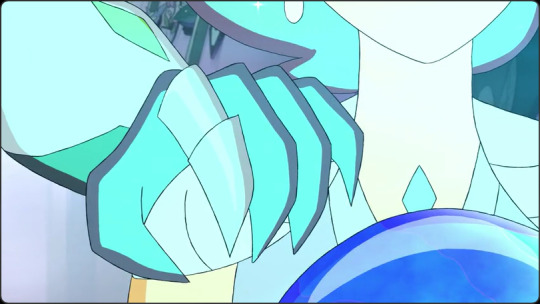
This is technically his third appearance, although it’s his second majour episode, and as such, we are still learning about him. So far, we have seen his cruelty and tactics. This man operates through restriction of free will, forcing others into actions he wishes of them. He is a con artist, a cult leader, an abuser.
Here, we see his hypocrisy. In my last post, I talked about how his antagonism reflects the themes, and I think that continues into this character trait of his.
The main question of this season is “what do you want?” Where do you want to go? What are you going to do? The characters are exercising their free will for the first time and struggling, falling on bad habits or doing nothing instead. The escape from abuse is framed as more than just physical, but psychological.
This is a season centred around motive.
As such, Horde Prime is a character who lies about his motivations at every turn.
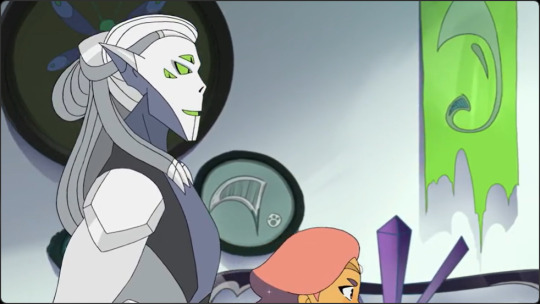
In my series on The Owl House, I discuss Belos as an obsessive, too held by his own ideas and self-importance to see his error. I think Horde Prime is similar, but with one main difference. Both have egos the size of a solar system, and both have a worldview based on self supremacy. But I don’t think Horde Prime has a motivation.
Bellos had a 42 step plan of genocide and heroism because he wanted to be the next Witch Hunter General. Horde Prime seems to want conquest only because it is fun at the time. He is a shallow person.
This stems from the difference in story. The Owl House is about Luz learning she is not the main character and so a villain who shares that flaw but can’t progress beyond it is a good way of getting that across thematically. She-Ra is about shaking off the psychological chains left by abuse. It is a more introspective and psychological story, so the villain doesn’t need to be complex. This story isn’t about him, its about the struggle to defeat something he happens to symbolize.
So, let’s take a look at some of the statements he makes during this episode.
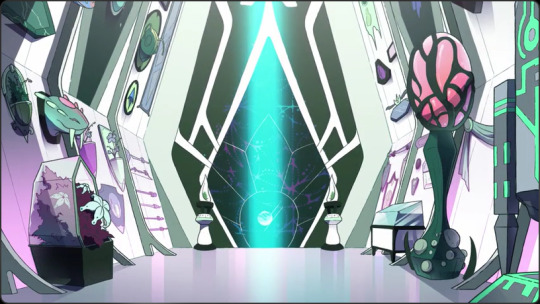
“Worlds that I brought into my eternal light.”
This one gets called out as bollocks pretty immediately by Glimmer.
Light is a fascinating way of describing death, and the idea that it can somehow be his is an insult to the many hard working Grim Reapers across the world. Horde Prime is reveling in power, showing off how well he kills people, as if destroying something is the same as owning it.
In his mind, it would seem, the two concepts are interchangeable, destruction and control. We can link this back to the idea of abuse and suggest that Horde Prime is abusive because that’s how he expresses ownership.
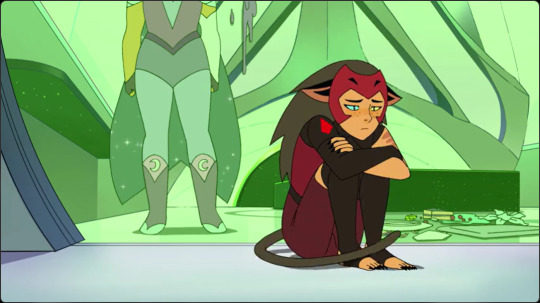
Catra had a similar mantra earlier on in the series. She wanted to be safe, and she associated control with safety and physical abuse with control.
The issue with this is that possessing something and destroying it are opposites. Not even on a moral sense, in practicality. If you have a thing and destroy that thing, you no longer have that thing. It’s gone.
Horde Prime has collected “trinkets” from places he has destroyed, so that he can have them when nobody else can. But again, there is an issue.
Artifacts are worth things to people. If the culture or the original owner give them value. If all traces of that person or culture are destroyed, historians will value the item.
But if the vast history is reduced to a “behold, my shiny thing” on your wall with nobody to see but yourself, then it loses that power.
It’s demeaning.

This is part of a recurring thing with Glimmer's response to Horde Prime. She did it with the Black Garnet in the season four finale. Glimmer lashes out at Horde Prime in an attempt to gain back her freedom, but he has put up so many shields that she can only destroy things that he has put between them. Often, those things did nothing to deserve it except be in the way. It's the cycle of abuse in action.
We see this in the real world with museums (one in particular but it is far from the only offender) keeping items it describes as loot in its accounting hidden away from their original owners. Those owners have their connection to their original culture deliberately weakened as a method of control. Or they find it insulting specifically because the items and the culture by extension are not given the respect and value they deserve. It is a psychological mode of colonialism.
Horde Prime has done this, but to himself as well as everyone else. He has taken the items from their home, denigrating their possible importance and making it to that they only signify his victory, his triumph, his possession. But he has so many that they lose that significance even to him.
Case and point, we don’t ever learn any of the names of places Horde Prime has destroyed. He doesn’t care about them, just taking their stuff. We don’t know the history of anything in this room, Horde Prime has forcibly taken that from them.
Eternal light? Bollocks.

“I take no joy in destruction. But the weeds must be burned away so that new life must flourish.”
Ok smart guy. If that’s true, why are you so cruel? If you take no joy in this, why do you do it?
Draw your mind back to when Horde Prime summoned Glimmer to meet with him. His takeover of this clone seems rather painful.
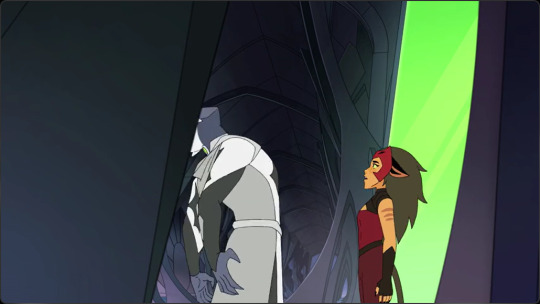
If he took no joy in destruction, why would this exist? Why would he have ostensibly invented a way of control that was this painful? Clearly he only wants to target the mind, why does he have to twist the subject to get to that?
The answer is as I mentioned earlier. He can’t separate control from destruction.

But, to take apart the metaphor, ecosystems are balanced for the most part. You don’t have to burn away the weeds in a forest for it to be beautiful. There’s nobody going around in outback Australia with a set of gardening gloves.
Invasive species are a problem, sure. But again, that’s Horde Prime. He is the outlier, the issue, the intruder. He is the colonist.
Additionally, most plants are flammable, and fire is notoriously difficult to control. If you burn away the weeds, you will burn away everything.
I live in Australia. The cycle of life here is based in a large way on fire. Certain plants have seeds that only grow after a fire, but that’s devastating to everything else, including the plants that have already sprouted. The term “trial by fire” isn’t a positive one.
Also, fun fact, we have a word in Australia for people like Horde Prime. People who take from others for the sake of it. It starts with a c.
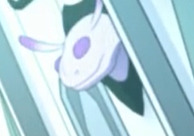
I find that people with heads on their walls tend to at least enjoy the act of obtaining them.
However, weeds aren’t necessarily invasive species. In reality, and in the way Prime meant it, weeds are wild plants that interrupt the growing of a garden. In other words, they aren’t bad, they just happen to be where you want them to be.
If you apply this to people and places, this is how things like planetary genocide happen, and it leads back to a point I have been making for five seasons. The abuse isn’t about the victim, it’s about the abuser.
Horde Prime doesn’t care about the planets he destroys, they may have angered him, but we don’t know that. All that matters is his high of control, his glory and treasure, and the fact they were there.

Hot.
“Your planet belongs to me.”
No, it doesn’t. If it did, Prime wouldn’t need Glimmer’s help.

Just a picture of the planet not belonging to Prime. Nothing to see here beside the villain being wrong.
“I am still merciful”
Prime is in a room filled with icons of planets you destroyed. How many of them surrendered? How many of them asked for his mercy?
“Those who cling to the darkness have made their choice.”
Ok. Let’s talk about light and dark symbolism.
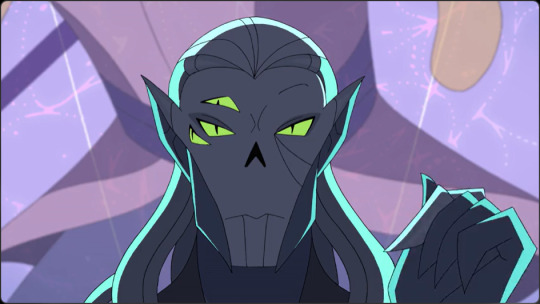
Worth pointing out that the first thing Prime does after complaining about people choosing darkness is snap his fingers, and turn off the light. Glimmer can't do that, she can only create things shat glow, Horde prime can cut things off.
Light and dark are usually synonymous with good and bad. This leads to issues of coding and problems of stereotypes that I am not entirely equipped to discuss. But broadly, this is the norm.
Horde Prime subverts this. He is identified with light and clearly the villain of the story. But he is simple in his application.
Light is only special in comparison to shadow. It reveals things and shines the brightest when there is none else around. When everything is lit up, the world seems flat.

We see this in the animation of She-Ra itself. I highlight moments that look stunning, but those that don’t usually fall short in my opinion because everything within has that same lighting. Everything feels monotonous.
Horde Prime is all light. There is no choice for anyone. You will be revealed, you cannot hide. Every wall in his ship is white or light grey, every surface bathed in that light.
Too much light is blinding.
The man forces everything to be without nuance, which is especially noticeable in a show that excels so much on writing humanity.
Or rather, it would be noticeable, if it were in any other episode.
Buckle up, I have thoughts.
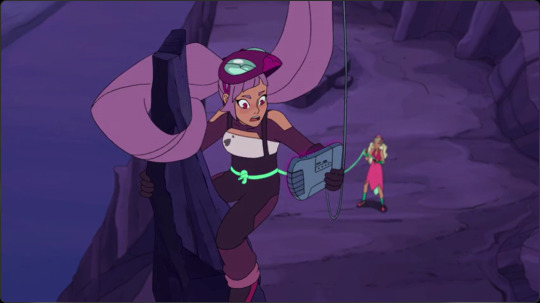
I want to preface this with something important. It is possible to dislike part of something and still like that thing overall. Not all criticism should or can be crippling.
I love She-Ra and the Princesses of Power, it is one of my favorite stories out there, and I would not have devoted this much time to discussing it if I didn’t enjoy the series or find it worthwhile.
However, I dislike this episode more than can simply be left in the Final Thoughts section. I think that it’s handling of Entrapta doesn’t work.
Entrapta is a nuanced character in this series, just like everyone else (even Frosta). She breaks the moral spectrum of the series by refusing to care about it, and rather than that leaving her as neutral, it means she is villainous in some situations and heroic in others without breaking character. She has a moral compass, it’s just different to everyone else’s.
She is also neurodivergent, and this episode tries to talk about motivation and those who hide that by leaning into the neurodivergent stereotype and pulling her really far out of character.

First, impulsiveness and lack of regard for orders and plans. We focus on how much it upsets the others, but wait a step. This is She-Ra. Everyone breaks orders, everyone does their own thing all the time. Why is it so annoying when Entrapta does it but not anyone else?
Second, the alignment issue. The complaint from the others that she built weapons to hurt them and their kingdoms. This is a good point, only slightly undercut by the fact that Scorpia is standing less than a metre from all of these people. Does she not count? Again, why is it so frustrating when Entrapta does it but not anyone else?
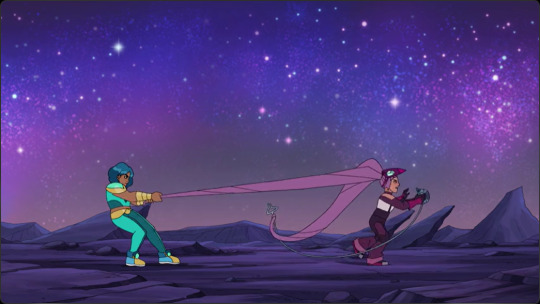
Third, the emotional disconnect. Entrapta is bad at listening and reading emotions. She is also obsessive, and doesn’t seem to care about anyone other than herself and her tech until she tells you.
On the one hand, speaking as someone who is neurodivergent, obsession is something I struggle with, and reading emotional cues is difficult.
But we have seen Entrapta misread emotions before. We have seen her responses to Catra and Scorpia before. She isn’t good with the emotional stuff, so she learns context clues. If the characters around her react in the same way to different stimuli, Entrapta will register and assume there is a similar emotion there, even when the minute details reveal otherwise. She’s not incapable, she just goes about it a different way.
She also shows her affection in a manner unique to her. It’s not that she doesn’t care, its that she expresses that care dissimilarly. For example, she gives a lot of compliments and gifts, and it takes Catra and Scorpia a while to warm up to this because that kind of thing can get unnerving if you aren’t expecting it and in a way that can be hard to grapple if you are neurodiverse.
Put a pin in that phrasing. “It can be hard.”
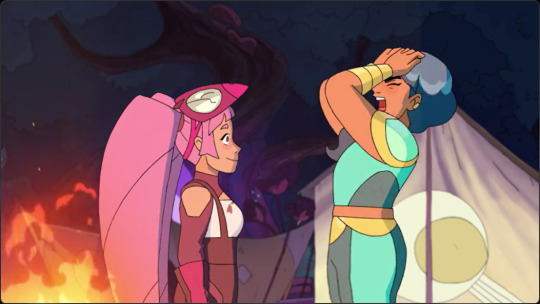
There is a difference between that and being unwilling to help Glimmer unless she can go to space. That kind of bargaining obsession isn’t a trait we have seen in Entrapta at all. She is clever and knows how to get what she wants, yes, but she very clearly does care.
Later on in the episode, we actually see this in action. During and after the confrontation, Entrapta hyper fixates on the signal in a way that is more than just the obsession with tech. She demonstrates her dimensionality by using what she knows she is good at to help her friend, and she does it in a way that fits her character. She finds a tangible thing that can help and she damn well gets that thing.
I actually like the moment where she audibly tells herself to focus. It's a character beat played for humour that doesn't demean her at all. It's a real thing that I and a few other neurodivergent people that I know do, and it is objectively quite funny.

Can you see the difference between that and “I love space”, “I would give anything to go to space” and *waits blankly because the only thing that can motivate her to do anything is the thought of going to space.*
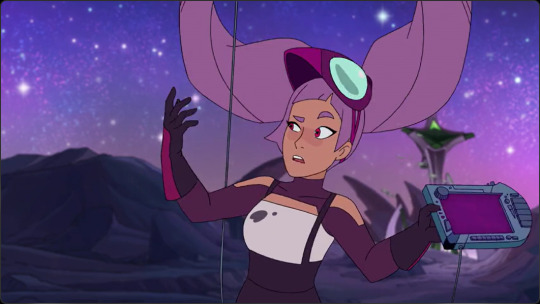
Hey look, it's the trope of "neurodivergent person talks so much jargon that nobody can understand them". Hooray. I find this trope annoying because usually the writer doesn't know that much technical Jargon, so they make the character either make up words, or say something normal and have everyone else look like an eejit. This scene does the second, Entrapta isn't saying anything other characters in this scene have already said. But also, they know her and have spent a not insignificant amount of time with her, they should be able to understand her.
The key thing here is the phrasing from earlier. “It can be hard.” Can is the operative word.
There are neurodiverse people who match the stereotype. But there are also a vast number of people who don’t.
The word is neurodiverse, it’s an out group not an in group. It isn’t a collection of people who fit a specific box that is separate from the majority of people who fit a different box. It is a plethora of different ways of operating. Diversity, not conformity.
Entrapta was that and is that for the majority of the series. She wasn’t the stereotype, she was just a person who worked differently from others. But here, she acts out of character so that a flaw she didn’t have could be used as a plot device.

This is especially frustrating because the main two who criticize Entrapta's behaviour in this way are Mermista and Perfuma, who, as I have discussed, are ALSO NEURODIVERGENT!
Perfuma shows signs of Obsessive Compulsive Disorder, and it is part of her greatest strength and greatest weakness. In other words, a pretty core part of her character. Perfuma doesn’t yield on things, she is remarkably stubborn but freaks out when people get too loud or too emotional around her in a way that I liken to an overstimulation response. She struggles with that out of the box thinking.
Mermista, on the other hand, had a whole episode about how she was tricked into giving time for a rebellion because an opportunity arose to cosplay one of her favorite book series and she couldn’t let it go. Mermista who learned to time lightning in a storm because she practiced at home.

And the pièce de résistance?
“You’re still a weirdo, but you did good today.”
Excuse me?
The compliment is a caveat to an insult, which undermines Mermista’s argument a little bit. Still odd, but welcome because she is useful?
This was not an issue Mermista had. She was already the person who would do anything for people. She was willing to work with Shadow Weaver and Entrapta and Scorpia because they were already useful and/or were part of the fold. She didn’t need this character arc.
In short, I think multiple characters act out of character and it results in the neurodivergent individual seeming like a caricature and the plot feeling contrived.

I don't have much on this scene that relates to my whole point, but don't think I missed it.
Final Thoughts
I once again feel the need to stress that I still love the series as a whole, but also that I don’t make a habit of explaining why I think things are bad. This episode needed this discussion, and needs to be treated as an outlier.
And again, it is an outlier. The characters don’t act like themselves. Entraptra is written better in the rest of the series. This episode feels out of place in a good show, which is why it stands out so much.
Next week, however, we get back to the positive, with Corridors. Stick around if that interests you.
Previous - Next
#rants#literary analysis#literature analysis#what's so special about...?#character analysis#she ra and the princesses of power#she ra#spop#spop entrapta#spop horde prime#i don't like being negative about stories#this is not an anti post#king micah is hot#this is going against my thesis that Mermista can do no wrong but since it is a one off i have decided to ignore it
17 notes
·
View notes
Text
Conversation (More Than Anything, Reprise)
One of my favourite tools as a writer is incongruence. i.e. two elements of something that contradict each other. The “x, but…”.
For example, the trope of the character with zero self-preservation instinct who keeps surviving because none of their opponents know how to counter someone with zero self-preservation instinct. On the one hand, this person is the most likely to be in danger at any given time, but that is paradoxically what keeps them alive.
Reprises in musical theatre are weirdly similar to this. They are a recurring motif to bring back elements from before. They tell you that this is still the same story, that these are still the same themes you are working with. But they also show you just how much has changed.
Let me explain.
SPOILERS AHEAD: (Hazbin Hotel)

When I covered the first rendition of this song, I framed it as a conversation that displayed changing perspectives. I want to keep that idea going here.
Most obviously, the song is literally now a conversation between Charlie and Vaggie. But it’s also in conversation with itself.
The two are presenting differing perspectives on the same idea. That being, the importance of love.
But, let’s rewind a bit.

This is a reprise of a song, and therefore it keeps the setup done there as an effective shortcut. That’s why reprised are generally so short, you have already felt emotions because of this song, the reprise just needs to remind you of that and reframe it slightly.
So, we have two people reconciling after a feud, and doing that through an affirmation that their love transcends the past.
We also have the analogy of love as inspiration. The father inspires the daughter, the partner inspires the partner.
However, it is also framed significantly differently.
When Lucifer sang, he was pessimistic and trying to persuade Charlie to stay away and stay safe. Her dreams were doomed to failure because all dreams were doomed to failure. Charlie had to change his mind.
Now Vaggie sings, and she has nothing but hope. Charlie is the one doubting her ideals and Vaggie points out that, in a very real way, Charlie has already been proven right.
The angel has been redeemed.
“And in the end, if it's only me you saved,”
Charlie has done enough; all of this is a bonus. She has already inspired at least one person; how many more are out there.
Fittingly, the instruments have been swapped.

Pianos and guitars have a wealth of symbolism attributed to them gained from their fairly ubiquitous nature in music. Generally speaking, however, they are grandeur and approachability, respectively.
Mostly, this is their scale.
If you were to see a pianist on a stage with a piano, the main thing you notice is the instrument. They are physically imposing and can fill almost any space with their density of sound. When a pianist plays, they become a vessel for the music that swells and rises and takes you by the scruff of the neck.
If you give a guitarist a microphone, maybe they can achieve a similar sense of grandeur, and electric guitars exist for a reason. But even they are small in comparison to their wielder.
Where a pianist is music incarnate, the sound of a guitar is the will of its creator made manifest. You take a guitar to a protest, you take one camping, you can’t really do that with a piano.
Put simply, guitars bring people together, pianos inspire people to be more.
Which is why I genuinely think it would be a phenomenal scene if, when they finally relent and make Mad Max 66, there is a moment where some messed up little goober stands on the back of a Ute, cracks six mismatched sets of knuckles, and proceeds to tear into an equally messed up piano. That would be awesome.

The point I was making is that there is a dichotomy between the sounds of these two instruments.
In the first rendition of More Than Anything, the backing consists mainly of a guitar playing a fairly standard rising and falling melody. Then, when the title is sung, we get a descending run played on a piano.
This aligns the two segments of the song with the two instruments and their implications. The verse and backstory are centred around connection, and the title is all about that greater philosophy of hope and inspiration. Which fits with the song. Charlie is trying to use that established love to ask for faith in her.
Later on, when Vaggie gives her take on the number, the same backing tune is now played on a piano. Vaggie is trying to raise Charlie’s hopes and get her to have faith in herself. Why? Because when the chorus rolls around, and the run comes around, this time played on a guitar.
Where previously the connection inspired the ideals, here the ideals have inspired the connection. Vaggie loves Charlie because of that hope, and she doesn’t need to try to keep achieving it to satisfy anyone because she has already succeeded, and love isn’t transactional. Vaggie loves her more than anything, and Charlie returns that affection.

Final Thoughts
This is a short post for two reasons.
One, it’s a reprise. It is short and I don’t have much more to say beyond what I have already pointed out in my other post on this song. I already have a post that discusses musical flourishes and theme.
The other reason is a critique, and it’s not actually of this song, although I think it is the reason this song falls flat for me.
Hazbin Hotel is too short. Vaggie and Charlie’s breakup lasts for barely an episode, and that guts this song because the song is so clearly banking on being payoff for something that didn’t have time to get set up.
Which is a shame, because the song isn’t bad. It’s perfectly serviceable and genuinely quite moving, but it could have been one of the best in the musical without a single change, if it had had one more episode before it.
Once again, however, this is not a fault that falls to the writers and directors. This is a problem with management only allowing for eight episodes in a story that needed more.
There are criticisms of this show that can be levied at the creators. I dislike some of the character designs, for example, and I think a lot of the edititing of individual scenes and shots is so snappy it borders on claustrophobic. But the pacing is an issue with a clear cause and effect, and it doesn’t just affect Hazbin Hotel, nor is it confined to Amazon.
We have seen this play havoc with modern television. People aren’t having time to sit down and enjoy a show. Star Wars: Skeleton Crew is the only series I can think of that has made the most of this, and that’s because the format suited the story. As a result, people are less inclined to start watching something they are afraid might get cancelled early or won’t have time to get attached to. Art needs to be treated as individual pieces, not homogenized to fit a format.
So, to any executives and higher-ups who may be reading this, two things:
One, why are you on Tumblr? This site is an asylum run by its inmates and respectfully, you aren’t welcome.
Two, your job is to make money, and in case you weren't aware, art is the most profitable for you when you stop treating it like a product.
You are sabotaging your own success by kneecapping your projects because it is apparently more cost effective in the short term. This is a false promise, a mirage conjured up by your cursed treasure and empty conquest. You are not just callous; you are bad at your jobs.
Next week, I will be discussing the finale of this show and those damn chords. Stick around if that interests you.
Previous - Next
#rants#literary analysis#literature analysis#what's so special about...?#hazbin hotel#hazbinhotel#hotel hazbin#hazbin#eight episodes is not enough
8 notes
·
View notes
Note
A few of your Hazbin Hotel posts are missing the #hazbin hotel tag: Hell's Greatest Dad, More Than Anything, and Out For Love
Thank you for alerting me. I believe I have fixed that now.
2 notes
·
View notes
Text
Father, Help (Thanks To Them)
Context is everything. In the case of Thanks To Them and more broadly the third season of The Owl House as a whole, this is the production history.
Put simply, there was a third season, then there wasn’t, then there was again but under the proviso that there was less of it. As a result, thanks to them is fourty four minutes long and contains enough material for about four hours of story. This is a dense episode of television. A mini picture in its own right.
Which adds a bit of complexity to my blog. I take things one episode at a time and have strategically chosen series with short episodes because my feeble ADHD mind is equivalent to a Tuna with a ball of string in everything but name. So, this post is going to be in three sections, because there is a lot to talk about.
Let me explain.
SPOILERS AHEAD: (The Owl House, Jurassic World: Camp Cretaceous, Critical Role: Campaign 2, The Odyssey)
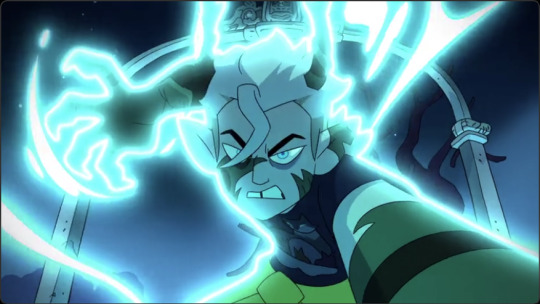
Part 1: "Within every man and woman a secret is hidden, and as a photographer, it is my task to reveal it if I can."
Thanks To Them was released more than two years ago, and in that time, one element has stuck with me more than any other. Not something substantial or moralistic or showstopping. A single element that confused me. Willow’s Camera.
You would think that this is an insignificant little detail, but this episode doesn’t have those. Luz schoolbook is the Odyssey, the Giraffes are exiles, Cosmic frontier is used as a metaphor so blatant the characters within pick up on it. Everything in this episode has at least symbolic relevance to the story at hand or is a callback to previous moments. Everything, except the camera.

If you squint, the camera might be a reference to Understanding Willow, but as I discussed in my post about that episode, that isn’t about Willow, it’s about Amity and her guilt. The photographic memories don’t come up again in relation to these two, and this version of that metaphor doesn’t directly interact with Amity at all.
Nonetheless, it’s a good place to start.
That episode establishes a clear metaphor for the photograph. Memory. As such, the imagery can be examined here through the same framework.
I think it is crucial to start at the beginning, the first photograph that Willow takes.
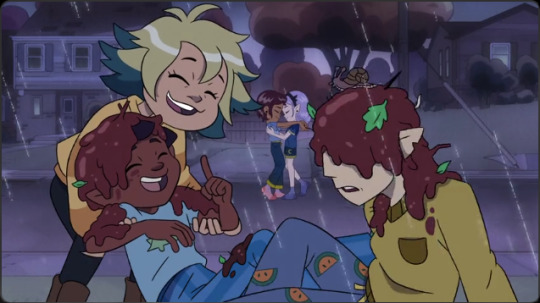
Joy and love in the face of hopelessness. Absurdity, comradery, companionship.
It’s a tender moment. The abrasively upbeat intro music dials back for a second to show the rain. Simple to us, but in the boiling isles, rain is terrifying. The rules are different here, and our characters are showing joy in the moment. Not everything here is trying to kill them, not everything here is antagonistic, and if you don’t celebrate the little moments of good, you will only remember the bad. Hope keeps you going, light do not faulter.
This isn’t the first time photographs have been shown in this episode, it’s just the first time that Willow has taken them. If we look back a few moments, we see Luz’ coming out presentation, and we see this:

Again, joy and friendship and love. The photographs ground our characters and keep them moored in reality.
That’s why the intro cinematic is so janky. It doesn’t fit with the tone because life goes on anyway. You aren’t going to get anywhere sitting on your laurels. You have to look on the bright side. Sometimes that is the simple joys of companionship and laughter, sometimes that is the spark that will get you home. Both have their place.
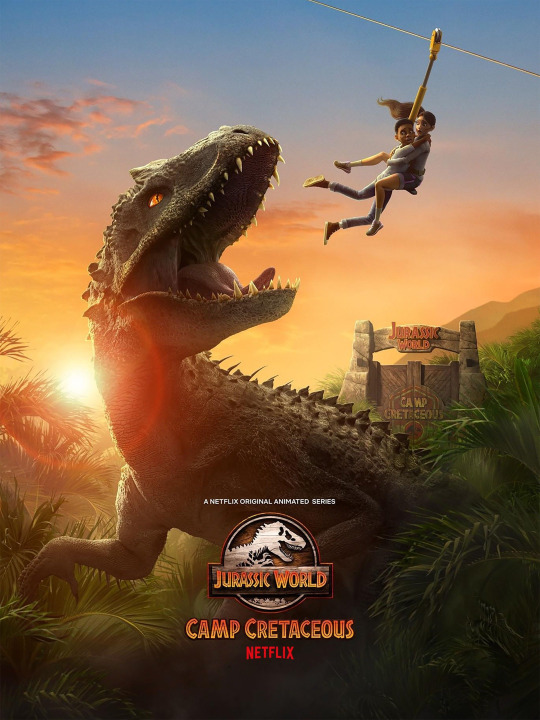
Jurassic World: Camp Cretaceous is a series that I love and the next on the chopping block when I finish The Owl House. It is a series that thrives on dissonance, and part of that is its tone. JWCC operates on a sliding scale of humour and drama, and other than the first episode, never misses out on either. It is a series about balance, hope, and human horror.
The reason I bring it up, is because during the last episode of season three, the characters reminisce about times gone by, and one of them does this:
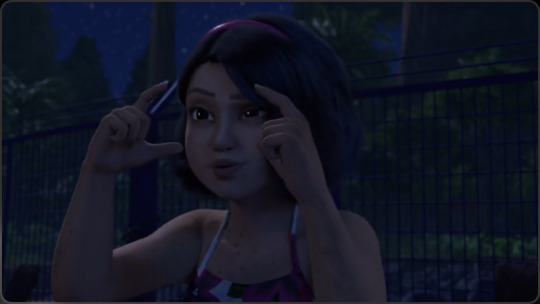
“Now smile, you two!”
This is Sammy, a character who exists to tacitly disprove every single statement any bad guy makes. She doesn’t mess with philosophy personally, but she is undoubtedly the heart of the group. Both emotional and moral.
Sammy has also had possibly the worst time of the main cast. The argument could be made for Yaz, but Sammy got blackmailed, shot at, bitten and stung more than anyone else in the series, and was mortally wounded four episodes prior to this scene. But when she is taking photographs, she remains upbeat.
“Do you really want my mental picture of this place to have you with your eyes closed?”
Treasure the good times, especially when they are dwindling.
Light, do not faulter.
I started this section with a quote from Yousuf Karsh, who, as implied by said quote, was a photographer. Born 1908 in what would become Turkey, he immigrated to Syria and then Canada. I guarantee you that you have seen at least one of his works before.

This is Yousuf Karsh. Or more accurately, a photograph taken by Yousuf Karsh of Albert Einstein, and I want you to take note of the defining characteristic of this piece.
Light.
Yousuf Karsh’s understanding of light was incredible. He used it to guide the eye and reveal, but he also used it for detail. In monochrome, the only contrast is between different shades. Everything is affected by the light, it controls how you see the image.
But the darkness, that was key. Darkness exists as contrast. For the light to be special, it must have something to be shined upon.
“Character, like a photograph, develops in darkness.”
But there is something else. Photographs are a history. They say that we are here, they provide evidence.
In the context of The Owl House, which was cancelled for (in my opinion) suspicious reasons, this is evidence of queer folk. We have always been here and are here, even when people try to pretend we are a fad or a social experiment. We are history, and history is still happening.
Yousef Karsh died in 2002.
Shrek and Monsters, Inc. both came out in 2001. Yousef Karsh and Mike Wazowski existed at the same time.
This man photographed Winston Churchill, Ernest Hemmingway, Martin Luther King Jr, Marian Anderson, and George Bernard Shaw, amongst many others. All of whom shaped modern life but are icons of history gone by. The eyes that shone a light on them were still seeing that light in 2002.
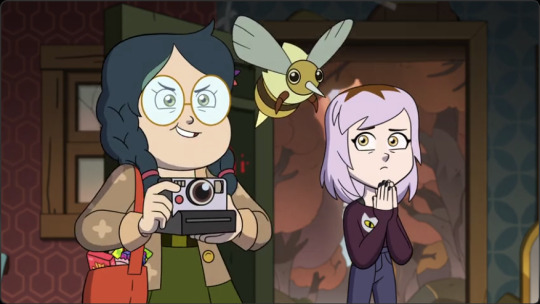
Willow’s photography exists to show that life kept moving, and continued to do so. But it shows what she chose to remember. Small moments of joy and light.
Light, do not faulter.
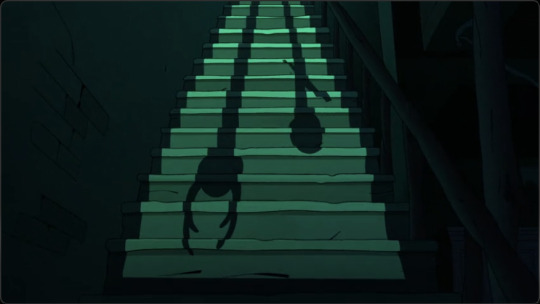
Part 2: “It is a unique and exquisite complication, family.”
Thanks to Them doesn’t start with Thanks To Them. It starts with the end of King’s Tide.
Those opening shots are mostly a replica of the final moments of the previous season. We miss the zoom out to the rain and Luz opening and reopening the door, but other than that, these are those shots.
The first piece of new story that we get in season three of The Owl House is this:
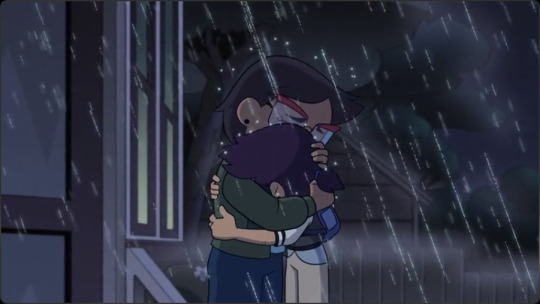
I would like to use this to frame a conversation about family as it is presented in this series.
Not every story has a moral, and that isn’t a bad thing, but The Owl House does have a thing or two to say about what makes a good family unit. In this context, good family is defined by acceptance, bad is control. Empathy is paramount.
For example, Camilla’s first response upon her daughter’s return isn’t victorious or reprimanding, there aren’t any thoughts about what will happen next, it is immediate “my child is in pain, I must do something about that.” There’s that empathy.
Acceptance is letting people be who they are, control is the opposite of that. But this isn’t a binary, and Camilla spends this episode and the series at large moving along the spectrum.

Camilla’s first response to the kids is to seek understanding, and it’s clear that she is always far from her comfort zone in this episode. Her response to Bellos is bafflement, she reacts to the summary of the previous season with the exact same energy as anyone having a show explained to them, and she has a clearly overstuffed book explaining how to keep track of the kids.
I will get back to that book.
But she was introduced in season one as a controlling figure. She was the antagonistic parent who inadvertently kickstarted the series. Summer camp.
Not counting Grom, because that was Luz’ fear, Camilla’s next appearance was in season two, when she evolved significantly as a character.
I wrote a post on that episode, and in it I mentioned the dichotomy of this character. She was someone who was fundamentally kind and accepting, but who was antagonistic to Luz because of the perceived lack of that kindness.
Camilla also inspired in Luz’ guilt character development in the previous season. She begged Luz to stay back because she blamed herself for sending Luz away. Although, looking closely, Luz’ memory of that is faulty.
Nevertheless, Camilla controls Luz, intentionally or not, and that control has a negative impact on her.
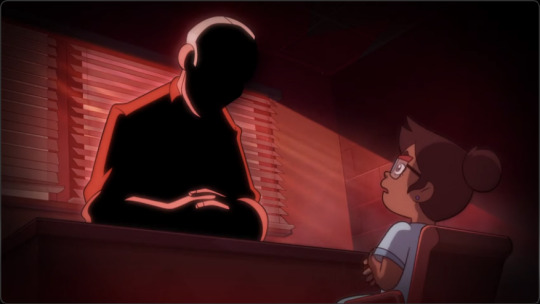
Then we get the dream, which establishes Camilla’s angle, and it’s the same as her emotion now. Uncertainty.
Camilla was out of her depth, so she made decisions based off advice she was given by people who refused to understand. She has seen the consequences of that, so she changed. She learned.
Knowledge and ignorance are another key theme in the series. Camilla plays into that here.
Interestingly, this is where she contrasts with Eda. Both are maternal figures for kids from a different world. But Eda’s journey was a downward spiral brought about by the stress of the end of the world. Her strategy for finding food for Luz was sticking with what she knew, Camilla has evidently been experimenting and learning, as shown by the number of notes in the book.
Eda wilfully stayed with what she thought she knew out of a desire for safety. Camilla sought to understand fully.
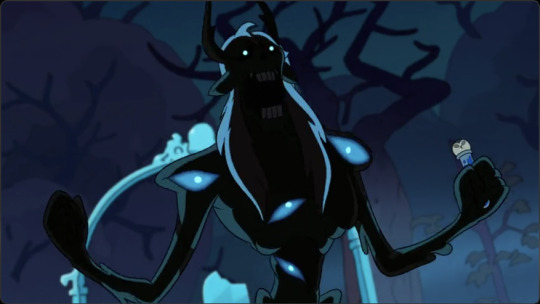
Pictured here, a man who believes he can do no wrong because he is human. Look at the eyes though. He has so many eyes, but he can't see what is directly in front of him. He cannot see that he is wrong.
Contrast Camilla with the two main negative parental figures in the series, Odalia and Bellos.
Odalia isn’t in this episode, so I won’t dwell on her too much. But her main motif in the show is a desire to control and command her children and husband. She wants to be in charge and is used to power, so she limits Amity’s choices down to those she may spend time with.
Symbolically, this is expressed through Amity’s choice of hair colour and the fact that Odalia has such a large say in this.
In addition, Alador’s path to redemption starts not just when he stops being complicit in Odalia’s behaviour, but when he starts making an effort to understand and empathise with his daughter.

Bellos on the other hand, possesses his child.
For all intents and purposes, Bellos is Hunter’s parental figure. They have a familial relationship that is nominally uncle and nephew but gets more complicated when you factor in Grimwalkers and generations thereof. So, for the sake of argument, Bellos is Hunter’s parent.
I don’t believe it is controversial, however, to say that Bellos is a pretty awful parental figure. He is blatantly cruel and manipulative. He’s also just bad at it in relation to competence.
The control thing is obvious. He literally possesses his child, taking their body and using it as a tool. He literally overrides Hunter’s freedom over his own actions and changes the boys’ appearance to do so.

“You know what I'd like, Belos? I'd like to leave the Emperor's Coven and never step foot in that throne room again. I'd like to study wild magic, and learn how to carve palismen. I'd like to attend Hexside as a regular student and play flyer derby with my friends. But most of all, I'd like to make sure you never hurt anyone again!”
There are three things to note here.
First, Hunter expresses his rebellion against Bellos by asserting his will. He is expressing that he is, in fact, a person.
Bellos exists on dehumanisation; his power is a claim that free-will doesn’t exist. Hunter’s way of breaking free from this is simply pointing out that free will does exist. Absolute statements crumble with a single outlier.
Which is another theme of the series, the dichotomy of nuance and simplicity. Bellos represents simplicity, Luz is the personification of nuance. I will come back to this.
Second, this is a weirdly soldierlike way of dealing with the problem. Even weirder, it evokes fairytale and mythological imagery.
“I miss knowing who I’m supposed to be.”
Hunter is a character who is almost always scared out of his wits, but he is an impeccable tool in Bellos’ arsenal because of his ability to focus. Repeatedly, when Hunter is given a single objective, he blocks out any fear and gets that objective done. He is efficient, and competent, when he knows what he is doing.
Eclipse Lake and Hollow Mind show Hunter at his frailest because he doesn’t know what he is supposed to be doing. He has relied upon others telling him what to do for so long, that an unclear objective leaves him floundering.
But in both cases, he shows his own resourcefulness and strategy for adapting. He finds a small-scale objective. He is struggling to win the favour of the Emperor, so he finds a thing that the Emperor needs and objectively clears every obstacle through guile or brute force to claim that. He goes on the run from the Emperor and is shown to have turned that focus to surviving and finding food in Labyrinth Runners.
In Thanks To Them, Hunter reutilises that strategy. He decides upon a goal and shuts out everything else. He finds his coping mechanism and weaponises it. He wants to stop Bellos from hurting people, so he removes Bellos’ goal from the equation. It is that drive that frees him.
But, who gave Hunter the skillset to accomplish this feat? Who trained the child as a soldier? Who taught him to shut out the fear?
Bellos. The Emperor created his own weakness.
In world Mythology, this is a common trope. King (or parent of some kind) hears prophecy of doom surrounding his close relative and, in his attempts to avoid said prophecy, accidentally gives the relative the exact skillset and motivation to defeat him.
Here, that descendant is Hunter, who is a clone. Every clone before Hunter has rebelled against Bellos, but he keeps going because… maybe this one will be different? Like I said, Bellos ain’t good at this.
Bellos created someone he knew would one day rebel, then gave that person the exact skillset necessary to subvert his magic. Then he abused the kid and forced him to try and escape.
Although, there is a cruel twist to the formula. Bellos, when he realises that Hunter is winning, decides to take the both out together. He won’t let Hunter escape, even when he does. It is cruelty, and it’s needless.
Bellos has shown that he is cunning. He could have tricked Hunter into opening the portal or he could have WAITED FIVE MINUTES FOR LUZ AND CO TO DO IT FOR HIM.
But no. Once again, Bellos chose to be cruel, and it nearly got him killed.
Nearly.

The third element of this sequence is how quickly Camilla reacts, and how similar that reaction is to Hunter's. She has been out of her depth, but she sees something she can do, and she dives in. Camilla doesn’t understand magic, but she understands drowning and how to save a kid from that.
Bellos tries to kill Hunter, and Camilla stops that. The good parent prevails.
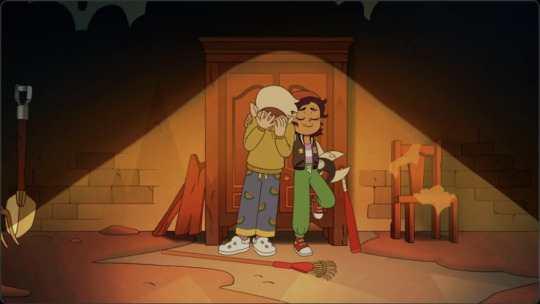
But family isn’t just about parents and children. Hunter has a found family in Flapjack, who also sacrifices himself for the boy, as well as in Luz and co.
“Gonna make sure you're safe too, Hunter. You're family now.”
I want to point out that, as I have stated, Hunter’s confidence doesn’t come from the mask, it comes from having a clear task ahead of him.
More importantly, however, is the fact that this scene breaks him. Family looks after each other, and Hunter is receiving that love and compassion and understanding from those in the Hex Squad.
He has a kindred soul with Gus, he has a sibling dynamic with Luz, and he has the romantic connection to Willow. He has people who show him empathy, and behind an expressionless mask, we see him cry.
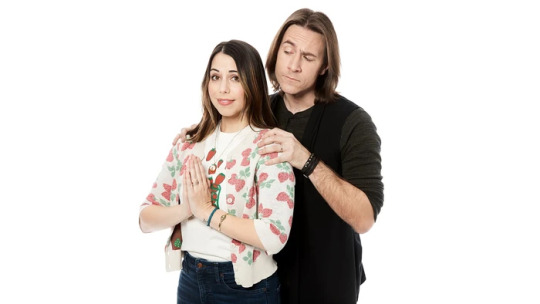
The title of this section comes from the second campaign of Critical Role. Specifically, the episode entitled The Threads Converge.
The episode builds up to a meeting between one of the protagonists, Jester, and her mysterious father figure, known as the Gentleman.
To be clear, the two have met prior, but have been unaware of their connection. Then the information was made available to both of them, and tension ensues.
Jester runs the situation through with her friends repeatedly, scenario after scenario, unsatisfied with all of them, while the Gentleman avoids the subject entirely.
Until who should step up to the plate but Caduceus Clay, humble cleric and wise man.
“My family had to... I don't know where they are, and I don't know if they're okay, and it's been a long time, and there is a part of me that is very lonely.”
You won’t always have your family. So, treasure them while you have them.
The conversation revolves around a rare tea only found in one place. It’s delightful and a thing to share with people, and the only place it can be found is the Blooming Grove.
On the one hand, the Blooming Grove is a graveyard, and the tea comes from flowers on those graves, perhaps hinting at hindsight as a blessing and a curse.
On the other hand, the rarest of tea comes from a place Caduceus calls home. It comes from the symbol of his family, and they have run out, maybe soon, so too will the tea.
Again, treasure your family.
In The Owl House, family is explicitly not a guarantee. The Hex Squad is trying to get home, but they don’t know if they will. But also, they don’t know if there will be a way to keep getting through. Either Luz will have to say goodbye to them, or to Camilla.

Part 3: “My Name Is Nobody”
The book that Luz is reading in school is The Odyssey, and it is important to me that she misses the point entirely. Yes, yes, it’s technically called The Plight of the Mariner. But come on. It’s The Odyssey.
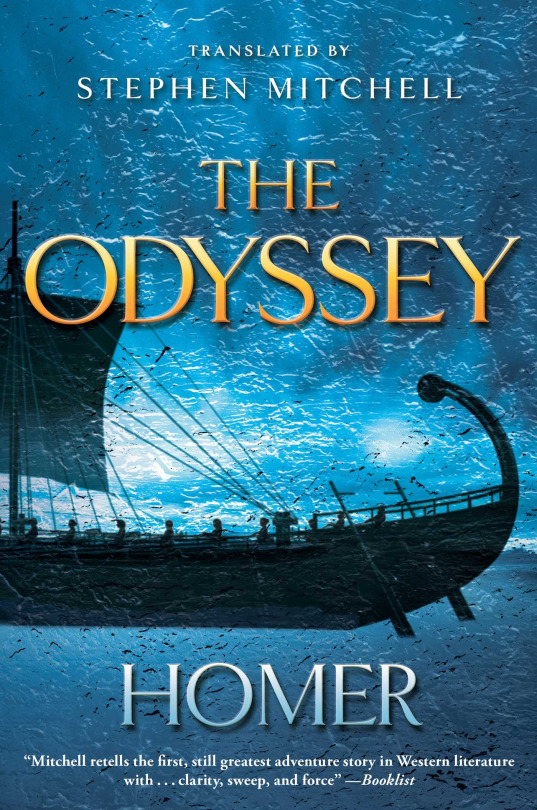
The Odyssey is the journey of an eejit who is the smartest man in Ancient Greece by process of elimination. I say the smartest “man” because there are women in the story who I would argue are more intelligent than him, and there aren’t any non-binary friends in the book to my knowledge.
Nevertheless, Odysseus is a trickster trying to get home after he made the brilliant decision to directly annoy the god of the sea while firmly in that gods domain, dooming him to arrive ten years late.
The point I am making is that Odysseus is a betrayer who makes mistakes constantly and yet is still able to come home. He is a doofus, but he learns, and he evolves, and he finds a way to succeed.

Luz’s reading of the story is a little different.
“Who cares about the ripple effects? He was just a pawn in someone else’s game. And he was never smart enough to realise it. If his friends and family knew about his mission, they’d know that their lives would have never been in danger if it weren’t for him. They should hate his guts, and it would have been better if he literally never existed!”
Clearly, The Plight of the Mariner is slightly different to the Odyssey. The Odyssey doesn’t have a clear mission given by an external force. But it does have a few other things.

I find it very funny that the chalkboard has the themes of the story written on it. “Fate vs free will. The _ of the hero”. I know authors who use subtext, and they are all cowards.
Interestingly, the blank left by the teacher’s head. It’s a pretty key part of the sentence. The something of a hero. The peril? The destiny? The choice? The path? All different meanings of the book.
Which leads to the open ended nature of Luz’ story here in her mind. There is a dichotomy of free will and fate, and she has been conned, but the meaning is clear. The teacher has written up the thesis for everyone to see.
Luz is just obscured by where she is sitting. Her view of the theme is changed by her perspective.
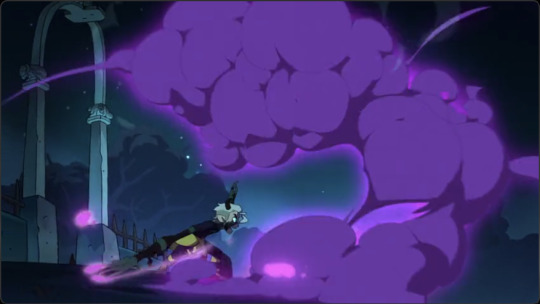
This part of The Owl House is the most traditional when it comes to storytelling. It is the darkest hour, so it leans really hard into the depressive feeling.
A large part of The Owl House is that sense of freedom and expression. It deals with archetypal storytelling through subversion. Wizarding school? Witch school. Rival? Love interest. Protagonist? Bisexual.
I have stated before that every character has an analogue in the Harold Potts books. Willow is the troubled student and friend who specialises in plant magic, Eda is the mentour inflicted with therianthropy, etc. The only character who doesn’t have an analogue is Luz.
Luz is fundamentally her own person, that is her greatest strength. She is someone who cannot easily be defined.
So, in her darkest hour, Luz becomes like everybody else. She even wears a costume that literally dresses her up as another person. She leans into the depression, she gets all sullen and declares that she knows what must be done before the scene cuts away. These are stereotypical darkest hour beats, and they are being played straight. It’s jarring. We have seen this story before.
Luz feels like she is a traitor. She helped Bellos, she was conned, she got manipulated. It is her fault for being weak. Bellos does his best to reenforce this when he confronts her at the end of the episode.
“See, this is why you're so useful, Luz. You're so desperate to help people, you even helped me meet the Collector.”
I want to stress something. Being kind is not a flaw. Luz got conned, the emphasis is on the got. Someone conned her. Someone manipulated her. Someone very specific.
Bellos is deflecting the blame here, and we have seen him do this before with significant success in Eda.
Eda blamed herself for getting cursed and getting captured and exiled, instead of the people who cursed her and captured her and exiled her. It is a shifting of the blame from the abuser to the victim. How dare you stand where I was swinging my fist.
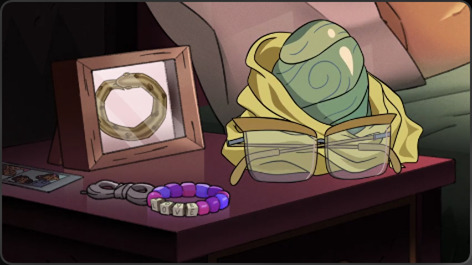
Camilla kept the snakeskin, specifically storying it in the form of an ouroboros. Symbolically, this is rebirth and renewal, which corresponds with Luz' take on the conversation.
“Mom, why aren’t you mad at me?” “Oh baby. Come here. I’ve been terrified, sure. But believe it or not, I do understand what it’s like to want to run away.” “I’m so sorry.” “But the point is, you came home, and everything is okay now.” “But it’s not. It’s my fault that everyone’s trapped here. And I don’t even know if King and Eda are okay. I wanted you to meet them so bad. But I keep messing up.” “Hey, everyone makes mistakes. What matters is that you learn from them.”
Luz misinterprets this conversation as well, taking the “learn from mistakes” to mean “stop trying”, which is not at all what Camilla was saying.
But also… you don’t think there was anyone else more responsible than you for what happened? Not one person who’s direct fault it might be for everyone getting trapped in the human realm?
Bellos is right there, girl, you can just point at him.
There’s a distinct sense of powerlessness on display here. Bellos has convinced everyone that they are responsible for their own hardship and that nothing they can do will escape that. But he is wrong, and not to be trusted.
Odysseus gets home.

Luz can find a way to get back to the Boiling Isles, and her friends are finding that as we speak. Willow has been taking photographs of all the happy moments, but Luz is too worried about what they might say when they find out she got tricked.
“I couldn't hate you, Luz. The fact that you still stand up for us means enough to me.”
Amity doesn’t care. Love prevails. She brings a different perspective to Luz’ mental block and helps find a way round.
But it is Hunter who returns the favour. Luz saved him, so he points out what I have been saying this entire time.
“You were tricked. That's what Belos does. He tricks people. But if it weren't you, it would have been someone else, and then there'd be no one left to fight back. So let's do that. Let's fight back. Please? For Flapjack?”
There is hope. It is feint, but it is there and will always be so. It is in the very fact that time keeps moving on. Luz is still here, look on the bright side. Think positive thoughts. Grit your teeth and keep going.
Light, do not faulter.

Final Thoughts
To pull back the screen here, I usually take two days to write a post. I set out time a week in advance so I have a buffer surrounding my work and ADHD, but overall, two days is enough.
I started writing this post a week before it went up, and as I write this, it will go live in just under eleven hours. I am yet to put in pictures.
I have so many thoughts about the final season of The Owl House, and especially Thanks To Them, but I think my next posts are going to be even longer than this one.
Specifically, because my next post, that of For the Future isn’t going to be analysis per say. Stick around if that interests you.
Previous - Next
#rants#literary analysis#literature analysis#what's so special about...?#character analysis#the owl house#toh#meta#toh luz#hunter toh#luz noceda#toh hunter#toh camila#jurassic world camp cretaceous#jwcc#jwcc sammy#Yousuf Karsh#critical role#critical role jester#critical role the gentleman#critical role caduceus clay#jester lavorre#caduceus clay#cr caduceus#cr jester#cr the gentleman#the odyssey#long post#holy moly this is a long post#light do not faulter
29 notes
·
View notes
Text
Where Do We Go Now? (Horde Prime)
The fifth season of She-Ra and the Princesses of Power begins on a pretty dire note. I’m not going to spoil the series in this introduction, so go watch the show if you don’t know what I mean, but suffice to say that this isn’t the best of circumstances.
Except, it’s not actually the worst of circumstances either. Things are bad, don’t get me wrong, but if you are really obtuse, you can see a balance emerge here, and I am nothing if not obtuse.
Let me explain.
Spoilers Ahead: (She-Ra and the Princesses of Power, Star Wars Skeleton Crew)

She-Ra is a story about escaping the cycle of abuse, most clearly exemplified by the horde, but also through Light Hope and Shadow Weaver. From a certain point of view, season five opens with that being accomplished.
Catra is on the other side of the galaxy to Shadow Weaver. She has lost that power that corrupted her, and she has a nominal friend in Glimmer.
For all intents and purposes, the Horde has been defeated. Hordak is no more, and this new enemy is so aesthetically and practically different from its predecessor that it doesn’t feel like the same thing at all.
Light Hope has been set free, She Ra no longer inhibits Adora or acts to control her, and she is showing incredible combat skill without it.
Those are the stated goals of the series and the thematic endpoints of every idea that the series was building up towards.

If it wasn’t for Horde Prime, the series could have ended with the last season and been genuinely quite satisfying. The characters claw their way out of the tragedy, Glimmer was tragically lost, Catra couldn’t be saved.
Instead, the series kept on going and scaled itself up a bit. We suddenly see the full scope of everything, and despite their escape, our characters are still barreling towards tragedy. Breaking free didn’t matter, or at least wasn’t everything.

I think that every season in this show has a different thematic angle to be read through. A different question to ask.
Season one, for example, asked “how do relationships change?” As such, the season spent a lot of time developing the history of Shadow Weaver and Micah, as well as the fall of Entrapta and of course the focus on Adora and Catra. But it also showed the gaining alliance of the Rebels in the context of the previous fall.

In contrast, season four asked “what about everyone else?”
That’s why I pointedly avoided discussing Catra and Adora in detail. The season was about Glimmer and Light Hope and Perfuma and Scorpia. It was about everyone who was tangentially related to the main story but was being broken down because of it. Season four was a season concerned with collateral damage.
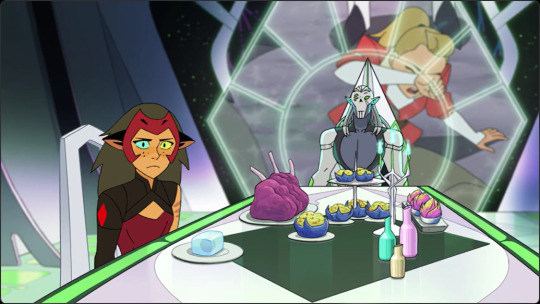
Which brings us to season five, and to the question: “where do we go now?”
The events I mentioned at the start of this are only positive from a certain point of view. To everyone else they are either negative or simply different. Everything is up in the air, everything has changed.
Last season, the show wrapped up, and now we are on a different story entirely. We are in a different place in the galaxy, the villain is different in every way imaginable. We have a different arrangement of characters. We have a different genre aesthetic, moving from quirky fantasy to full science fiction
My reading of this season is that it is the hardest step of removing oneself from the cycle of abuse: deprogramming.

The new Horde is aesthetically a modern or psuedo-modern cult, and the verb for breaking free from that is "deprogramming".
This is a story about what happens after someone escapes from that cycle of abuse in the physical sense, and suddenly has to resolve how they act. These are new situations that provide the characters with an opportunity to be whatever they want, and this is the story of those characters making those choices.
Put simply: “What do you want?”
Catra and Adora come into centre stage with mirrors of each other, specifically through their echoes of their previous deeds.
Both react to this new circumstance through changing next to nothing about themselves. They are on the path to redemption, sure, but neither seems to acknowledge that this is a wholly different situation.

“The Horde's the Horde, even in space. As long as I'm of value to Horde Prime, I've got a place in this world. I can work my way up here, just like I did before.”
This gets pointed out in the story as an insane thing to say. But it highlights Catra’s mindset in a concise way to remind the audience and explain her to new viewers.
Catra’s life has been ruined by her desperation for power. She wants to be safe, but instead of seeking that out, she takes the feeling of safety instead, and she does that through clinging to power. I will stress that safety and the emotions associated with it are different things, and Catra’s actions are more in line with an addict looking for one more hit of that dopamine gained from feeling secure.
If she wanted to actually be safe, she would have left the Horde way back in episode two. But if all characters always did the logical thing, then the story wouldn't exist. This isn't a plot hole, it's a character beat.
The key here, as gets stated by Glimmer, is that the feeling of safety is hollow. That ignorance is going to get Catra killed or worse.
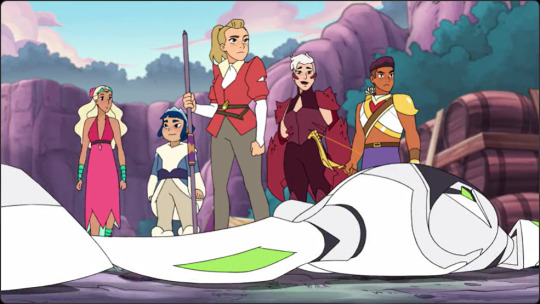
Adora weilds a staff in this episode, which has two meanings. One, it's about as far from a sword in how it's used as possible. At least, far from a longsword like that of She-Ra, greatswords are a bit different. It's a different fighting style that has different strengths and weaknesses. But also, we've seen Adora wield a staff before. In episode one. When she was with the Horde.
Similarly, Adora is wrestling with the fallout of no-longer being She-Ra by falling further into her hero complex. She has to save everyone and will burn herself down to feel any warmth. She doesn’t sleep, and devotes herself to duty to take her mind off the situation.
The lesson she learns is that she is not alone, but there’s something else, and it’s the really small moment of the kid with the doll.

The child is obviously enamoured with Adora, and they carry the doll of She-Ra because to them, the two people are one and the same. To them, Adora hasn’t lost anything. To them, that admiration hasn’t gone anywhere.
I will remind you of what we know about She-Ra. Most recently, the First Ones claimed that they chose Etheria because it had She-Ra. But earlier on in the series, Madam Razz said this:
“She-Ra was here long before your people arrived.”
Adora never heard this, as it was spoken to Mara, but the point stands for the audience. Adora hasn’t lost She-Ra, she has shaken off the thing that controlled that part of her life. Now she needs to learn to do it a different way.

In other words, she needs to relearn how she interacts with the world. She needs to deprogram herself of everything the First Ones and the Horde taught her.
Speaking of deprogramming, this episode is named for it’s villain, and there’s something important to discuss about that.
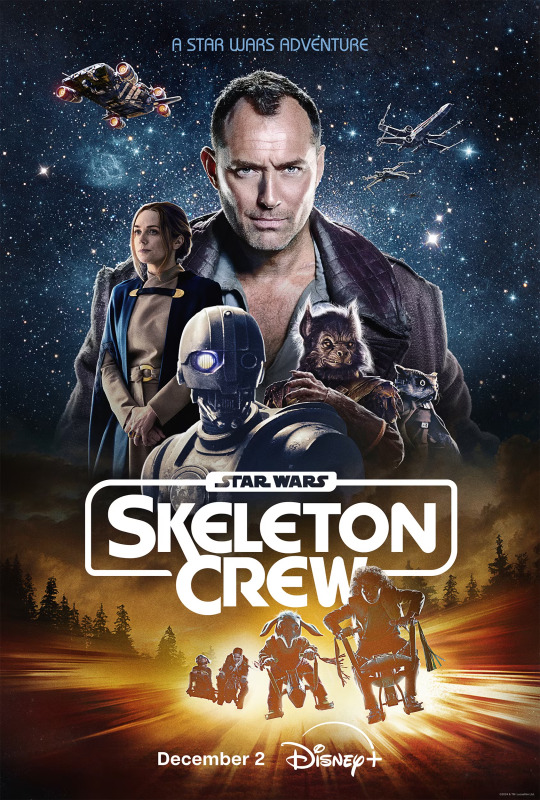
Star Wars: Skeleton Crew is a series about growing up and leaving your bubble. It is about preconceptions and imagination. It is about change.
Part of how it explores this theme is the villain, Jod Na Nawood.
Jod is introduced as a heroic mentour in the first cliff hanger of the episode. But for the rest of the series until his true motivations are revealed, he is the most obviously suspicious character in the series. To the point where the kids notice.

There is a consistent thing with blue and red lighting in this series, in that everything keeps trying to shoot Jod in blue, but he keeps changing the scene or moving towards the red. For someone who's entire thing is helplessness and forced evil, he certainly makes a lot of bad decisions. Put simply, he is telling you the world is awful while actively removing any good in it. It's the childish excuse: "It's not my fault, it was like this when I found it." No. No it was not.
Obviously, this plays into that idea of not reading a book by its cover. But this is a character who keeps coming up with names and monikers, and who wears a mask at every opportunity. There is more to this man yet.
Then we get the final episode, and we get his backstory, and remarkably, he is wrong about everything.
He claims the galaxy is cruel and uncaring and that there are “a few pinpricks of light”, and yet everyone in the show has been kind to him except the people he actively did harm to. He caused his own misfortune, and people are still kind to him. The kids break him out of jail, their parents save them even at great personal cost. Jod Na Nawood is wrong, and the series ends by flooding him with light just to get the message across.
This is not a morally grey character. This is a villain with a cohesive backstory. Nuance and moral greyness are not the same thing.

But here’s the key thing, Jod is a child who never grew up. He is forever trapped in a moment that the Galaxy isn’t anymore. He says the world is awful and then takes steps to make it worse, and that final shot of his defeat makes it abundantly clear.
Jude Law is hot, but he’s also an incredible actor. If you combine that with good cinematography, you get a moment where the camera looks directly at him as the light illuminates his expression, leaving nowhere to hide, and he looks like a scared child recovering from a tantrum. He looks about to cry. He looks like he's about to say "it's not fair".

There's something to be said for the simplicity of Jod's design in comparison to the rest of Star Wars. Jaba is a slug gangster, Darth Vader has the hat and the cape, and Jod has the helmet. But when you take that away, which the show keeps doing, he's just some guy. He wears clothes that are slightly too big for him, and he has a big ol' gap over his chest. He's vulnerable.
Jod is not good at scheming, he got defeated by children. He’s not particularly charismatic, he lost his crew repeatedly. He’s not a good leader, see my previous point. He’s a traumatised child who refused to grow beyond that.
In that sense, he is a thematic opposite to the main characters. They represent hope (a new hope, you might say), and he represents stagnation. The series asks which idea will prevail, and Jod’s does not.

In She-Ra, the villain is Horde prime, who acts as the symbol of isolation and lack of agency.
Everyone around him is a vessel for his will. He is another version of Shadow Weaver turning her victims into another version of herself. Horde Prime does that literally with the mind chips that will become more important later on in the series.
His interaction with Glimmer is all about confining her. He limits her magic, he shows her images he knows will break her. He messes with her free will.
He's also an eejit. Catra was willing to give him the weapon practically for free. But no, he took the extra effort because he wanted to feel powerful. He's petty and cruel, and he's blind. He's got so many eyes, but he can't see the easiest rout to his plan when it is handed to him on a platter.
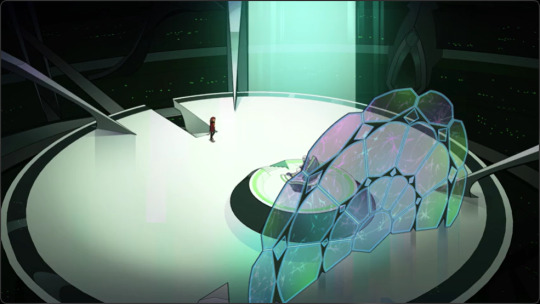
This has been a story so far about taking your own agency and being your own person, and Horde Prime is the person who says “no actually, you shouldn’t do that.”
His throne room is a vast emptiness, his power set is about embracing oblivion.
In that way, Horde Prime is a thematic opposite to the themes of the series. The story has been teaching our characters to be free, and Horde Prime tries to get them to surrender.
We will see which idea comes out on top.

Final Thoughts
I want to talk about Shadow Weaver for a moment. This is a season that delves into redemption, and it offers that to everyone, Shadow Weaver included. We will see how that ends, but for the moment, there is an interesting dichotomy.
I think Shadow Weaver does care about Micah and Catra. She saves Micah’s life in this episode. But she doesn’t care enough to do anything about it. She doesn’t care enough to change her ways. Redemption is offered, and she doesn’t take it.
I think that sets up the concept rather well. Redemption is not just something that is offered, it is something that you have to take agency in. You have to redeem yourself. You can get help, and honey, you will need it. But, you have to do most of the work.
I think that makes Catra’s story a bit more impactful.
Next week, I will be looking at Launch, so stick around if that interests you.
Previous - Next
#rants#literary analysis#literature analysis#what's so special about...?#character analysis#she ra#she ra and the princesses of power#spop#spop adora#spop catra#spop horde prime#star wars skeleton crew#skeleton crew#jod na nawood#jude law is hot#jude law
26 notes
·
View notes
Text
Who's In Charge Here? (Ready For This)
Hazbin Hotel’s plot centres around Charlie’s quest to redeem the residents of Hell and protect them from a heavenly genocide.
The phrasing of that is important. The story is about Charlie’s quest to redeem others. The agency is on Charlie, rather than the citizens of hell.
A large part of that is Charlie’s understanding of what redemption actually is. Is it a generalized “be more like heaven”? Or is it something more specific?
Every part of Hazbin Hotel and it’s sibling series Helluva Boss revolves around individuality. The art style is dynamic as anything, the musical numbers are diverse by nature, and the extras… the extras steal the show.
Hell doesn’t learn from Charlie, Charlie learns from Hell. Or does she?
Let me explain.
SPOILERS AHEAD: (Hazbin Hotel)
CONTENT WARNING: (Hazbin Hotel)

The song begins in 6/4 time in the key of B flat majour. It’s optimistic and pseudo-spoken in tonality. But to hell with that, because at 1 minute 20 on the dot, the ensemble comes in.

Alastor has just offered the cannibals angel flesh as a reward, and the song immediately shifts in tone. Speeding up slightly and changing keys to G Majour. All while the cannibals are adlibbing and someone who’s name I do not know makes the legendary decision to say the following, and you bet your arse I’m putting this in quotes.
“Namamamam”
What this does is simple, it takes the agency from Charlie and gives it to the citizens of hell. The song is no longer about her, and frankly neither is the musical at this point, it is about what she represents and the themes at play.
We have had the revelation of the genocide happening in a month, we have had Vaggie’s betrayal, and Charlie has put all of her plans on a hold because she thinks she isn’t worthy. This ain’t about her and her drama now. There are lives at stake.


This is reassuring and stable. Every word is an octave chord, that is, two of the same note an octave apart. Each section is a rising melody that starts on B and rises to E minour \ G. It is repetitive with the first half containing two mostly identical runs upwards, while the second half dips slightly to reflect the threat of which it speaks, before resolving back up with a hopeful tone.
As a disclaimer, I am far from an expert in music theory. That’s why I am writing this blog. I want to learn. So correct me if I am wrong please. I am using this transcription to guide myself.


This starts the same as previously but then twists with an upwards inflection. The sharpening of teeth chord swaps out its central E for a C, becoming C5 \ G or G sus 4 (again, I’m not an expert, I don’t know the difference between these two names, so I’m putting both of them in and hoping someone will please explain it to me). This is like a bow being drawn back, building up kinetic energy that is released in the final two notes for A5 (E sus 4 \ A) and G \ B.
Now, trying to name all of these chords made my nose bleed, but I had a reason for that other than to make myself look like an eejit.
Ready For This is a song built on chords. You don’t have to know their names to know that the sections of a song that are sung by a choir rely on the interplay between different voices. It’s less about the technical knowledge, though that is still important, and more the density of sound.

I do appreciate this guy pointing at his teeth when he said he would sharpen them. I wasn't sure what he meant at first, but then he pointed, and I am now up to speed. He means teeth. See? He's pointing at them.
This part of the song makes you feel supported because of the contours of the music, but also because of how many parts there are. You feel like you are being lifted up by that crowd.
Charlie is gathering an army damn it. Susan may be the symbol of Cannibal Town’s alignment, but Cannibal Town itself is a symbol of its power.

I highlight this whole section because of it’s rhythm. This is written with an iambic metre. That is, one note slightly longer than the other. Shakespeare wrote in iambic pentameter.
This evokes a marching band or an old timey war song, intended to be easy to sing. Shakespeare utilised the rhythm to make dialogue sound more natural, and “of the common man.”
This was a form of propaganda, not just using music to draw people into signing up for near certain death, but also the subtle messaging of how the songs were written. If anyone could sing it, then it could become an earworm and sit with its audience, pestering them until they join the army.
I find it morbidly entertaining that Charlie begins the song with all of the distractions usually promised by recruitment songs - Camaraderie, travel, adventure – and the cannibals are instead enchanted by the promise of murder. In Hell, that nonsense doesn’t stand.

Charlie's dissonant perspective is brought back for a moment as she argues with the ensemble.
“That’s a little violent, can we tone it down?”
“Oh, don’t be put of by their snarlin’ that’s enthusiasm, darlin!”
“Eh, they just seem a little murder right now.”
“Don’t worry, honey, that’s their thing.”
Charlie. I don’t want to be a pedant, so forgive me for pointing out the inconvenience. But, you are aware this is a war, right? Violence is kind of the point.
Yes, cannibalism is generally considered a foe par in modern society, but that’s sadism. Charlie is complaining about her side being too into violence and murder… in a war.

I have seen discussion of this song as lesser liked at the start because the rhythm is off and frustrating to follow. I agree about that being the case, but that is the point. Notice the time signature when Charlie tries to argue:

It’s in 4/4, notably different from the 3/4 of the verse and the 6/4 of the chorus. Whereas the other two signatures merge together pretty seamlessly, Charlie has to stumble over herself to get the words out here.
This is the same time signature as Charlie’s recruitment jaunt, and that is the section of the song that is cited the most as being off kilter.
It’s supposed to be.
There is a fundamental disconnect between what Charlie wants and what she needs. You are all going to die if you don’t get over yourself and take Hell as it is. Work with what you have, not what you wish for.

Queerness is a spectrum. From "scheming for world domination" to "no thoughts, head empty." I am sitting comfortably at both ends of the spectrum.
Charlie changes her tone and time signature over the course of the song and it works, she is accepted into the cannibal ranks as a leader. Alastor and Rosie imply that this is their guidance swaying her and, according to Alastor, corrupting her. However, and this is really important, he is wrong.
The two of them converse in 6/4, the same rhythm and tune as the verse earlier, signifying their connection to it. But Charlie doesn’t join the ensemble, it joins her.

I maintain that Alastor has actually been pretty decent to Charlie. Like, he keeps saying he is manipulating her behind her back, and he makes a deal that he promises will be a problem in the future, but he never actually does anything in the present to her. Obviously, this will change when that future comes to pass, but for now, he's just supportive. Is he just bad at being evil? Is that what's going on?
Here is how the song starts:

As mentioned above, it’s in 6/4, and judging by the conversation this section has between Charlie and Susan, it’s connecting.
Susan is almost trying to help Charlie here by translating what she is saying into terms the Cannibals will get. You have a dream; we have dreams too. They need the connection.
A few bars later, we get the eponymous motif.

There is a lot I can take apart here in just the lyrics. It’s an admission of weakness, of being new to this, but its also the acknowledgement that said weakness doesn’t matter right now. Hell needs a leader and Charlie is in a position to be that leader.
I am not Christian, but I grew up in a very Christian landscape. As such, the idea of leading from the front, specifically in the context of a show set in Hell, calls to mind the image of the shepherd who leads the flock rather than the sheepdog who chases it.
Leadership in this style is not unique to Christianity, I want to be clear, but it is a fundamental part of that faith, at least in my understanding. And again, in this context, it felt important to mention. But in this context, it is the daughter of the king of hell who assumes that role of a shepherd, rather than the son of the king of heaven.
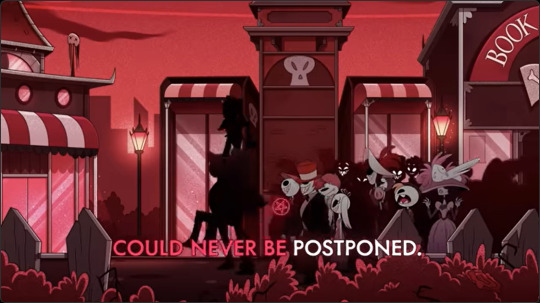
The second time the motif comes up, once again Charlie is singing alone, but it’s the moment after everything has gone to plan. Rosie has told Charlie to relax with the criticism and take the help when it’s offered, and Charlie sings her motif again.
Up until this point, it has been a question of what can be done for each side. This section is Charlie’s connection to the cannibals on a human level. It is the moment when they understand her.
“For the first time in my life,
maybe I can be ready for this.
I can be the marshal leading the parade.
I can come into my own, and I think I’ve always known.
My destiny could never be postponed.
When Adam brings the battle here
I must appear like I’m ready for this.”
Once again, I notice some awfully specific word choice here.
Charlie is still focused on herself. This isn’t a complete story, her development as a character will continue into another season at least. As such, she is still self centred and focused on the philosophical angle of everything. When Adam arrives, she will appear ready. She hasn’t internalized the fact that she should actually be ready. Or at least, she hasn’t internalized that looking like something and acting like something are different things that can go together, but don’t always.
Which is a prescient thing to unpack.

The Ready For This motif comes around for a third time, and here we have my final piece of proof. Charlie doesn’t sing, those around her do. She has inspired them. She has had to change how she acted, sure, but they met her in the middle.

If anything, Charlie is singing background vocals. They part for her to voice the following:
“It is time to take a stand!
It is time to lend a hand!”
But here, she is part of the crowd, offering her perspective when the chance becomes apparent rather than forcing her way through.

Most obviously, the use of enjambment here gives this a rising sense of momentum. That is, each musical phrase begins a note early to hook you and keep you moving.
Also, "we cannot take it anymore". Violence is the tool of the oppressor, but it's also that of the oppressed. It is one of the few options that is always available, and it is where people will turn to when they have no other choice. Empires historically have tried to keep a facade of available diplomacy to keep their subjects compliant. But when it becomes clear that is a farse, those empires never last much longer.

But also, Rosie.
That is an insane note to be able to hit repeatedly, and I’m not just saying that because I sing bass. Rosie’s notes are really high.
That actually contrasts Alastor a bit. They are both schemers, allegedly, and Alastor has spent the entirety of the musical so far grifting off everyone else’s notes. Even in Stayed Gone and Hell’s Greatest Dad, he changes very little. But here, he falls in with the crowd. He doesn’t have anything new to say at all.
It's also notable that Rosie was the one who acknowledged that the ensemble was singing Charlie's song. She is aware of the situation, and her advice to Alastor isn't that he is succeeding at manipulating Charlie, it's that she's going to win, and he should probably stick around her.
Which makes me wonder, does Alastor actually have any power? As in, over Charlie. Is he as good of a manipulator as he makes everyone thinks? He talks a big game but then falls in line with Charlie just like everyone else. Is he special? Is he Machiavellian or is he just a little goober, as scared and spiraling as everyone else, powerless except for a smile.

Final Thoughts
For some reason, Rosie was the character I gravitated towards in this musical. Not just in an “I like the character” kind of way. When I sing along to this song in the car, I sing along to Rosie’s line.
Which is weird and difficult, considering, as has been stated, I sing bass.
Those who know me personally will know that I gravitate towards the mentour that rocks up out of nowhere in the story and offers advice whether you like it or not, so my preference isn’t a surprise, but she also has an umbrella and a cool hat, so what was I supposed to do?
Next week, we reach our penultimate post with the reprise of More Than Anything and discuss what a reprise even does for a story. Stick around if that interests you.
Previous - Next
#rants#literary analysis#literature analysis#what's so special about...?#music analysis#hazbin hotel#hazbin hotel rosie#hazbin hotel charlie#meta#long post
20 notes
·
View notes
Text
They Who Carry The Torch (The Missing Months)
When writing this post, it struck me how close together the second and third seasons of The Owl House were. As in, I have described them as the missing years and it is not uncommon for them to be implied as being at least a year or two apart. But King’s Tide aired on May 28, 2022, and Thanks To Them aired on October 15 of that same year. That’s less than five months.
For context, the gap between seasons one and two was just under ten months. It really wasn’t that much time at all.
But a lot can happen in five months, especially in the realms of fanfiction. The Owl House’s ending was purposely unsatisfying. We didn’t know we would get a conclusion.
This is a post about one comic artist who stepped up to the plate to try and bridge that gap. The one, the only, @moringmark.
Let me explain.

I think the first question I need to ask is why I am doing this?
Moringmark’s comics are not expressly cannon to The Owl House. They are, by definition, fanart, and I haven’t covered fanart as a full post in any of my other series. So why make the exception?
My answer here is kind of twofold and kind of not.
Firstly, canon is not really a thing. Like all definitions, the word exists to allow for common ground between people, but this one is especially dubious. What is cannon?
You may say that the text itself is the canon, and that is a perfectly fine distinction. But it doesn’t take into account retcons and plotholes and alternate futures. Luckily, The Owl House doesn’t have many of these, but areas where canon is more important, such as comic books, tend to feature them more heavily.
This isn’t a coincidence. There is a direct line between having multiple possibilities and the need to clarify that one is canon.

My hot take is this: Canon is just what the general audience accepts as having happened. The main material is the thing that everyone agrees on, and everything else is fuzzy with increasing or decreasing clarity depending on the media and the audience.
For one example, Harold Pots and the Child that was Maybe a bit Bad is a stage play that was written by the author of its parent series. It is technically canon. But due to a number of factors including the author making a fool of herself online and alienating a significant chunk of her audience and the story not satisfying a general audience, it is not treated as fitting the canon.
Flipping the script, The Owl House fandom exists in a really large capacity online, most notably in this case, on Tumblr. A significant chunk of the fanbase has at least come into contact with Moringmark’s art, and it is not uncommon for the comics to be believed canon unless proven otherwise, which is not an honour ascribed to many fanartists.
In addition, we didn’t know we were getting a season three, so for several months, these comics were the The Owl House.

My other reason is this: I do not run a review blog. I do not have to weigh the worth of a fan artist alongside its inspiration because that is a) not fair considering the size of the teams working on the two and b) not my job.
Instead, I run an analysis blog. I discuss what a text is about and comment on how I got to that conclusion. This is a series about The Owl House, and Moringmark’s comics were The Owl House for a few months, it is important to me that their contributions to the themes of the series be understood.
So, I have collected a few of Moringmark’s posts that were published between the end of season two and the start of season three, and I have some thoughts.
Starting with this one, published Sep 16, 2022.
Moringmark had two main takes on the show that were remarkably accurate, even if their aesthetics were different (I will get to that in a moment).
The first and the one most obvious in this post is the slice of life story of the Hex Squad moving in with the Nocedas for a while.
Moringmark is an incredibly funny writer, so a lot of the time this was leveraged for humour, and that shines through here, but this is more than that.

The designs are different to the original show. Everyone’s hair has grown out a bit with two exceptions to show that time has passed, although not much. And Vee’s human design is tweaked slightly to allow for a visible difference between her and Luz. They still look like sisters, but she is a lot simpler and looks slightly younger, reflecting their dynamic.
I also appreciate her shirt design. “Me.” She is more self actualized here than in her series incarnation. She is no longer playing a part and is fully her own person.
Notably, the Hex Squad all have similar clothing designs. It’s the same shirt in different colours with an emblem on the front. Notably, Willow’s is slightly smaller on her and Gus’ is slightly bigger on him, while Hunter doesn’t wear one at all. They are all Luz’ clothes because none of the squad had their own. The group hasn’t been able of felt the need to get clothes that fit everyone yet.
Subtle storytelling.

Speaking of which, the only two who’s hair hasn’t grown since the series finale are Gus, who’s style has stayed the same, and Hunter’s, who’s decidedly has not.
Hunter is missing his iconic curl thingo that hangs over his face, and judging by his expression in the first panel, it was removed extremely recently. He too is a different person, symbolically ready to move past his trauma.
But then news of Belos is brought up, and his expression changes, and stays that way. Hunter becomes set and focused and determined. Even when in Camila’s car at the end, his eyes are glued to the mirror. He is constantly on the lookout, constantly ready. I’ve seen this trauma response in real life.
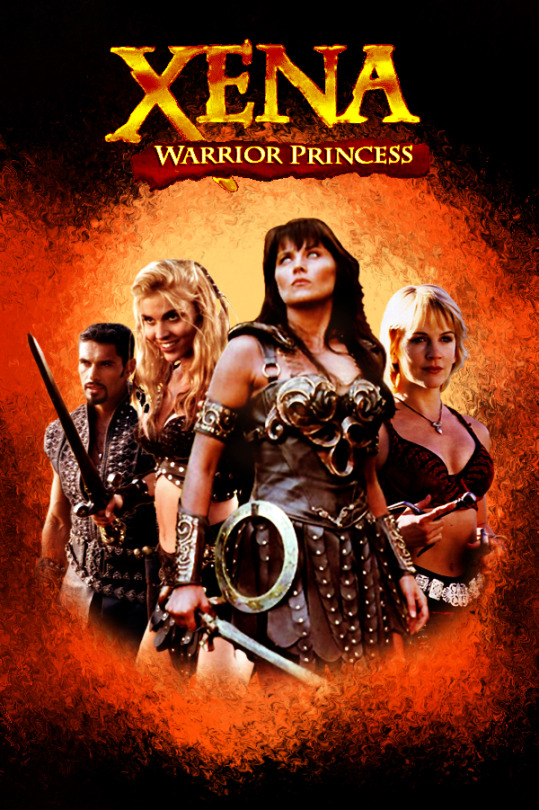
I recently watched Xena Warrior Princess, a show that is goofy as all hell, and probably the most nineties television series that ever graced our screens. I mean that both as a compliment and as an… oh boy.
The series is notable in this context for the following exchange:
“See how calm the surface of the water is? That was me once. And then…” (Throws rock in water) “The water ripples and churns. That’s what I became.”
“But if we sit here long enough, it will go back to being still again. It will go back to being calm.”
“But the stone’s still under there. It’s now part of the lake. It might look as it did before, but it’s forever changed.”
Hunter thinks that he can just cut out that part of his life and move on. That’s why he cuts his hair, but its also why he is so focused on getting to Belos. But the events that shaped him are still there, under the surface.
The reason I selected this comic for analysis was its relation to the series’ theme of family. I.e. bad family will leave a mark that you can’t get away from, you can just try to hide it. But good family will try to help you and comfort you and offer you guidance and protection. To make that point, in comes Camila and her car.

Going back a bit to the subtle storytelling. The kids’ reactions to the news of Belos are the centerpieces of the fourth panel. It’s slightly smaller than its predecessor, which has a tiny zooming effect, but everyone has a distinct emotion. Luz and Amity look to each other, Vee gives a worried expression, and Gus and Willow immediately clock Hunter’s tone shift.
But Camila also responds. Not much, just a glance and an eyebrow raise, but enough to show she noticed.
Thematically, the fact that Camila’s offer to help the crew take on Belos happens off screen infers that it wasn’t up for debate. She was fully ready to throw hands with this man from the minute she saw his impact on the children she had taken under her wing.
Which leaves an opportunity for humour. The Owl House is a satirical comedy, and Moringmark gets that. He undercuts the cool moment of the crew walking down the road, but then makes it clear that the catharsis of this isn’t going away.

That’s really it. Catharsis. Moringmark writes comedy and drama in remarkably similar ways, and while the above post is a clear example of it, I need to bring up this comic, which delves into that parental theme for a different kind of emotion.
Notice what I said earlier about Vee and her self-actualization. It doesn’t get as much of a spotlight as Hunter, but this is also someone deeply scarred by Belos, and yet she seems a lot more healthy than him. Maybe because she has had time and exposure to a better parent figure than Belos. Maybe because she has had time to sit by the lake and watch the ripples die down.
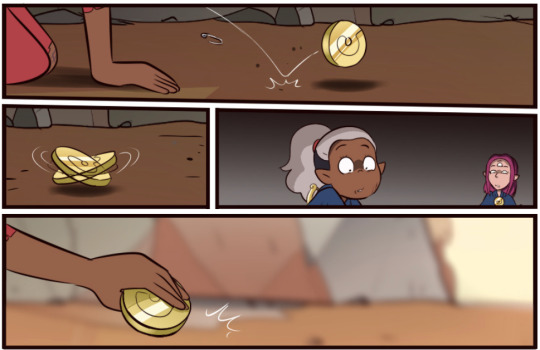
Look how Moringmark achieves pacing here. You know the tense situation; you don't need words to hear the bounce and ring of that amulet. Even the cut to the two's faces amplifies this mood. Its shape heightens the perspective while the blank background cuts away from everything else, so you don't get distracted.
Next up, we have the story back on the Boiling Isles. Moringmark went for a Mad-Max style road trip story type of thing, and there is so much here to choose from.
I was tempted to go with this comic because it has the bus in it, and I love the bus. But I think the most emblematic of this part of the story was this:
Published on July 19, 2022, this comic is notable for a few things.
The little details in this comic stand out to me on a storytelling level. How the trappers are the Collector’s henchmen, and how the renegades are using necklaces similar to King’s to avoid notice from the Collector. That’s a really cool idea.
But I had to include this comic for its portrayal of the Collector and of Boscha.
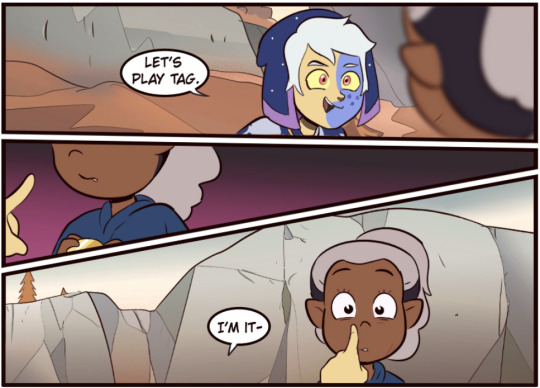
You would think that this isn’t too different from how the Collector is usually characterized. They are doing the exact same thing as they did in King’s Tide.
Obviously, this is different by dint of how Skara’s reaction to hitting a solid surface at the speed of sound will probably be different to Belos’. But it’s also important to note that this version of the Collector works by the rules of the game.
This is a cosmic entity that has rules, and therefore is something that can be worked around. They have a soft spot for those who try to follow the rules, balanced out by an utter disregard for mortal life. This version of the Collector is terrifying specifically because we have seen him try this before and succeed. We know how this ends, the Collector’s character is a twist.
Speaking of which, we also know how Boscha will act. She is mean, as has been established by the comic in its first few panels. We learn that she doesn’t seem to care that Skara is injured. This is not someone we expect a character arc out of.

But then we get a moment of clarity. We get Boscha risking her life Skara. We get a moment of redemption for Boscha.
And I’m going to level with you. I like this far more than For the Future. Consider this foreshadowing, as I have a fanfic in the works that is based in this version of the story. That is, what might have happened had this or something similar to this been the canon.
I will remind you that this was the canon when it was written, as much as anything else. We didn’t have another option. This was The Owl House.
A lesser concept in the original series was that of redemption and relationships. Amity is redeemed through the compassion that Luz shows for her. Not even love at this point, but friendship that blossoms into romantic attraction.
Similarly, Alador is redeemed through his love for his daughter. Lilith is redeemed through her love for her sister. Mattholomule and Hunter are redeemed through their friendships with Gus and Luz respectively. Etc.
This comic just continues those themes into showing Boscha redeem herself through her friendship with Skara.
It is worth pointing out that this isn’t a full heel turn. Boscha isn’t ready to admit anything or stop being mean, but it is a start. He heart is in the right place, even if her brain is not.
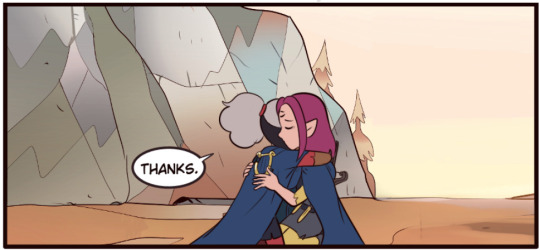
This is why Moringmark is canon, at least to me. These versions are fun as AUs, but when they were released, they were as good of a continuation as we were going to get. They understood the themes and the message of the story, as well as its tone, and in a way, they carried the torch.
And they are still going. As of writing this, Moringmark has delved into future and past timelines. They have written three full series about Luz and co.’s children, Boscha and Skara’s romance during the events of the series, and an AU evil Luz.
This is what The Owl House is right now, and it’s what series like this are. I brought up Xena Warrior Princess earlier, and that story still has fanfiction and fanart made of it, a quarter of a century after it finished. Stories exist in the collective consciousness, and while we can trace the lineage of The Owlhouse through the shows that inspired it and that it will go on to inspire, Moringmark is emblematic of the fan community as a whole who keep the flame burning.
The Owl House series has finished, but its story lives on. Not just through Moringmark, but through every other fan who so much as makes a shitpost. We keep the lights on, we decide when to call it quits, we carry the torch.
Light, do not faulter.
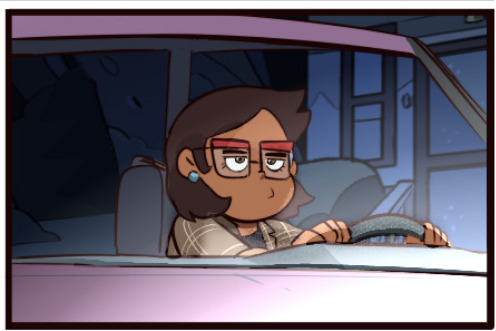
Final Thoughts
There are so many other Moringmark comics that I could have spoken about. From the dramatic and emotional with Skara comforting Matt Tholomule to my darling, the bus. But I left it where I did for a few reasons.
It is not my intention to be sycophantic about Moringmark. I don’t want to be invasive, and if this comes across as such, I apologise and will remedy that. But also, this isn’t about Moringmark.
This is about the fan community. Moringmark has made themself the head of that community through sheer time and hard work, and has made themself as big enough part of it that I can feel comfortable writing this and it not feeling out of place alongside the original series.
But there is a lot more of this fandom than Moringmark, I can’t discuss every fanfic at length. Just know that they are out there, and you can find them. My ask box is open for recommendation requests, but you should also just go and look for them yourself. Follow artists, support them if you are able. This is a community, we should act like it.
Next week, I am diving into the final season with Thanks To Them, so stick around if that interests you.
Previous - Next
#rants#literary analysis#literature analysis#what's so special about...?#character analysis#toh#the owl house#toh hunter#toh vee#toh camila#toh skara#toh boscha#moringmark
43 notes
·
View notes
Note
hey, dumb question ─ would you mind if i reblogged every single one of your she-ra episode analysis posts on catras-breakup-song for archival (and continue to do so as they come out)?
Go for it.
4 notes
·
View notes
Text
"Do It" (Destiny Part 2)
When you interact with a lot of similar media, you tend to notice patterns and recurring tropes. Most notably in this example is the final season darkest hour.
Typically, when a series wants to ensure that the stakes are higher for its final arc, it will end the previous in a very dark place. Avatar: The Last Airbender does this, and I just covered The Owl House doing a very similar thing.
But She-Ra has a lot more to it than just the singular convention. This is an incredibly cerebral series with a ton of moving parts. So, for the season four finale, I would like to examine a few of them, and what they do for the story.
Let me explain.
SPOILERS AHEAD: (She-Ra and the Princesses of Power, Marvel’s Cloak and Dagger, A Christmas Carol)

Context is important, and stories have an understated ability to draw together disparate elements into a cohesive entity through a consistent theme.
Here, that is twofold. The series as a whole has been about the cycle of abuse as portrayed through tragedy, specifically in its antonymic relationship with genuine love. But Destiny Part 2 zeroes in on the chronological geography of this. As in, there is a distinct sense of time in this episode, and a discussion of the past and future and their impact on the present.
Everything in this episode revolves around these two ideas, and so everything must be analysed through those lenses.

Starting with the runestones, which are an idea original to the 2018 reboot.
“It’s like…”
“…connection.”

Throughout this season, we have seen the princesses glow when they achieve camaraderie, and that glow is near identical to that of the planet balancing itself. Near identical. The runestones are shown to be more powerful than regular camaraderie.
We don’t actually know the origins of the Runestones, with the exception of them being native to Etheria. The Legend of the Fire Princess graphic novel has one in it that was created by the first ones, which implies that the others were not. But I am here to talk about the main series. (If you want me to discuss the book or any other supplemental media, my ask box is open).
As such, I find it important that the power of the Runestones, much like that of She-Ra, predates the First Ones, which means that it was not theirs to use.

In my previous post about She-Ra, I commented on the First Ones as colonialists, and this adds to that symbolism.
The First Ones co-opted something that was, by all accounts, sacred to the people of Etheria, or at least of significant cultural value. It was repurposed into a weapon that would, as a side effect, wipe out the planet. Cruel and uncaring. The First Ones viewed Etheria as a tool that could be cast aside when it was no longer of use, a worthy sacrifice.
In terms of our themes, this is most definitely abusive behavior, and that continues into the cyclical nature of that abuse.
I have also discussed how it doesn’t matter if the First Ones were the aggressors in their war or not. If the First Ones were under siege, then they felt the only way to defend themselves was to inflict more suffering on bystanders. The abuse they received turned them into the villains of this season. But I think the most important moment for this part of the episode is this:

In her desperation and powerlessness, Glimmer tries to destroy the Runestone.
The anger at being used has been turned against the First Ones, but they are using the culture of the people they have colonized as a shield. To get to us, you need to stab yourself.
It’s forcibly disconnecting the people from the symbol of their culture, metaphorically and literally breaking their connection and leaving them weak and in a place of vulnerability.
This wasn’t even intentional. I don’t think the First Ones sat down and schemed about how, when this master plan goes off, there will be one princess who tries to break the runestones. It was a side effect. All of this was a side effect.
The main role of this was to destroy a different force entirely, Etheria was never part of the equation. The First Ones were fighting a war with someone else, and Etheria was just a sacrifice that could be made.

Glimmer is technically surrounded by the corpses of her enemies here. That is the context for her statement that "we are the good guys". Yes, they are robots, but Emily is sentient, so...
Abuse is fundamentally selfish. To the abuser, it isn’t about the victim, it’s about the anger and often pain that needs to go somewhere. It’s about the power and control. The victim was just there. My feelings matter, my heart, my obsession, my anguish. You are a convenient scapegoat.
It is important to understand that this mindset is built on a misunderstanding.
There is a reason for it. Of course there is. Everyone has a reason for their behavior. That’s what the cycle of abuse is. You get so wrapped up in your own mind that other people stop existing, and you are left with empty shells around yourself. But having a reason does not make you right.
There are real people around the abuser and the abused. She-Ra is a series about those real people, hence why it is so human in almost every character. It is about the real people who are hurt by someone else’s drama, the real people who get burned by being too close, the real people who get caught in the crossfire.
The Runestones are symbolic of those real people en masse. Used as pawns, corrupted, and destroyed.
In that sense, they also relate to the episode theme of time. They are monuments of a distant past and a history even greater.

At the risk of oversimplification, Runestones in the real world are a Scandinavian concept that emerged before the Viking age but gained traction during it. The vast majority were dedicated to the fallen, but a fair few discussed everyday life and stand as monuments.
They also look nothing like those in She-Ra.
In She-Ra, the Runestones are aesthetically just gems and crystals that are big and look cool. So, why go with the name?

First and most obviously, it sounds magical. Runes sound magical and as any architect will tell you, a large part of any creation is the emotions it inspires. If you want a story about magic, saying “this is a glowing crystal called a runestone” is an easy way to do that.
Although, that does bring up an interesting meta question of why there is magic in this story? As in, what does it do for the themes?
I plan on delving into this question in more detail in a later post, so you have that to look forward to.
For the moment, however, the She-Ra has made a point of connecting magic to nature, and so the name “rune-stone” entangles magic to the ground itself. It is the bedrock of these civilizations.
The other reading is that the stones themselves serve as runes, which are in turn a form of written language and communication. They are the words of people long gone, although crucially, their descendants are still there.

This is how culture exists in a very real sense. Not merely through written words, but through the language and communication itself. Mythology and religion, history and philosophy. Word of mouth and art. Culture is not a static thing of aesthetics but a dynamic manifestation of shared ideas, and sometimes it dies out, but usually it just continues and evolves into new forms. It is everything that has come before and every word that is spoken.
I mean that literally. Every single word has a history and evolution that makes up its current form. The word "Silhouette" comes from a French who didn't like to spend money. Language is the manifestation of history and how it informs the present day. It’s part of everyday life, it is context.
The Runestones are that language as a physical manifestation that literally grants power, and the First Ones use them to destroy people. In this way, what the First Ones did was cultural appropriation, and I don't think my opinion is unpopular that this is, in fact, bad.

Moving on to Light Hope.
“Mara. Mara would not want me to… Mara was a traitor. She turned against her people.”
We have seen two sides of Light Hope. The one who Mara befriended, and the one whom has manipulated her way through half of the series. The weapon of war who couldn’t escape. The cycle of abuse come full circle.
We have seen Light Hope get humanised, and then cast that away. But as best we could tell, it was the system itself that overrode her free will.
This line, however, muddies the waters, because it reminds me of another in the same episode.

“People have hurt you, haven’t they? They didn’t believe in you. They didn’t trust you. Didn’t need you. Left you.”
Of all the people to draw a connection to, Light Hope’s dismissal of Mara is strangely reminiscent of Catra’s antagonism towards Adora.
The cycle of abuse hasn’t just happened before on a grand scale with the She-Ras themselves being destined for tragedy, but this specific plot has happened before, and look how it ended up.
Catra has spent the entire story addicted to power like a safety net. She craves being the highest ranked one in the room because it’s safer, but there isn’t much room at the top of the pyramid. You end up alone, and isolated, and with further to fall.
Catra has been trying to claim power like Shadow Weaver taught her, but has ended up like Light Hope. Alone in her tower, scheming, reminiscing, caught up in memory and spite.

This is a warning to Catra. Most obviously, change your ways. But just to be safe, don’t ever cut your hair and don’t ever start wearing white.
Once again linking back to the themes. The cyclical nature of this series is best exemplified by the threat of another season. This is a story that wants to end, to be free, but it keeps coming back to a song and dance.
I mean this as a compliment. This is the only series that makes me fear another season, but stay glued to my seat as I watch and love every moment. The screen protects me from what is happening inside, and the fact this is a story means that I can stop at any time. That isn’t a luxury the characters are given.
The aim of the series is to end.
And it will, that’s the key thing here. Everything ends. The cycle of abuse is not a true circle but a spiral that winds in on itself until disaster.

Light Hope and Mara are the emblems of a previous cycle. Their story ended in tragedy they couldn’t avert and that left naught but shattered people and places in its wake. Light Hope was Catra, she was someone who was happy. But now she is an instrument of the system that drove them apart, unable to understand or take comfort from Adora until the end, begging for Adora to "do it", begging for death. This is who Catra will be.
Don’t believe me? There is only one other person who uses the words “do it” in this episode. Can you guess who that is?

“What are you waiting for? Do it. Looks like we're both alone, Sparkles.”
There is, however one majour difference between the old story and the new. This rendition isn’t over yet.

I haven��t seen nearly as many Marvel films and TV series as I should have. I saw Infinity War and End Game, I saw Thor: Ragnarok, and I watched Moon Knight, but other than that, I mostly never cared for the series as a whole. I didn’t dislike the films, I just never cared that much.
Which is honestly weird, because I read comics on the regular, and got into comics through Marvel. I started with a Spiderman one shot in the Clone saga, and while I wouldn’t call myself a comic nerd by any stretch of the imagination, I was enough in the spaces to know who Jeff the Land Shark was before Marvel Rivals was a thing.
The reason I bring this up is to recommend a series I left out of the above list, Joe Pokaski’s Cloak and Dagger, which ran from 2018 to 2019.

I had read a few comics featuring the eponymous heroes before I saw the series, so I knew vaguely who these people were, but this was one of those series that got me at just the right time to leave a lasting mark on my psyche.
Most notably, this is the place from which I get the phrase “There’s always a point of no return. It’s called the end.” But there’s a little more to it.
The premise of this series is that Luisiana is always saved by two kids, and that one of them will always die in the process. Tyrone and Tandy (Cloak and Dagger respectively) spend the series trying to find a way to escape this cyclical tragedy.
The season one finale will always break me, because we see the moment when Tandy comes the closest to being the one to die, and it’s not in an overly violent fashion, it’s in a phone call.

The two are trapped in a surreal, timeless landscape, and Tandy is presented with a phone using which she can call her deceased father a moment before he dies. She picks up the phone, has a brief conversation, and then the line goes dead. She picks up the phone again and has the same conversation. Again, and again, and again. Just one moment.
Tyrone asks her to leave, she refuses, so he asks her how long she has been there, a question to which she has no clear answer.
If Tyrone hadn’t rescued her, Tandy would have as good as died there and then. Lost to a memory. Lost to the trauma of losing her father playing back to her over and over again.
Cloak and Dagger are played by Aubrey Joseph and Olivia Holt, and while Holt's performance as Tandy in this scene is the showstopper, it would be remiss of me to not mention Joseph's portrayal of Tyrone as he realises what is happening and tries to stop it.
There is always a moment of no return. It’s called the end.
You lose when all hope is lost. You lose when you give up. You lose when you let everything consume you. You lose when you stop trying to escape.
Cloak and Dagger keep getting told that one must live and one must die, and their response is “how about no?”.

Light Hope lost. She became the monster that created her. But that cycle ain’t done for the here and now, Adora and Catra can fix this.
This actually moves really nicely into the third and final element of this episode that I would like to discuss. The title.

Destiny and fate are funny things, aren’t they? They don’t actually mean anything. Not tangibly, anyway. Yes, yes, your fate and your future are one and the same. But that isn’t a fair metric, is it?
Is fate inescapable? Was I fated from birth to write this post? Was my future laid out for me? Or does it work slightly differently?
I am partial to the dichotomy between fate and free will. That being, a person with free will has the autonomy to make their own way in the world and decide their own fate, whereas everyone else is just pulled along by the strings of time. I think this is sweet.
In practice, I have found one way of writing destiny that I like. Nature.

For the record, I am including nurture within this. A person’s nature is just who they are, their history and goals, their fears and hopes.
Specifically, life experiences make up a person. If I find an arachnophobe and I give them a spider, I can be pretty sure how they will react. That is your destiny. It is the path set in front of you by yourself. There is freedom to wiggle within that, but everyone has a set of key components that make up their personality, and in the right circumstances, this can be manipulated.
I could go for the obvious here and talk about how God Of War: Ragnarök leverages this to talk about trauma. I could. It would certainly fit with She-Ra’s discussion of that concept through the cycle of abuse.
But instead, I am going to recommend you the video by Overly Sarcastic Productions (@comicaurora) about that very topic (link) and go further into the past with Charles’ Dickens’ A Christmas Carrol, or more photogenically, the Muppets film of the same name.

“Are these the shadows of things that will be? Or are they the shadows of things that may be only?”
A Christmas Carrol delves into themes of redemption and capitalism, and I will die on the hill that Charles Dickens had a wicked and very dark sense of humour that was brought about by the time in which he was writing. But for the purpose of this post, the book wields the future like a threat.
“Your chains are forged by what you say and do.
So have your fun, when life is done, a nightmare waits for you.”
In A Christmas Carrol, fate is just consequence. Cause and effect. The book is about three ghosts appearing to a miserable old man who thinks he is alone and unimpeachable and showing him multiple occasions when his life was directly impacted by others, for better and for worse, and the effect that his life is having on others.
It opens with a warning from the ghost of Scrooge’s business partner/partners. Cause: Greed. Effect: Chains. Easy one two punch.

It is crucial to me that when Scrooge finds his grave and asks if the future can be changed, the spirit gives no response. It doesn’t give him comfort, but it also doesn’t tell him his future is set. You can try and change your fate. Go for it. If you don’t you will end up here. Alone even in death, but still buried like every other man. There are no coins in your coffin, just memories.
The point of no return is called the end. You decide what that will end up being.

Adora and Catra have been thrust into this story by their natures, and they have been positioned in such a way that can only lead to destruction.
It was in Catra’s nature to take Adora leaving as badly as she did, because she has grown up being told that affection is exclusive and that a person can only care about one other person. She has been taught love in an incredibly dysfunctional way, and she is just a traumatised child, but she’s a traumatised child who is actively wrecking other people’s lives.

Similarly, Adora is a hero in the most self-destructive way possible. She has to save everyone, has to destroy herself for everyone else’s happiness. She is a pawn in a war and she will burn herself to the ground to feel any kind of warmth and it will kill her.
It is these two’s destinies which clash. The cycle of abuse is a spiral that leads to destruction. The tragedy is tragic. So, what do?
To change your fate, you make the decision to change your nature. An arachnophobe can overcome their fear, Scrooge could become a charitable man, Adora and Catra can escape.
If we lean back into the path metaphor. Your nature is a road that itself is moving towards a destiny. If you try and get off it, you will fall over. But you can reach the edge. You can break free. You can start moving in a different direction.
It is always possible to change.

Before I finish up, I want to discuss Horde Prime’s introduction, because he is fantastically incurious in a way that leans into what I have been saying about the inherent self-centredness of abuse.
“You have forgotten who you are. You truly think you are worthy to stand beside me, could be equal to me?”
If Horde Prime was reading Hordak’s mind, he would have seen the portal and the source of the energy reading. He would have been curious as to its use. But no, he projected.
It didn’t matter what Hordak did, it would never have been enough. The fact that he gave himself a name was sufficient to warrant animosity. Prime didn’t need a reason, he needed an excuse to show off his power to Glimmer, but also to himself.
Side note here, Horde prime is played by Keston John, who also plays Darius in The Owl House, and has a voice that can melt butter.
I say this because he turns that off like a switch as he shouts down the powerless Hordak. That grace and smoothness is gone for a horrible growl.

This tiny little gesture as Prime draws back his hand before he strikes. He's deliberately offering Hordak grace and kindness, deliberately making it clear that they were an option and he chose violence. He is giving hope so that it stings even more when he takes it away.
Which presents a question: Is Horde Prime actually put together? Is the snarling monster a tool that he uses? Or is it the real man? Does the distinction matter?
Prime has to be told about the weapon. He doesn’t think for himself, he just coasts off everyone else’s misery.
This man is a physical threat, sure. We have seen that in previous episodes. But here he establishes himself as a thematic force in the narrative. He is an abuser, he is a manipulator, he is selfish.
Horde Prime is terrifying.

Final Thoughts
I had meditations about Arcane and Shakespeare in this that I had to cut because this is one of the longest posts I have ever written.
I want to stress that She-Ra as a series didn’t go places. It didn’t cover new ground as it progressed. Episode two of series one shows a home destroyed by the trauma of a war and the psychological damage that the cycle of abuse can do to a person. She-Ra started here, it just got blunter as the characters got more and more wrapped up in their own heads. Eventually, the show literally wrote its themes on the walls.
This is a tragedy desperately trying to happen. That’s what’s so compelling about the final season yet to come. The character’s have one last moment to get their arses off that road to the end of the world.
Last chance. Last stop. The point of no return is called the end.
Next week we are diving straight into season five, so stick around if that interests you. Let’s do this thing!
Previous - Next
#rants#literary analysis#literature analysis#what's so special about...?#character analysis#she ra and the princesses of power#spop#she ra#spop adora#she ra spop#spop catra#catra#adora#spop analysis#meta#long post#spop hordak#spop horde prime#horde prime#cloak and dagger#marvels cloak and dagger#a christmas carol#a muppet christmas carol#spop light hope#light hope#spop mara
44 notes
·
View notes
Text
Don't Die for Love. Live for it. (Out For Love)
There are a ton of similar phrases and words in our languages.
This is not a hot take. The concept of a synonym is far from mine to discover, but I want to dwell on the specifics. There is a reason we have multiple words and phrases, the subtle differences in meaning and tone are suited for different situations.
“Crimson” and “red” differ in specificity, and “sanguine” has other connotations that change the vibe slightly.
Again, this is pretty basic stuff, but I would like to use it as a jumping off point because of one specific nuance.
There is a pretty majour distinction between “I would die for you,” and “I would live for you”.
Let me explain.
SPOILERS AHEAD: (Hazbin Hotel)
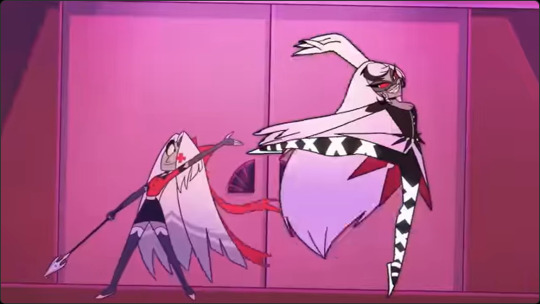
Ok. First up, a little thing. This song uses an ABAB rhyming scheme with two exceptions that I will get to in a moment.
“I see you're driven by your detestation
Your every step is stoked with animus
You need a different type of motivation
Or there's no way that you can handle this”
Rhythms and rhymes serve a very similar purpose in poetry and song. They guide you through the story and set the pace and feeling.
Like a key in a song. Everything in the song fits a few notes that provide grounding. When the key shifts, so does the mood. Likewise, when the rhyming scheme changes, the mood follows.
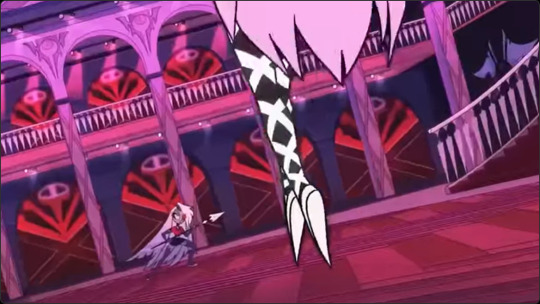
I am fascinated by the simplicity of this song's staging. Episode seven is by far the most traditional of a musical as Hazbin Hotel gets, with the crowd work call to arms of Ready For This, and the mentour duet dance of Out For Love, and the simple staging calls back to that.
Animus is a weird word, right? As in, who besides me and my horribly scuffed dialect has ever used this in common conversation?
In terms of definition, the word has three (technically four, but I don’t want to talk about Jungian Psychology) meanings; Hostility or ill feeling, motivation to do something, and the rational mind.
These are vaguely similar ideas, but not entirely, but we can use context clues to pick up on which meaning Carmilla is inferring.
Most obviously, she told us a line earlier. Driven by detestation. So “animus” in this context means hostility. But there is an argument to be made for motivation.
There is an absence of specificity in the line preceding. Detestation for what? For angels? For Vaggie herself? Is animus in this context Vaggie’s desire to get herself killed?
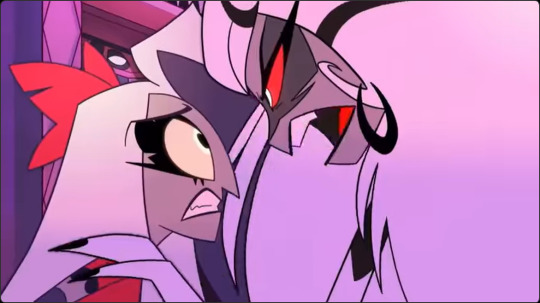
The tone is different from a typical pep talk, isn't it? Hazbin Hotel is a satire, and here we get a twist on the mentour. Usually, the third act breakdown consists of all your friends telling you that everything is fine actually and being reassuring. We will see how Ready For This shakes up that, but here it is played remarkably straight. With one exception: If you wanted sympathy, you came to the wrong place.
This also fits really well with the detestation idea, but it doesn’t exclude the self-destruction angle, it just reframes it. Because we know Vaggie is “out for blood”, so any blaze of glory motivation needs to exist in concert with that.
“I know you're thirstin' for vengeance, Vaggie
You're out for blood
But you'll only stand a chance if you're out for love”
I refer to Whatever It Takes, in which Vaggie assigned herself as Charlie’s armour, dehumanizing herself for someone else’s dream. Charlie didn’t ask Vaggie to do this, and I don’t think Charlie knows that this is how Vaggie feels. But, Vaggie is willing to throw her life away for someone else. Vaggie is willing to die for Charlie.
But is she willing to live for her?

Which brings up an interesting question: What is this song talking about? It’s title, chorus, and bridge all spout the phrase “out for love” like it means something, and what exactly is that?
“Out for love, love
Think of who you care about, protect 'em and be
Out for love, love
You're gonna fight without gloves
And when that push comes to shove
Yeah, you just might rise above, long as you're out for love”
Clearly, it is something to do with using love as motivation, but Vaggie has already been acting out of love. Is this just a cookie cutter proverb?
I would argue that it relates to my core thesis. i.e. Vaggie’s relationship with her own life and what love means.
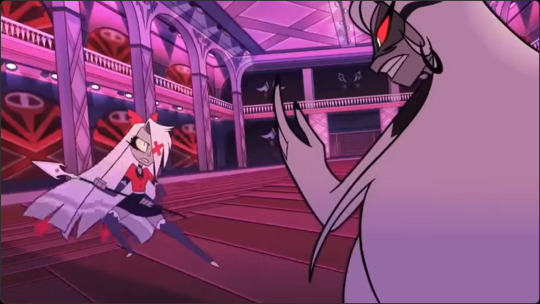
Vaggie is a soldier first and foremost. She is someone who has been told day after day that her life means nothing. She is to give herself to the cause. Even though she can’t be killed, her role is to give her life for someone else’s war. She is a tool.
She was even made to wear a mask just to make sure nobody could mistake her for a person with free will and decision-making skills. It was the crime of removing that mask that got her into hell. The crime of being a person.
Even when she leaves that toxic environment and starts life with Charlie, that mindset sticks. It’s not conscious, but it’s how she has been taught to see the world. Do you ever examine the way in which you walk?
Dying for someone is quick. It is a single decision. Living for someone takes time and dedication.
Living for someone is protecting them time and time again. It means being there for them and getting them out of the way of a bullet rather than stepping between it. Living for someone is self-sacrificial, sure, but not self-destructive. That is an important distinction.
It is not toxic to love and be loved in return. It is toxic to be required to love and to receive nothing. It is toxic to be told to die for a cause.
Vaggie doesn’t know the difference, so she assumes all affection works the way it did in heaven.

The Crane Wives are the unrivalled queens of metaphor and complex emotions. Am I biased in this declaration? No. No I am not. Definitely not biased. What are you talking about? No biases here.
Specifically, their song Nobody works in a really similar way to Out For Love.
It has a similar rhyming scheme. ABAB, with the chorus falling into a couplet that ends each phrase by repeating a single idea.
But this song is about a toxic relationship that the perspective character is unable to leave for one significant reason.
Throughout the song, you listen as the protagonist tries to reconcile the disparate parts of her lover.
“Tender as a bruise, sharper than a razor.”
She is begging with her subconscious to let her out, but love is a fickle thing and can be corrupted into a carrot or a stick.
“Nobody ever loved me like she tells me she does”
Tell don’t show. There is no actual love in this song, it is just the idea of it. Ostensibly, there is no difference, but there is a difference in phrasing, and a difference in tone. We know it is fake, but the protagonist doesn’t know any better.
The song breaks all rhyming and rhythmic conventions that it has established for one brutal moment to make this abundantly clear before it lapses into defeat in the final chorus. When everything changes, your mind is reset and you remember the different part more clearly. It’s like a key change.
Vaggie doesn’t know better. Dying for someone is better than nothing, right? That’s love, what doesn’t hurt a little bit?
“I should be counting blessings
Something is better than nothing
Isn't it, isn't it, isn't it?
It's close enough to perfect
What does it hurt, a little bit?
A little bit?
A little bit?”
Hazbin Hotel is tragically short. It needed at least two more episodes to get where it wanted to go, so it found loopholes. It implied a lot of its story, and while that didn’t work for everything, there are some elements, like Vaggie’s story, that I found really compelling.

I mentioned that Out For Love is structured similarly to Nobody, and that continues here. Before the final chorus, Carmilla keeps her rhyme scheme going, but messes with the pace of the song entirely.
Fear of losing. Don’t die, essentially. If you live for someone, you are a better fighter and a better warrior. If you have something to live for, then you have a win condition, you have something to achieve. If you are just trying to get killed, then you lose either way.
“Fuel yourself with the fear of losin'
That somebody who's your reason to live
Harness your heart, and you can't help choosin'
To fight with all you can give.”
The song emphasises it’s point to get you to remember it, and then, after all that, we get the key change.
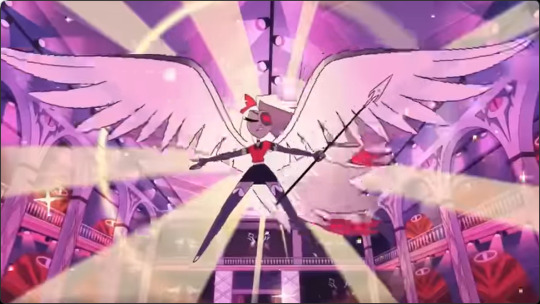
For the majority of its runtime, Out For Love has sat comfortably in C majour. But for the final chorus, it rises in pitch and settles into D flat majour, which carries a sense of victory to it as Vaggie finally gets the message.
She needs to live for love, only then can she truly be someone’s guardian angel.
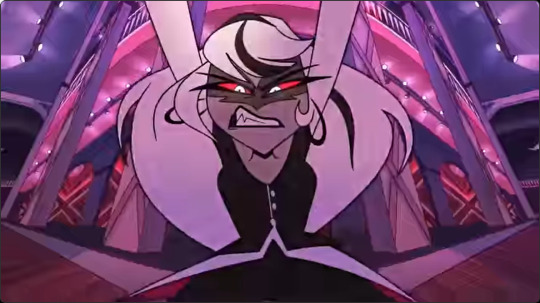
Final Thoughts
I don’t like that Vaggie got her wings back at the end of this song.
I will defend this song from any hater you throw at me. If you tell me it sounds bad, I will disagree with zeal. If you tell me it’s redundant in the narrative, I refer you to the 1400 words that I have written to the contrary. But I cannot defend the wings thing.
It’s a shame, because I really like this song and think it is unfairly maligned in the Hazbin fandom. But I think its final moments ruin it. I think having Vaggie as visually distinct from the angels in silhouette, keeping her ribbons in the place of the wings, would have made the rest of the series so much more visually interesting, and the fact she got her wings back takes the teeth out of her fall for me as a story beat.
Next week, I will be covering Ready For This, and the extras that teach Charlie about redemption. So, stick around if that interests you.
Previous - Next
#rants#literary analysis#literature analysis#what's so special about...?#character analysis#meta#long post#hazbin vagatha#hazbin vaggie#hazbin carmila#the crane wives#hazbin hotel
32 notes
·
View notes
Text
IDK How to Title This (King's Tide)
There’s something fascinating about meaning. Not just the answers we draw from texts, but how we do that, and just how much informs our readings thereof.
There are so many conflicting elements that change our perspective on things, from authorial bias to external circumstances, to coding, to our own life experiences. Meaning is dynamic.
The best example of this is actually Tumblr. There is a recurring thing on this website of misinterpretation caused by factors the original poster had no idea about. You said A but because I experienced B, I interpret what you are saying as C.
This is nuanced, and it’s important to understand when it is happening so you don’t pick fights with people who absolutely do not deserve it, but at the same time, on a smaller scale, it’s almost unavoidable. The variety of interpretation, that is. Don’t pick fights, that part is easy to not do.
In the context of The Owl House, King’s Tide was the last episode. There were no more afterwards. There was no season three. So, everyone who watched it knowing that got a very specific reaction.
But then we did get a Season Three, and suddenly this stops being the series finale. Suddenly, the meaning changes.
Let me explain.
SPOILERS AHEAD: (The Owl House)

In 1994, American rock band Soundgarden released their fourth album, called Superunknown. It would go on to achieve iconic status and be the band’s breakthrough album, but more importantly, it would be one of the few albums that I own on CD.

This is the Black Hole Sun visual, despite the fact that it 100% is not.
Genuinely, I went mad trying to find this, because it wasn’t just that the vibes were aligned. I was convinced that I had seen this specific visual before.
I hadn't. I wasn’t on to anything here.
The cover for the single version of Black Hole Sun looks like this:

And the album cover for Superunknown looks like this:

They aren’t even close. So I, brought out my CD case, which looks like this:

Now, we are talking. It isn’t exactly the same, but it’s something I can work with. Once again, I came into this thinking I had seen the specific visual of a black hole in a beam of light before, and I was wrong, but I wasn’t off by a mile.
As a last-ditch effort, I looked up covers of the song and found one by Voiceplay that I listen to fairly frequently.

Slightly closer, but it came out in April 2024, almost a year to the day after The Owl House’s finale aired. I remember watching King’s Tide for the first time and doing the Decaprio pointing thing.
The Voiceplay arrangement is good, here’s a link to it so you can check it out. But there is no way their version could have rewired my brain if it didn't even exist yet.
Which brings me back to the question of why do I bring this up? If it is only tangentially relevant, what is the point?
Complexity of interpretation.

This is the closest shot I could find in The Owl House to any of the Black Hole Sun official imagery. But I want to stress that I am shifting the goal posts sommat savage.
Whether it was intended or not, my reading of King’s Tide and the draining ritual is inextricably linked to Black Hole Sun, and I actually think that is fascinating.
It is important for me to understand that this is my bias speaking and not the actual text, but again, it’s not something that is avoidable. It’s just something that happens in the human brain.
Meaning is complex, and in this case in a way that the creators most likely did not account for. But Black Hole Sun is a part of how I draw meaning from the story, and since this is a blog about my own thoughts and analysis, it needs to be dwelled upon.

Black Hole Sun is nihilistic, kinda.
It is one of those songs that resists interpretation because it wasn’t written with one in mind. Soundgarden was just trying to put lyrics to a page to support the atmosphere of the title, and as such the song is surreal first and foremost.
Combine this with the genuinely unnerving music video and you get a song that, to me, seems to be about a disillusionment with reality. It is the nihilistic “nothing matters” that is maddening and uncaring. It views life as a but a stage or a game for pantomime theatrics.
Hey, would you look at that? The draining spell is the manifestation of Belos’ nihilism brought about by his own bigotry. The man doesn’t view the Boiling Isles as real; he treats the world like a chessboard, that’s why it doesn’t occur to him that he can lose. Why would the pawns turn on their player?
This also relates to the Collector a bit though, doesn’t it. Someone obsessed with games to the point of cosmic indifference.
But their time to shine will come in another post.

Belos is interesting as a villain because he is fundamentally wrong. He doesn’t have a sympathetic motive that he took too far. He’s not out for revenge. He’s an eejit.
Black Hole Sun is, as has been stated, surreal. Which implies a lot about the mindset of the musician. The world is hopeless here, but that’s not how the world looks.
It’s fake, the entire song is pointedly distanced from reality. Nihilism is based in misconception.

This is foreshadowing. Eda's arm being able to detach is a Chekhov's gun in the final moments. But also... look at Raine's face. They are sad, and melancholy. They aren't smiling. It is imperative to understand that Raine smiles once in this episode, and it will hurt you.
As a side note, my thesis for The Owl House is that it is about freedom, and I would be remiss if I didn’t mention that in 2014, Chris Cornell (the band’s singer, drummer, and frontman) gave an interview with Uncut Magazine, in which he claimed the following in relation to the line “times are gone for honest men”:
“It’s really difficult for a person to create their own life and their own freedom. It’s going to become more and more difficult, and it’s going to create more and more disillusioned people who become dishonest and angry and are willing to f*** the next guy to get what they want. There’s so much stepping on the backs of other people in our profession. We’ve been so lucky that we’ve never had to do that. Part of it was because of our own tenacity, and part of it was because we were lucky.”
Freedom is stepping on people’s backs. It is something to be taken. Except that no it is not. Freedom is something you can claim otherwise, with a bit of luck, and a bit of willpower. You don’t have to claim it at anyone else’s expense.

I will talk more in depth about character design in a later post, but it is a character beat for Belos to take off his cloak as he comes this close to winning. Symbolically, he has been a witch hunter under it all, wearing the outfit under a mask and facade. But to him, he wants to win as a human, because he is a bigot. He wants to distance himself in his own head from the people he is about to mass murder. He wants to look the part. To whom? To himself. The man is acting, fantasising about heroes and villains. He is caught up in his own story. He is a dark mirror to Luz, her equal opposite. With the differences being that one, Luz could change and see the world as more than its archetypes, and two, Luz can see people as people, where Belos can only see them as characters in his own story. Luz is kindness and change, Belos is cruelty and stagnation.
There is another image of a blacked-out sun that has been used in real world history. The Schwarze Sonne, an icon in Nazi Germany and Neo-Nazi imagery. It is not my area of expertise and to my limited knowledge, the symbol isn't a direct one to one with anything in The Owl House. But I feel it would be disingenuous to not link the genocidal bigot to the aesthetics of the ideology that he invokes.
Just in case anyone was still unsure as to what kind of person Belos is.
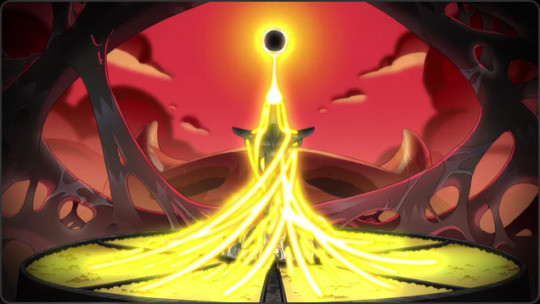
Belos is also a poster child for something I will never miss a chance to harp on about. The futility and self-sabotage inherent in evil and cruelty.
He could have kept his trap shut. He could have told the collector to wait until after the draining spell. He could have kept the collector in his lab where he could see them. But no, he knew he had already won, so he chose to gloat, and that directly caused his demise.

The collector defeats Belos. They didn’t have a reason to hate him until he threw them off a cliff, and they didn’t have a way of getting free until he gave Kikimora a motivation to lead king to them. Belos is an eejit who claims to be a mastermind but is in reality just willfully ignorant.
That’s his dichotomy with Luz. Curiosity vs ignorance, kindness vs cruelty, expression vs restriction, freedom vs control, knowledge vs power.

Blight robots are instrumental in the end of the world. The rich industrialist has doomed the world for power. I am shocked.
To me, it is important that this doesn’t just affect Belos.
You can’t educate someone whose mind is closed, sure. I agree with that sentiment. You will just cause yourself more misery. However, their anti-intellectualism will actively do you harm as it will make the world worse, so you need to combat them in some way shape or form.
Facts and logic don’t work, so Luz has to appeal to his emotions to just stand in the same room as him. When that fails, she has to fight him outright.

Making a deal with the villain while half in shadow and half in light. Presenting the lit side openly while the hand in shadow is also hidden behind Luz's back to signify duplicity. I think there's some symbolism here but I just can't quite figure it out.
Speaking of whom, Luz is a mess this episode. She is trying to get herself killed, and that matches the rest of the isles. There is not going to be a tomorrow, there will not be another episode after this, so everyone is trying to go out in a bang.
Except, there is a tomorrow. There is momentum that has to go somewhere, and the only direction it has is forwards.
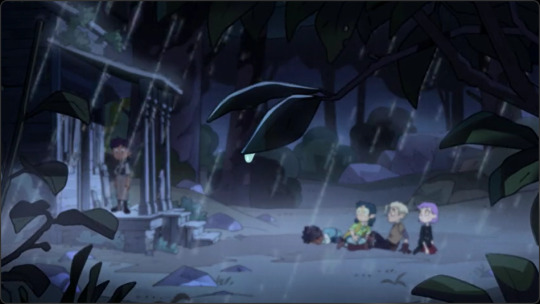
The final moments of this season, and of The Owl House, are of the brutal realisation that life keeps moving. You have to treasure the moments while you have them, because if you keep fearing the future, it will come, and you will have missed every opportunity to do anything about it.
That is a through line in this entire episode. The future is not what you expect. Every plan fails. The draining spell, the rebellion, the coven heads’ plan for paradise. Everything goes pear shaped. The future is never what you expect, just treasure the moments you have, and roll with the punches.
Always try to make the world a better place, don’t get me wrong. The show firmly takes the stance that evil can and should be fought against, but two things can be true. Treasure the moment and change the future are two phrases that must stand side by side.
And yes, that has been the theme of The Owl House as a whole, hasn’t it? Luz has been afraid of returning to the Human Realm because that signifies her future and maturity, meanwhile the Boiling Isles is the moment she is in, the treasure that she is missing out on because of that fear of the future. She can’t make a decision, so life chooses for her.

But rewind a bit. This episode is a masterclass in building dread.
Everything in this episode is pointing towards the one end point. The A and B plots are perfectly aligned in this episode. Both are trying to stop the spell, they are just in two different locations.
Usually, these disparate storylines are separate, with one usually acting as the main story while the other provides comic relief and supplements the themes.
Find me a joke in King’s Tide. There are exactly two. One at the start with Amity and finding out about her nickname, and the second at the end with Hunter’s expression when faced with the collector.
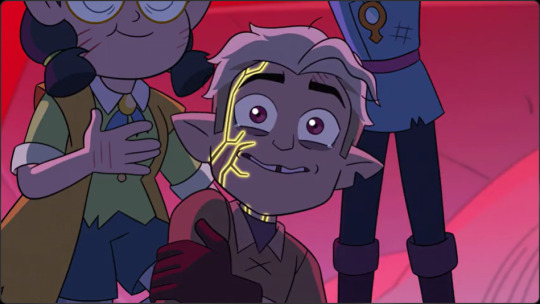
You will note that neither of these are particularly funny, but Hunter’s reaction to cosmic horror will draw out at least a smile because the entire episode leading up to it renders that moment hilarious.
Eda tries to find humour, but that actively worsens the mood because it draws attention to how out of place her comedy is. It’s not funny because of its context.
However, there is another plotline. Let’s call it the C plot, and that is King and the Collector.
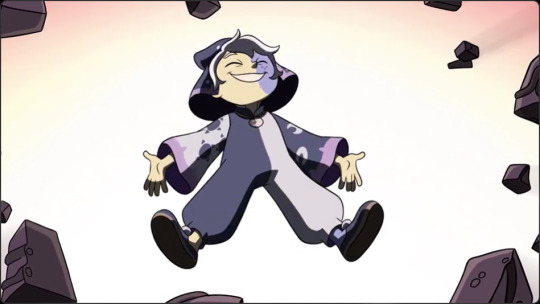
This should be a deus ex machina, or god from the machine. This should break the story, the hand of the author shown to get the protagonists out from the corner they have been written into. But it isn’t.
We have seen King discover the Collector over the past few episodes. He hasn’t known what they were, but the two have been shown to be connected.

Now, we see all the dominos slot into place, then start falling. We see King, Kikimora, and the Collector all arrive in the same place, and we see King drastically misinterpret the power of what he is dealing with.
But I want to be clear here, why would he know better? Why would anyone know better? As far as he is aware, this is something that can stop Belos, and he needs a Hail Mary. What would you do if you were given those two pieces of information?
Add to this that he is a literal child who isn’t in the best place mentally because he has just had his entire world shattered by the revelation of his species. Of course he would make this decision. This isn’t a plot hole, it's an inevitability, that’s what makes it so tragic.
Everything moves forwards towards one event.

Pause. Could you please do me a favour? Raise your hand and move it as fast as you can in one direction, then try to stop it in place. Be sudden with the start and end, and take note of how it feels.
Take a moment.
Thank you.

You will notice that stopping moving feels weird. It’s shaky, and there is resistance to you stopping. At the risk of oversimplification, this is momentum in action.
Energy builds up and it needs somewhere to go, everything moves forwards, to where? If you stop the series, what happens to that energy?
In this case, it gets dispersed amongst the fans and then picked up later.

The Owl House was finished. The show ran its course. But then it got brought back to life, and that changes my reading of its purpose.
Perhaps I read this as the finale to the entire show. Life happens, deal with it. Consider this a warning.
Perhaps I read this as the finale to a season, setting up stakes for a final sprint.
Or perhaps I read this metatextually.

I think that The Owl House got revived in no small part because of the sheer drive behind King’s Tide. If I namedrop almost any other episode of this series, you will have to look up what happened, but King’s Tide is burned into your brain.
Maybe if you know the series off by heart you will do better, but for the majority of fans, Hollow Mind and King’s Tide are pretty much it.
King’s Tide built up energy, then gave it to you and ended in a way that was pointedly unsatisfying. It said “we aren’t done, and you can do something about it.” Yes, the characters are great, but The Owl House came back because it wasn’t finished.
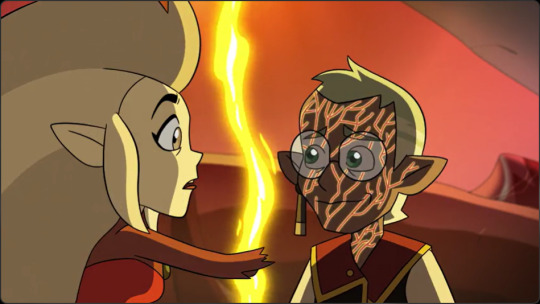
This is a solid minute of shot after shot, each of which I could analyse individually for hours on end. But I linger here. It's a small thing, but it's the smile. The only time Raine smiles in the entire episode. They have saved Eda's life, and sacrificed their own, and they do not regret it one bit. But also, the light of the ritual cuts through their relationship, tearing them apart and as Eda tries to reach across that barrier, it burns her. She is forcefully separated from Raine, and she is powerless except to watch them fall.

Then there is this, the lives broken by machinations of people who don't care. The stories sacrificed for one man's game. The tears of tragedy.
There is a lot to meaning, and you can’t truly grasp authorial intent until you have seen everything they have laid out on the table. But you can draw conclusions based on what you have seen so far. That’s why theory crafting is so much fun.

So, going into the final season, here is what I want you to keep in mind:
The Owl House is about freedom. Freedom to be who you are without fear of bigotry and xenophobia. It is a fundamentally queer story more than just a story with queer people in it.
The Owl House is about knowledge and change. Luz’s journey isn’t over yet, and now she has to learn about the world she came from, the world she willingly left.
The Owl House is about hope. Things are bad, but they will get better. Everything can always get better. The point of no return is called the end, and we haven’t reached it yet.
Light, do not faulter.

Final Thoughts
There is so much to this episode that I want to talk about but I haven’t formulated thoughts on properly.
Like, Eda and Raine’s scenes with their more unsubtle visual storytelling techniques of memories and a big ol’ crack in their relationships as Raine passes out. I don’t have anything to say about that other than look at it, but it makes my brain buzz.
Similarly, everyone else with a coven sigil passes out, and yet Hunter, a child, is still standing despite it all. He’s obviously about to fall at any moment, but he is still gritting his teeth and facing down Belos. Once again, I this doesn’t relate to my point, but asdfghjkl.
Next week, I will not be covering Thanks To Them, and instead will be discussing the missing years. i.e. the fanart and fanfiction that kept the show alive until its re-emergence.
Stick around if that interests you.
Previous - Next
#rants#literary analysis#literature analysis#what's so special about...?#character analysis#the owl house#toh#toh belos#toh luz#luz noceda#owl house#belos#philip wittebane#soundgarden#superunknown#black hole sun#long post#meta analysis#meta
19 notes
·
View notes
Text
The Thesis Knows Where You Live (Destiny Part 1)
She-Ra is a series in no small part about tragedy. It is cyclical, built around a spiral of abuse that drives people to their lowest points. This is a story in which the narrative itself is a force in the story and exerts its will on the characters.
There is another word for this, trauma. Or more accurately, the scars left behind. Physically, yes, but more often than not these are mental refractions of actions and consequences.
As a result, the narrative usually displays itself in subtle ways. The set design influencing the characters’ moods, the coincidences that happen at just the right time to disrupt entire character journeys. Most obviously, in the abject fear that corrupts everyone’s motivations.
But, what if we wanted to get more clear with it? What if the narrative got frustrated with how well everything was going and decided to flip the table entirely?
Then you get an episode as gloriously unsubtle as Destiny Part 1.
Let me explain.
SPOILERS AHEAD: (She-Ra and the Princesses of Power, Lord Of The Rings)

I want to start with context. As in, why is it that the show feels the need to be this heavy handed with its themes.
Most blatantly, this is the penultimate episode of the series’ “darkest hour season”, so it’s going to be dark and have dark themes and have time be a significant element and have themes around time running out.
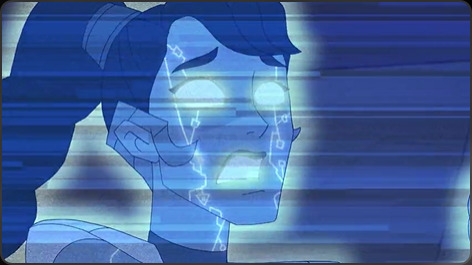
However, it is also reactionary. I think the story itself is an antagonist. Tragedy is something to escape from (hold this thought), and assigning a will to it allows it to take steps to keep the protagonists held within it. Although I want to be clear, I don’t think this is a conscious character, I think it’s mora aligned with the setting. It is a force of nature; it is the world itself.
Because of this, I think that will is trying to gain a foothold on the story in the same way that gravity reacts to a ball being thrown in the air. It tries to bring it back down, and there’s a little more nuance to that metaphor.
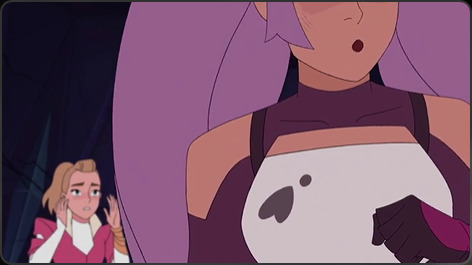
The bluntness of this specific sequence is a display of what that kind of writing can do. It telegraphs that it's hiding Entrapta's eyes from you and continues to do so for several minutes. It builds dread and suspense. Also, remember this specific type of shot.
Now it’s time for “Writer explains Physics to the internet”.
So, gravity is magic that is always acting on a thing. It pulls the little thing towards the big thing but it doesn’t stop pulling. The reason the ball comes back down isn’t because gravity didn’t notice you throw it, it’s because the force of your throw was momentarily stronger than the force pulling the ball down. As time passes because of other magic such as air resistance and physics, the ball loses upwards power and the gravity, which stayed constant (I think) eventually becomes the stronger force.
I am fascinated to know how much of that I got wrong.
The point I am making here is that the will of the tragedy was constant. The characters nearly escaped, they got pretty far, but then they lost momentum, and began to fall back, gaining more and more speed until we hit this episode, at which terminal velocity is achieved, and the ground is closing in.
Essentially, everything is going pear shaped and getting worse at approximately 9.8 metres per second per second.

I love the mask as a character design element for Entrapta. It's a facade, but it's cracked. She is presenting a brave face, but its fractured. Specifically, it is a break that disrupts her vision. She needs to take it off to see properly.
Speaking of which, Beast Island.
Last episode, I presented the hypothesis that Beast Island is the dumping ground for First Ones technology as a metaphor for that cycle of abuse on a grander scale. I.e. the first ones didn’t care about Beast Island or Etheria, they just needed a place to store their baggage.
In this episode, Entrapta looks directly at the camera and agrees with me.
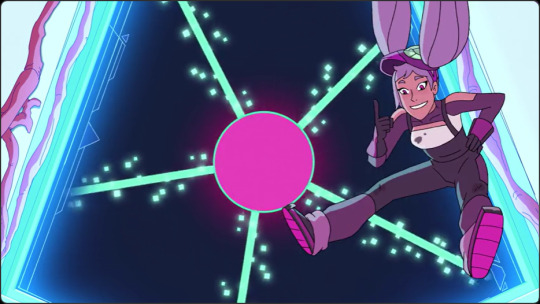
The Heart of Etheria is a nuclear weapon. It’s a bomb that can destroy anything it wants, uncontrollable, self-destructive. It is unsubtle and unnuanced in every aspect. It doesn’t care who is nearby or who it is fired at, it will just destroy them. Just enough warning to know you are buggered, then nothing.
It's the inherent cosmic horror of humanity. The fact we are capable of caring makes it so much more terrifying when we actively do not on such a grand scale.
The thematic implications here are obvious. The first ones didn’t care. They were self-destructive but found a loophole. Instead of sacrificing themselves, they found someone else to do it for them.
No specific example is given for why Etheria was chosen of all places. Magic exists elsewhere, but Etheria got picked because it was the most convenient. The First Ones didn’t have any grievance against the planet at all.
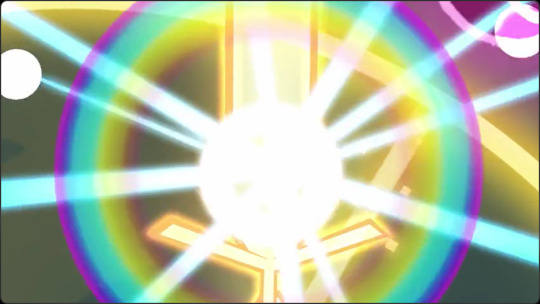
They didn’t even create She-Ra. It was just the first being they found who could last long enough to fire the weapon before she was vaporised.
A foreign power came to a place to mine a resource they wanted, then appropriated and corrupted a deeply significant element of that place’s culture and used the place as a pawn in their own schemes, giving no attention to the people who actually lived there except through the lens of coldness and usefulness. Once again, there is a word for that, and this time, it’s colonialism.
Which is actually a bit weird. Because the First Ones and the Horde were and are unaligned. I don’t believe it is stated directly, but it is heavily implied that those two were the ones fighting in the first place.
The reason I say this is weird is because in stories, sides in conflicts on this scale are usually thematically distinct. There is usually a clear good and evil.
In Lord Of The Rings, there are a lot of ideas going on, but one key theme is free will in relation to war. The Uruk-hai exist only for battle, and have no say in their purpose, while the heroes have something to protect and something to die for. The Hobbits are the embodiment of creature comfort. Hearth and home vs conquest and conflict.

Look, it's this same shot again. One character in the foreground, one in the background. Both showing their emotions plainly but neither able to see the other. Dramatic irony and secrecy. This episode uses this shot a lot.
But the Horde is signified by empire and colonialism. The visual in Princess Scorpia of the family crest graffitied with the Horde logo comes readily to mind.
Having the First Ones mess around with the same theme muddies the water.
These are two sides; the relativity is almost irrelevant and Etheria just got caught in the crossfire. If the nuclear weapon signifies the cycle as also relating to the war, then Etheria represents the common soldier. The person who is told to die for someone else’s cause and that they will be a hero if they do.
Alternatively, Etheria might be a representation of the land itself, scarred by bomb after bomb, riddled with trenches like cuts across a corpse, each full more of blood, flies, and rotting flesh than anything else under the moon. It is the field of poppies, trying desperately to grow, but unable to shake that crimson from its mind.
If the land is a character, it is capable of being harmed, it is capable of being hurt, and it is capable of being traumatised.

Not so subtle detail: Entrapta rises slightly when she tells Adora about her lack of agency. The shot is looking upwards when it receives the news to make that information seem more powerful and imposing. This plan is bigger than Adora, and the show wants you to be afraid of it.
It was true that the relativity of the two sides didn’t really matter, because to Etheria, these are just two colonial forces who want to use it.
What if the Heart of Etheria was a defensive project? Does it matter?
Thematically, yes.
If the project was defensive, then we are led back to our claims about the cycle of abuse. The First Ones wanted to protect themselves, and in doing so, destroyed someone else. They sacrificed Etheria to set themselves free, passing the torch somewhere else, and leaving naught but memories in their wake.
And it didn’t even work!
The First Ones are nowhere to be seen. Their grand scheme failed; they lost the war. Their reaching for safety did nothing but cause more misery and it didn’t even get them out of the hole they found them in.

That is the cycle of abuse in a nutshell. Victims trying to save themselves in the only way they know how, with faulty tools that don’t succeed, and to everyone around them, to Etheria, the difference between victim and abuser is sometimes not even a different face. Thematically, the difference matters, but practically, it couldn't be less important.
Violence begets violence, the only way to stop, is to stop fighting.
But then you would lose, right? Kneel down and let tragedy overtake you? No!
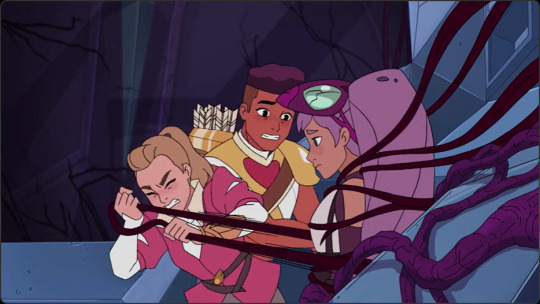
That is the mindset instilled by the vines in Destiny Part 1, just shut up and let destiny run its course. This frames the idea of “just stop fighting” as something said by abusers to their victims, which becomes a Catch 22.
You either fight, in which case you lose. Or you don’t, in which case you lose. It’s a trolley problem.
But I’m going to let you in on a secret. Trolley problems are contrived as all hell. They are engineered to be as simple and unnuanced as possible, and while these situations do exist in real life, I will wager that there is always a third option. It will be more difficult, sure, but it’s possible. Trolley problems feed on a lack of hope, the trick is to let them go hungry.
In this case, don’t stop fighting, change how you go about it. Learn from the cycle, do better. You don’t find peace, you make it. So, find a way to do that.
In other words, take the initiative and start to exert your own will on the story around you, which leads me back to the poppies, to the gravity, and to the tragedy.
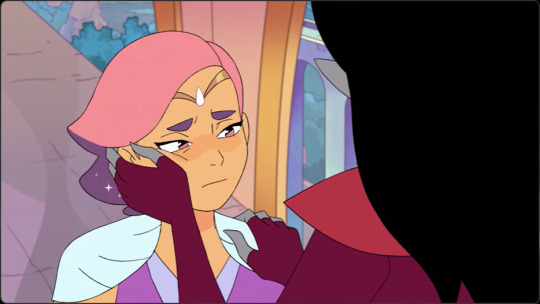
Shadow Weaver has just had the rug pulled out from under her, so she is resorting to her old tricks to try and gain back control.
Poppy fields are some of the most humbling things you will ever see, especially on the site of a battlefield. They are the only things that can grow, but they symbolize that the earth is still trying to change. The seasons still march on, and more will come.
Yes, they are wounds, but they don’t run from them or fight them, they bear them like a badge of honour. They remind you of what happened here, they make you think, and they stare you dead in the eye when you try to set up another battle. You may have forgotten, but the land remembers. It will remember every step you take; it will welcome you when you fall, and it will stand warden over your soul. Never again.
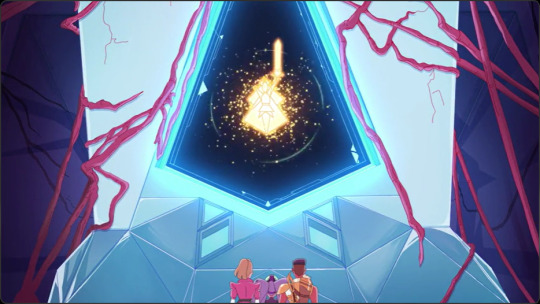
Again, scale. This plan is bigger than Adora and Bow. They are powerless against it. That makes it scary, but it also works like a Darksouls boss. The bigger they are, the harder they fall, and the more satisfying they are to defeat.
Keeping that in mind with gravity, because I know at least one person who will read this and take issue with my explanation. Gravity doesn’t pull the small thing towards the big thing, it pulls them together. It just finds an average spot between them. The bigger the thing, the more influence it has and the closer that average location is to it.
If we finagle a bit and substitute physical size for impetus within the narrative, or more simply, agency, then the idea of outgrowing your trauma has a new meaning, doesn’t it?
You will meet in the middle, drawn closer and closer as you lose your ability to move. But if you grow and gain power over your own life, eventually that trauma will orbit you. It will be a part of you always, but it won’t be something you revolve around, it won’t consume you. You are still pulled together to meet in the middle, but you control where that middle point is.
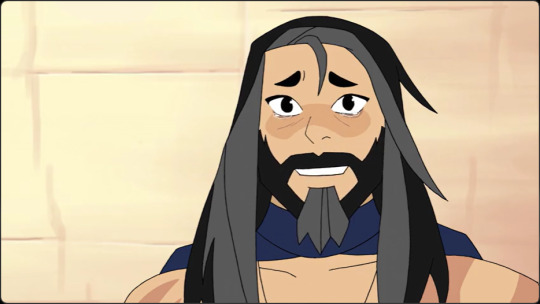
Daniel Dae Kim is a global treasure. He kills every line and thrives in bombastic moments of drama and comedy. Which is why I want to highlight the smallest moment. Specifically, the tiniest of wavers when he says "Brightmoon". Genuinely one of my two favourite lines in the entire series.
Finally, there is tragedy, and here I want to set up the finale with some framing. As in, why do we partake in tragedy? I claimed that the genre is something you escape from, and if you are in a tragedy, my advice will always be to leave. But why do we watch stories we know are going to end well?
Even more peculiarly, why do we enjoy doing it? Tragedy is definitively unfun. So why are they so popular?
The answer is catharsis. You read a tragedy because it makes your world better. Stories aren’t moralistic tests, they are just ways of communicating, and most often, what they are communicating is “this is interesting.”

You read stories to make you feel, and in my opinion, the best part of a tragedy is the moment you stop reading. The story makes you emote in a controlled environment, and you get the best of both worlds from those emotions being both real and not real. They are real in the way that you felt them, but they are unreal in the way that they won’t affect you as much as if you had experienced the heartache.
You feel the joy of escaping from traumatic behaviors, but you didn’t have to live through that trauma to get there.
The moment you stop reading is the moment you realise it isn’t real and that you can go about your day. The story has changed you, and now it is setting you loose on the real world.
Your objective is to leave, the tragedy’s is to come with you.
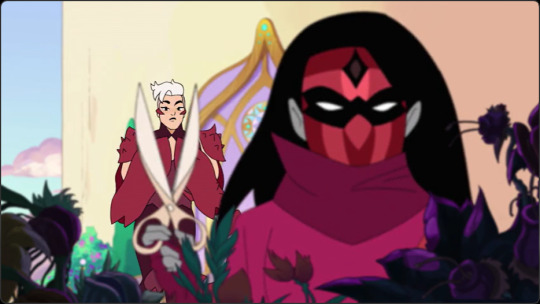
Final Thoughts
I want to be clear here. Subtlety does not equal good or bad writing. There is a general rule these days, especially on Tumblr, that complexity and effectiveness are the same thing, and I think this is bollocks.
Firstly, this is partly because people can’t tell the difference between subtlety and subtext, which is frustrating. Subtlety is a tool that you can use, subtext just happens whether you like it or not.
But second, this is Tumblr. People talk nonsense all the time. Some of the best posts on this website are a sentence of someone being as blunt or strange as they could possibly be and either being incredibly insightful or incredibly funny. Writing is about finding the right tool for the job. Sometimes that is a wood chisel, sometimes it’s a chainsaw.
Next week is the finale of this season, with Destiny Part 2. Stick around if that interests you.
Previous - Next
#rants#literary analysis#literature analysis#what's so special about...?#character analysis#she ra and the princesses of power#spop#she ra#she ra king micah#she-ra first ones#lotr#meta#long post
21 notes
·
View notes
Text
Complex Motivations (You Didn't Know)
Hazbin Hotel is about redemption, and a large part of that is the complexity of motivation. Sinners have unique reasons for what got them into hell, and that intricacy is explored in great detail with the main cast, but also everyone around them.
This is actually a mercy extended to the villains. Because contrary to popular belief, having a reason for doing what your doing doesn’t make you right. The Vees, for example, are characterised entirely by their dynamic with each other, and understanding their motivation means understanding just how cruel of a person Valentino is, for example. It doesn’t justify his actions, it explains them, and makes him a more complex character than “he does bad things because he is bad”, a mentality that the show criticises at every opportunity it gets.
Speaking of which, that reductive worldview is exemplified by the folks up in heaven. Specifically, by Lute, Adam, and Sera, and You Didn’t Know exists to show them on a sliding scale of villainy, and how their place on it doesn’t matter.
Let me explain.
SPOILERS AHEAD: (Hazbin Hotel)
CONTENT WARNING: (Language)

“But she was right”
The first words in any story give context to what is to come. They set up the plot, provide a question or mystery, and establish pacing. Songs in musicals are parts of the story told in microcosm, and so they apply these rules. In this case, it is important to understand that each of these people has been proven wrong.
Their worldview is measurably false, and the question is, what do they do now?
This isn’t a presentation of ideas, this isn’t a philosophical debate, this is an exploration of character in the face of challenge, and how it exposes a person's true motivation.
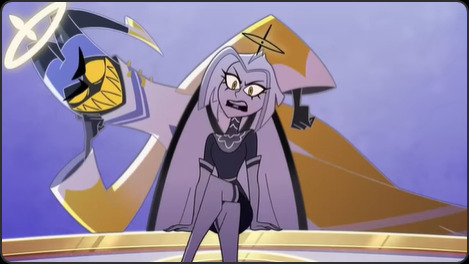
Starting with Lute, because she is, in my eyes, the simplest. She believes everything that she is saying with no one hundred percent certainty, and it’s almost refreshing in contrast with everyone else.
Adam and Sera are both fickle in morality, but Lute is rock solid. She is bigoted and evil, and she is owning it. She is, for lack of a better term, a paragon.
“What are we even talking about?
Some crack whore who fucked up already?
He blew his shot like the cocks in his mouth.
This discussion is senseless and petty!”
Why are we having this conversation? Angel Dust is a sinner, therefore incapable of making any points. Any evidence presented is invalid because he’s the one presenting it.
Redemption can’t be proven because redemption doesn’t exist.
It’s a flat, mindless understanding of the world that a lot of people carry, more than you think.
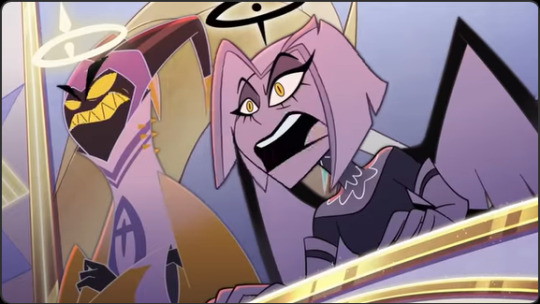
Dutch angle. These two make the scene unsafe. Standard filmmaking but worth pointing out.
This is called Doxastic Anxiety, according to the philosopher, Jenifer Foster. I recommend her dissertation, as well as the video by Philosophy Tube (@theabigailthorn), which discusses it in the context of deliberate ignorance, amongst other things.
Doxastic Anxiety is an aversion to forming new beliefs. In this case, Lute doesn’t want to believe that redemption is possible, so she, quite efficiently, doesn’t believe.
This isn’t an argument or a conversation, this is one side presenting evidence, and immediately getting shot down with “shut up, I’m right.” You can’t change the mind of someone who refuses to open it in the first place.

This is matched by the music itself. I’ve talked at length about Adam and Lute’s obsession with rock music and what I think about that, but there’s a gaping hole in Lute’s argument here.
The drums are doing something interesting, and I will come back to them later, but the guitar is remarkably restrained, which isn’t what you would associate with rock at all.
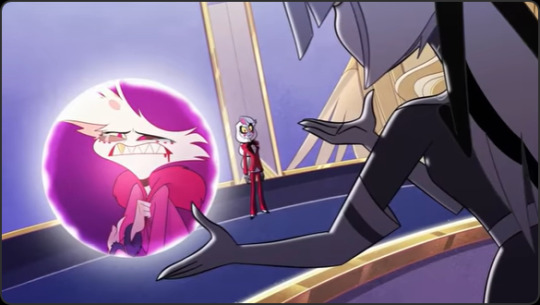
There's some colour symbolism here that I love. Traditionally, there is a correlation between good and evil, light and dark, white and black. Those three categories align and while there are implications there, it is storytelling standard. Except here, in this scene, the brightest part of the shot is the window into hell, and because of the shadows rendering lute in grayscale, the closest things in the scene to pure white are Angel Dust, and Charlie's hair. The filmmakers are messing with morality, so naturally, they can't resist a chance to mess with the imagery thereof. Also interesting here, the shadows are of the Angels own making because it is their architecture. They aren't just made to look bad by contrast, it's their own actions that lead to this symbolism.
Music is emotion, that’s why character playlists exist. Songs convey themes through vibes, and rock music is about big, unrestrained emotions. Rock music is fundamentally wild.
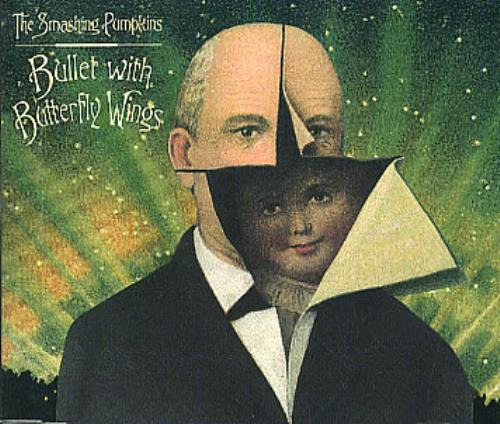
Consider Bullet With Butterfly Wings, by the Smashing Pumpkins. The song is about anger at an inability to claim freedom, and so the guitar evokes the pacing of a caged animal during the verses, then comes out swinging in the chorus only to, for lack of a better term, fumble it. The resolution at the end of each musical phrase is clumsy, like falling back to square one. The final chorus, notably, doesn’t do this, and is much more comfortable, evoking a feeling of catharsis that contrasts with the lyrics of the chorus.
“Despite all my rage,
I am still just a rat in a cage.”
Powerlessness. The character is trying to claim freedom and has transcended their anger, but it hasn’t worked. The finale is desperate, and the music thrashes against its bars, trying to break either them, or itself, all while repeatedly screaming the words:
“And I still believe that I cannot be saved.”
Maybe the bars are more than just physical. Maybe there is a psychological element to this kind of oppression.
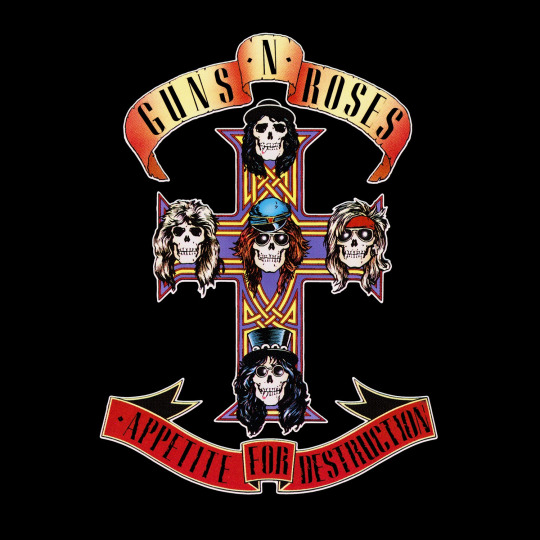
Even Sweet Child O’ Mine, by Guns and Roses (they’re a small, up and coming band. But I think you should check them out. There’s promise there) which is calm and reminiscent for most of its runtime, is built on being dynamic. The iconic riff famously bounces between highs and lows to mimic the highs and lows of a life lived.
It’s messy in the way that memories are messy, and the solos are wild and meant to be experienced more than just listened to. They chomp at the bit during the lull at “where do we go now”, before climbing back into soaring expressions of glee and, for lack of a better term, raw power. It’s a very different emotion to Bullet With Butterfly Wings, and you don’t need the lyrics to understand that.
The point I am making is that rock music is intrinsically expressionistic and unchained, and when Lute sings, her portion of the song is anything but. Lute is angry, and appropriating imagery that is not hers to use to justify that anger. But what is the anger at? Being proven wrong.
Case and point, her guitar is simple and even. It rises, then stops, then repeats, then plays a nice little melody at the top, before resorting to power chords. She has tried to form a point, but has been unable to, and instead of examining that, has resorted to anger and displays of force.
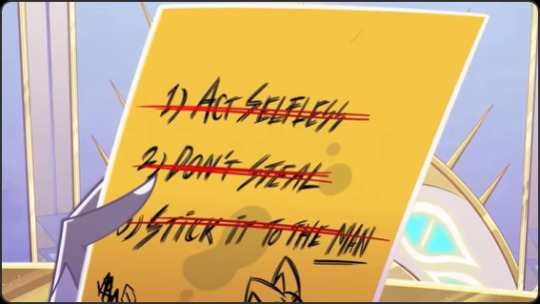
There is something in that "stick it to the man" thing. People in power almost seem to fetishise rebellion, but when it actually happens, they get all upset. Adam likes to appear as the underdog, and I think he likes to feel like the underdog, but he isn't. He's the one the underdogs are fighting.
Moving on to Adam, who doesn’t believe anything he is saying. He is doing genocide for entertainment, and he doesn’t care about justifying it. There is nothing behind this man, he gets what he wants because he wants it. He is a man child.
He has also already had his views explained in detail, so this song gets to shine as a character beat for him, because of the aforementioned framing device. What do you do when you are proven wrong? Do you change? Do you shout down what the person is saying like Lute? Or do you get petty and start being an arse because you can?

This is where we see Adam’s vindictive side, and it sure is a coincidence that the guy who champions retributive justice has a habit of taking what he views as revenge and multiplying it tenfold. That’s probably not important.
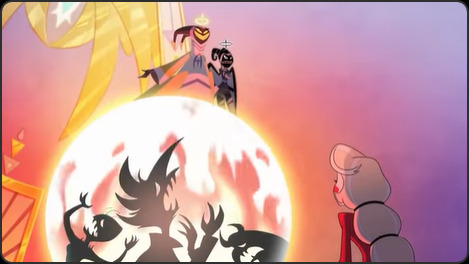
Anyway, this is used to bring up Vaggie’s deceit, but it also exposes something interesting about Adam’s villainy. It’s innately self-sabotaging.
Adam could have kept his gob shut and this would have gone off without a hitch, but he didn’t. His villainy is based in retribution, and so he had to dish it out when he was slighted, even if it undermines his greater scheme.
Which, if I may get a bit soap boxy, is how villains work in the real world.
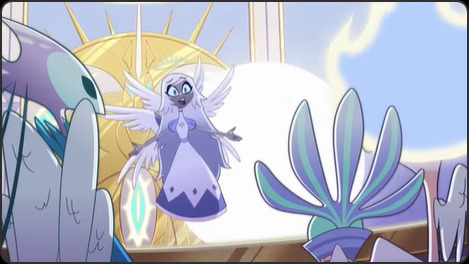
I get frustrated with the view that kindness is hard and that being awful is easy because it isn’t. Don’t let people tell you the world is naturally terrible, because if you believe them and expect the worst, then you don’t call people out on their nonsense. “Oh, the world is bad, it was the easiest choice to do this awful thing.” No! It took a choice to cause suffering, someone made that decision.
Evil is difficult and self sabotaging and will wreck you for doing it to the point where it stops being worth it. Truly evil people are those that make the decision to do what they are doing because they have weighed up the consequences and decided that they don’t care.
On a day-to-day level, kindness is easy. It costs you nothing. Don’t use the mundanity of misery as an excuse for your own shit behavior, and call people out on theirs because they are actively making the world worse, not prolonging the status quo.
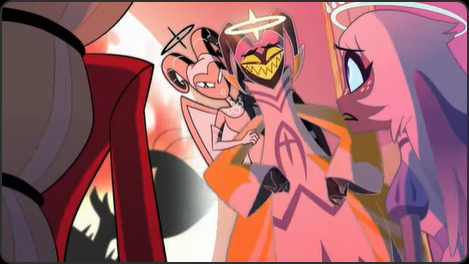
But on a grander scale, this is where Adam comes in. I would argue that it would be easier for Adam to not do a genocide. Like, it would be easier to just sit at home, drink soft drink, be a tosspot. He wouldn’t be a nice guy, but it would be an improvement.
But to do what he is doing right now, he had to come up with the idea, something that probably took him a while. Then he had to persuade Lute and the other executioners, which probably took less time. Then he had to run it by Sera, and then he had to amass an army in secret and keep that same secret of genocide from an entire population.
But he did. He went above and beyond so that he could kill people for sport.
Adam actively made the world worse, and crucially, that directly led to his death later on in the series. He gave people motivation to want him dead.
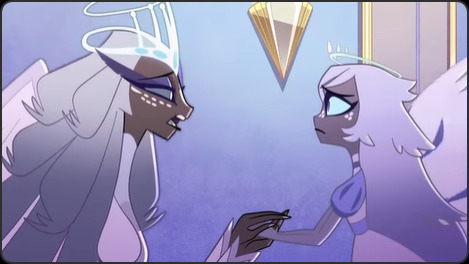
I mentioned at the start of this post that the sliding scale of villainy doesn’t matter, and that brings me to Sera.
Sera isn’t evil. She doesn’t directly cause bad things. But that “directly” is doing a lot of heavy lifting, because Sera is an enabler. She doesn’t have a moral compass at all. She doesn’t stand for anything, so she lets everything happen.
She doesn’t do the genocide, she doesn’t want to be a part of it, and she thinks that makes her a saint. But then again, she had the power to stop it, and the choice to do nothing is still a choice.
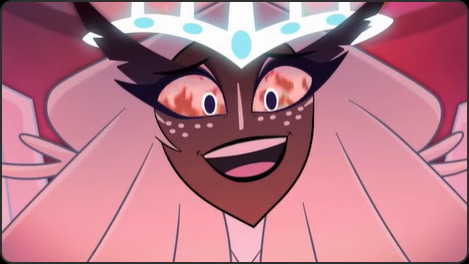
General lump of ice for anyone who wants it. If you ever find yourself smiling like a maniac with literal hellfire reflected in your eyes, maybe reconsider your life a bit.
Sera could have said “no” and been done with it. But instead, she signed herself up for a lifetime of subterfuge because it seemed easier at the time. Theoretically, Sera isn’t as bad as the others, but in practicality, oh yes she is.
Sera’s lack of morality is actually what inspired me to analyse this entire musical, because her part in this song is so crucial to my understanding of the musical as a whole and I haven’t seen anybody else’s reading factor this in at all.
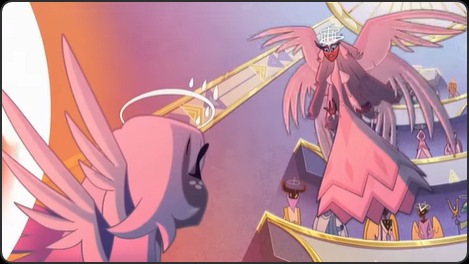
“I thought cause I’m older,
it’s my load to shoulder.”
“No”
“You have to listen,
it was such a hard decision
I wanted to save you
the anguish it takes to
Do what was required…”
Sera doesn’t defend the genocide; she defends her decision to lie. Even when called out on it, it doesn’t occur to her that the murder of civilians is what people are upset about.
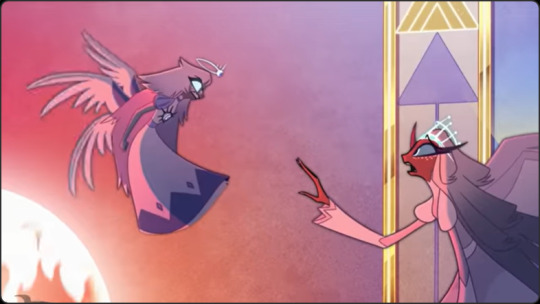
There are two possible readings here, the first being deflection and the second being indifference.
Deflection is simple. She gets called out for murder and she apologises for lying. That’s not remotely the point, but if you can get someone tangled up in an argument that they didn’t sign up for, you can twist their words into something they didn’t mean.
Anger is a volatile emotion, but it can be lead astray. Deceit is not an easy thing to justify, but it’s a lot less difficult than systematic oppression, so Sera might be steering the conversation to something where she is on slightly less of a rough footing.
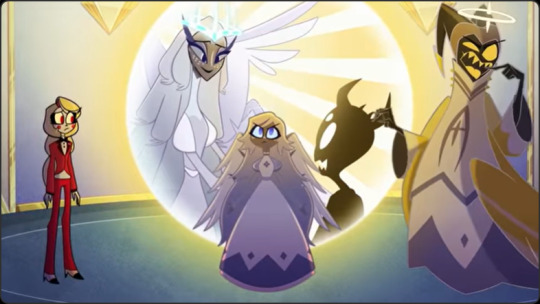
The other reading is indifference. Sera genuinely doesn’t care about morality, and so she is trying to keep her public face. She is the leader of… is Heaven a country? Is it a city? What is Heaven? Anyway, Sera is in a leadership position, and so she has made the decision to maintain her image first and foremost.
She spins the genocide as something that was required and starts defending the lie, because that’s what she thinks is most important. To her, the genocide was required, but to that I ask: for what?
Like, what is the end goal here?
Adam has presented the idea that the genocide makes him feel good. Lute is of the opinion that the sinners deserved it. But Sera says “required.” For what?
Is she required to let Adam do what he wants? Is she trying to find a middle ground between “no genocide” and “yes genocide” and landing on “some genocide”?
Alternatively, does Sera think it is required to keep the population of Hell down, so they don’t rise up? Does she think this is needed for her own security? Is it for control? Because, if that’s the case, I think she is talking bollocks.
You don’t need to murder someone to not feel threatened by them, and there are better ways of coexistence than control.
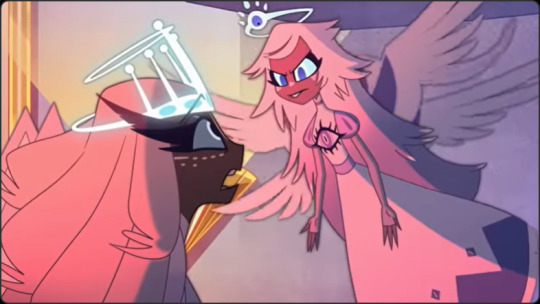
Sera returns to what I said earlier about villainy being difficult. She didn’t need to go along with the genocide. It wasn’t required. But she chose to, and that makes her stand alongside Adam and Lute.
Before I finish up, let’s talk about the drums.
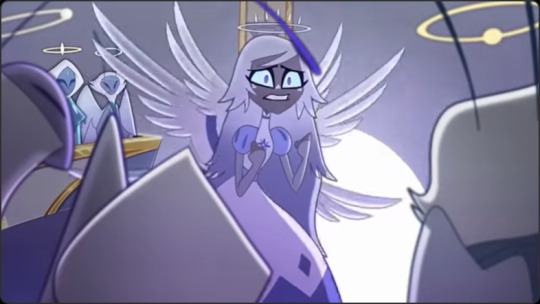
The song is dense, and has a lot of moving parts, so as a storytelling technique, the drums are really impressive. Not only to they separate the sections and make the story easier to digest, adding to the vibes of each part while keeping the momentum going, but they also join the sections with fills to ease the transitions between disparate parts of the story.
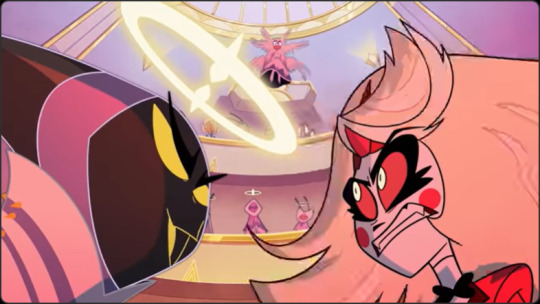
The song starts out with no percussion as Emily pleads with the court and specifically with Sera. Then Charlie brings some backbone to the conversation with the concept of fairness, and we get a steady, repeated beat, like boxers circling each other.
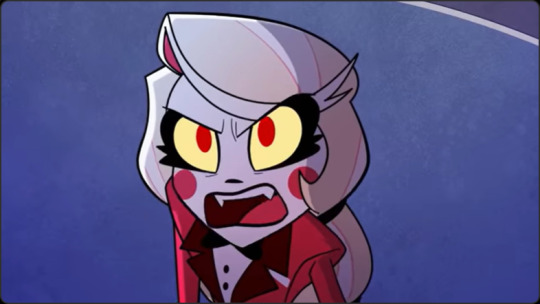
We get a fill into the marching beat that backs up Lute’s solo, before a chorus from a rock song follows Adam’s input in the conversation. So far, so good.
Then Adam ruins everything, and the song abruptly cuts back to Emily, who suddenly has percussion accompanying her voice. Although, it is off kilter and unsteady, unsure if it should be here or not. It’s uneasy as Emily tries to work out what is happening and how to feel. Something is wrong, and her music is evolving to keep up.
Sera’s section messes with this in a way I love. Starting off mimicking Emily’s exactly with the unsteady beat as if to say “I’m with you.” Although it adds some bass drum, specifically the rhythm played during Adam and Lute’s chorus.
Then, as she says the line about doing what was required, Emily’s rhythm cuts out entirely to show the falseness of this offer. Sera and Adam are entirely aligned here.
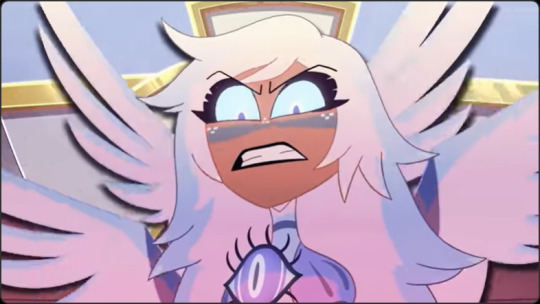
Emily is back, and her rhythm is gaining more and more confidence as she gets more and more angry.
“Was talk of virtue just pretention?
Was I too naïve to expect you…”
We’re building to a final chorus, and we get a quiet fill before a surprisingly understated chorus.
“If Hell is forever than heaven must be a lie.”
The perfect world is built on suffering, which means it can’t be a perfect world. Everything else falls away, including the drums, into short punches that are just off beat enough to feel natural. This is just brutality. Messy, unrestrained, hammering. This is the point; this is the centerpiece of the musical.
Then the drums cut out entirely for the final moments to underscore the revelation, and the song wraps up.
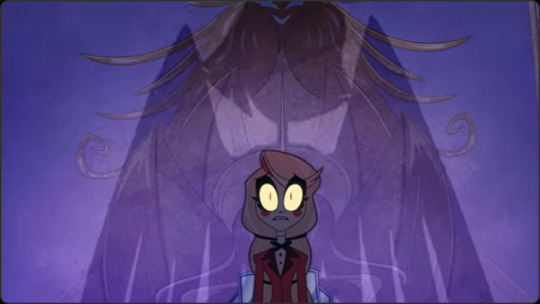
Final Thoughts
I’m about to spoil the rest of the musical, so be warned.
I want Sera to be redeemed so much, and I actually think it might happen, here’s why.
First, I think it would be funny. I think Sir Pentious being in heaven would be an excuse to torment her into changing. Like, she gets so frustrated by the snake boy who’s voice she recognizes for some reason, and who proves her wrong so entirely, but whom she can’t escape from and whom she can’t bring herself to dislike.
Drag the angel, kicking and screaming, into being a better person. Commit to the theme, damn it.
But I do think there is a chance of this actually happening, and that is because of the expressions that Sera makes. When Emily snaps, the show makes a point of showing Sera’s response, and it is abject horror and sadness. There is no anger or spite there, it is just shock and terror.
A sinner couldn’t convince her, but she is willing to listen to Emily, and that is the expression of someone who’s entire world just came crashing down.
Maybe it’s the fear that Emily will fall like Lucifer, or maybe it’s the fear that she won’t. I cannot wait to find out.
Next week, however, is Out for Love, and I have thoughts about that song. So stick around if that interests you.
Previous – Next
#rants#literary analysis#literature analysis#what's so special about...?#character analysis#hazbinhotel#hazbin hotel#hotel hazbin#hazbin hotel sera#hazbin hotel emily#hazbin hotel adam#hazbin hotel lute#guns and roses#sweet child o mine#smashing pumpkins#bullet with butterfly wings#philosophy tube#jennifer foster
36 notes
·
View notes
Text
Sweet Victory (Clouds On The Horizon)
Ok how am I supposed to discuss this episode?
Clouds on the Horizon is fascinating from a thematic and analytical perspective. I.e. I could discuss how it implies tone or how it uses that to discuss the ideological conflict between change and stagnation. I could discuss how this episode both proves and disproves my point about genre being nonsense.
Or, I could talk about a single, twenty second moment and what it means on a scale so much wider than the show itself.
The question is, what do I do?
Both. I’m going to attempt to talk about both.
Let me explain.
SPOILERS AHEAD: (The Owl House)

“I'm gonna spend more time with my kids, get to know them. Things are gonna change after the Day of Unity.”
When I recommend this show to people, I recommend Clouds on the Horizon, and not actually for the scene you are thinking about. I recommend it for the conversation that King has with Alador.
Because Alador has been neglectful. He’s had a reason to be, sure, but that doesn’t change his actions. The man has missed all of his children growing up, not out of malice, but because he was going to do it later.

A dad sitting on a swing set he made years and years ago. He's reminiscing about times gone by, but those times never happened. He is alone with an empty part of his life.
Recently, the Nebula creator 12tone released a video about Henry Chaplan’s Cat’s In the Cradle. I believe it is also on Youtube so here’s a link to that.
The song is about a father never having time for his song and is relevant to Alador for obvious reasons.
It’s detached, and as 12tone explains, cognitively dissonant. The miracle of giving birth is not only described absent mindedly, but underscored by music that doesn’t convey much emotion. However, that “much” is doing some heavy lifting, because the song is nostalgic, and the moment the father realises he’s missed his ch
ance, all that emotion comes crashing through in the form of regret.
There’s also the chorus which reads like a nursery rhyme or a parable to make it clear that this song is something to be learned from.

“Let’s just say there’s not going to be an ‘after’ to the day of unity.”
Do you see the point I am making?

Alador messed up. He was always distant because he completely misunderstood how relationships work. Time is finite, people are like plants. They need sustenance, you need to take care of them. Give them sunlight, leave them alone when they need it, protect them from pests, maybe sing to them once in a while.
There isn’t going to be a later, Alador has just lost a large section of his life and that is time that he can’t get back. He has to start again, and the conversation with Amity at the Brawl was a start, but this man needs to realise what is holding him back.

I feel like Odalia gets a lot of attention for being the worst, and Alador gets praised for getting out of that relationship, and I think that is warranted. But it is incredibly difficult not only to realise that you messed up, but to stop and regroup and try something new.
At the start of 12tone’s video, he discusses the vibe of the song, and he does it in a very specific way.
“That feeling, not of loss exactly, but of having failed to build anything worth losing in the first place.”
Emptiness. That’s Alador’s emotion here. Emptiness. He did everything for his family, but they didn’t need everything, they needed him.
I really like the contrast in this scene. Alador and King discussing fatherhood from different perspectives, and neither of them knowing much about it at all. King just had the piece of information that could kick Alador out of his stupor.

Contrast that with the parental relationship of Eda and Luz demonstrated on the balcony.

There is a thematic parallel between the two scenes, that being the idea of change and future events. This season is about what happens next, and while that is a constant throughout this episode with the overt planning and scheming for what will be a chaotic 24 hours, it is made most obvious by Luz with her Palisman.
“I got to decide what my future looked like when I chose to be a witch, and I want them to have that option too.”
Luz is a paragon hero. I have discussed this before in relation to Monkey D Luffy, but I feel the need to restate it. Luz giving her Palisman a choice isn’t an active decision on her part. It’s not a conflict whether to pursue freedom. She just does it because why would she do anything else.
We see a lot of stories with moral quandaries and it’s a nice contrast to have a character for whom there is a correct answer and who is not going to budge on this matter.
Although, wind back the clock a bit. I said that Eda and Luz have a parental relationship, and there is something important here.
Eda views Luz as a child, Luz views Eda as a peer.

They really like this shot, don't they? They keep coming back to it, as if they are making a point. But what?
The Bildungsroman isn’t quite a genre. It’s a literary structure that blurs the line. It’s essentially a coming-of-age story with extra steps that aren’t important right now.
The point is that up until this episode, this series was nominally a Bildungsroman. It wasn’t, but it made attempts to look like one.

Luz has been growing up and maturing throughout the series. She has been learning that the world is more nuanced. But a key idea in The Owl House is that the stories don’t just stop. Characters keep going.
A key thing when you are a parent is that eventually your kids will grow up. And I can’t speak for any parents who read this, but as someone who was once a child, I find it is nice when I am treated with the dignity befitting someone who isn’t about to do something incredibly stupid.
Let me rephrase. I am about to do something incredibly stupid, but I know what I’m doing.
That specific wording is key here. I know what I am doing. I may not know what will come in the future, but I am cognisant of at least my own actions.

I don’t think either Luz or Eda understand that in the same way I do, and while I only pretend to be omniscient, I do think I am right about this. I think Eda believes Luz is still a child and therefore still needs to be taken care of as such, rather than taken care of as an adult. She’s partially right, but Luz is more mature than Eda is giving her credit for.
Meanwhile, Luz can’t tell the difference between knowing her own actions and knowing everyone else’s. She thinks she has to be the hero, and she doesn’t.
I started this series by discussing Luz and Belos as parallels, and this is what I mean. Bellos believes the world is simple, and will do everything to keep it that way. Luz believes the world is simple, and will do anything to fit within it. They are both wrong, but they both think that they need to do what they are doing. The difference is that a) one of them is trying to do a genocide and the other is trying to stop that, and b) one is capable of seeing the world differently and is only falling back temporarily in her darkest hour.

That’s going to come back next episode, but for the moment, Eda.
“Isn't it cool we get one last adventure together?”
Eda has consigned herself to death once again. This episode has been going out of its way to show these two are not in the best place mentally to imply a question in the next episode, which was going to be, I remind you, the final episode of the series.

This is the third time they use this shot. Did they only set up one camera or sommat? What is this?
I think the title of the episode and the imagery of this scene are important here. If you are walking in a straight line, eventually you’ll stop being able to see clearly because things are too far away, but there is also a point where things disappear.
That’s the horizon. You don’t know what will happen that far in the future, but here is something crucial.
Just because you can’t see yourself over that point, doesn’t mean you won’t get there eventually. It quite literally just means you can’t see, and not knowing about something doesn’t make it cease to exist.
I have memory issues. That doesn’t mean my phone ceases to exist every five minutes, it means I don’t know where I put it and just need to find it.
And with that, I think my discussion of this episode is complete. There’s nothing else that happens here. The episode is complete. You can stop reading now. That’s it. We’re done.
Gordon Bennet, that kiss scene.

This moment became a bit of a meme online because of how noticeable the increase of animation quality is. It’s jarring, and if the whole series was made with this quality, The Owl House would have been cancelled early in season one for financial reasons. This scene is really well animated.
In a piece of static artwork, such as a painting or a photograph, there are ways to draw attention to something. You can reduce the saturation of background details, you can put something blank behind your subject to draw it out, you can make something enormous in the frame. Or, you can make it more detailed.
The episode is going out of its way to draw the audience’s attention to a queer kiss, and I think that is important.

Activism is fun, isn’t it? You get a bunch of people together with homemade signs and you shout slogans at passers-by and the people who actually matter will change their minds overnight. Right?
No, actually. That’s not all there is to the world.
Morality is a tool of convenience for the rich and powerful. In truth, all that matters when you have everything is keeping it. Often, it’s a power built on either ignorance or complacency of the public. After all, the best way to get away with something is just to not tell people you are doing it. That’s what the shouting and sign waving is for, it’s to raise awareness, or to force a reaction. That works sometimes, but there is a problem.

In my experience, if you are confronted, your immediate response is to fight back. It doesn’t matter how right I am, if I’m an asshole, you will disagree with me on principle. Which is why, in my opinion, the best way to achieve social change is through storytelling.
It is important to me that The Owl House is a queer story, but it is just as important for that motive that it is also really good. I think The Owl House is really well written, and so did enough people that Disney brought the series back after cancellation.

The series is popular, and right in the heart of that is a queer couple and a queer kiss. The queer love story is made inseperable from the rest of the show, and that means that, as far as analytics are concerned, the show’s success and its queerness are the same thing. Disney had to bring the show back, and it had to bring back a queer story. The show proved that queer stories are just as marketable as any other, and that any argument for the contrary was based fundamentally in homophobia.
We all knew this, in the same way that we all know how Diana really died, but The Owl House looked capitalism in the face, got knocked down, and got back up. The Owl House won, if only partially, and a twenty second scene with a kiss and an intentionally ridiculous line became the centre of that.

Cycling back to the theme of moving forwards then, The Owl House cleared a way for the next generation to keep moving. It only got a three-episode final season. That was the price it paid for progress and the compression shows. Besides that, Disney is still heavily limiting queer shows.
But if a silly little show about a girl who wanted to be a witch can make such a massive stride forwards, what could the next generation do?
I have stories that I am working on that are fundamentally queer in theme, and if those can make half as much progress as The Owl House did and is doing, I will credit that to Dana Terrace for showing me it could be done.

On a different level, this was a show that looked at its audience and showed queer people just being. It showed bigotry as inherently villainous but also inherently based on stupidity, and it showed that it is possible to not just be queer but be queer and happy.
Some kids needed that, and judging by the state of Tumblr, some adults needed it as well.

Final Thoughts
One more episode of season two to go. King’s Tide. That’s an episode with a reputation.
Stick around if that interests you.
Previous - Next
#rants#literary analysis#literature analysis#what's so special about...?#character analysis#the owl house#toh#meta#meta analysis#analysis#queer#queer community#queer pride#lgbtq#lgbtqia#lgbtq community#bisexual#the owl house amity#the owl house luz#the owl house lumity#cats in the cradle
16 notes
·
View notes
Text
Spiky (Beast Island)
My main thesis for She-Ra and the Princesses of Power is that it is a tragedy of repetition. The cycle of abuse, for example, is a big part of Catra’s dynamic with everyone around her. But that theme extends beyond the personal.
I’m talking about both symbolic and physical extensions here. The idea of abuse can be represented through the art and style of a story with coding and specific word choice. But it can also be shown off literally on a larger scale. That is where environment design comes in, and the scale of that is truly immense.
SPOILERS AHEAD: (She-Ra and the Princesses of Power)
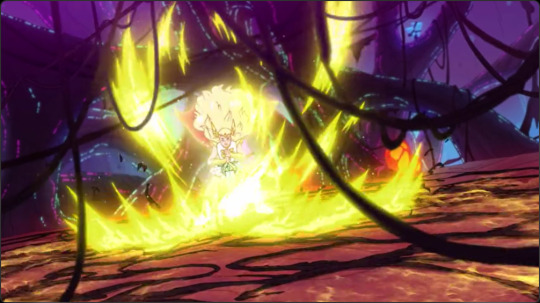
Beast Island was a dumping ground for first ones tech, mostly weaponry, but also a variety of other tools and ideas. I will get back to some stuff in particular, but I feel the need to establish the baseline that this place just looks weird.
That’s the point with this episode, the environment is hostile by definition. You get that through the unfamiliarity of not knowing what the ground is and what is a tree, but you also get it from the fact that everything is spiky and gloopy. This place looks unsafe to be.
However, let’s go back to the theme for a moment, because I think it works really well here.

This place looks both organic and artificial. Like a single living thing that has had stuff done to it to mess it up.
The cycle of abuse is presented here as second hand. The first ones were at war and in their attempts to save themselves, they abused this island for all it was worth, turning it into a prickly version of itself that wards off intruders. That island in turn became a place to hold someone else’s baggage and turned that into weapons of its own. The island is hostile to everyone because of abuse being done to someone else that it got caught up in. That’s the cycle.

The key here is that I don’t think this place was decided upon because it was of particular importance. I think the opposite was true. The first ones needed a place to send their failed weapons and Beast Island was convenient and out of the way for them. They didn’t think about it, it didn’t matter.
Zooming out to the real world for a moment, that’s often how the cycle of abuse happens. It’s not about the person on the receiving end, the giver just needed to vent and was too caught up in themselves to notice that other people were getting hurt.
This is exactly Catra and Scorpia’s dynamic in the show. Catra is in pain, and Scorpia is a convenient scapegoat.

This can even be extrapolated further to the island’s inhabitants. The children of the second generation abuse victim. The creatures that grew to survive in harsh conditions by being harsh in their own right. They got angry, they got vicious, they started picking fights, passing that trauma on to someone else. Keeping the cycle going.

We meet King Micah in this episode, and he is utterly disconnected from reality. He doesn’t know how much time has passed, and he plays into that of the exile going mad and eating bugs. Seriously, I don’t know what this trope is called and it’s driving me nuts.
The point is, Micah has been in that world of someone else’s abuse for so long that he has no sense of reality. But hold on to this thought.

Daniel Dae Kim everybody. The line where he realises how long he's been gone is stellar and one of the best line reads in the entire series as far as I am concerned.
One of the key moments in this episode then is the depressive efforts of the source. The heart of the island, the place where all the pain is stored.
And the closer you get to this heart, the worse you get. It is a piece of technology that was designed to limit the hope of those around it, to make them want to give up. It’s not a weapon designed to win; it’s designed to subdue.
There are two ways to read this. The first is that maybe the First Ones weren’t the good guys if they had a weapon for subjugation just lying around. But the other plays back into this cycle idea.
What if this was a way that the first ones tried to save themselves, by replicating the techniques of their abuser. By reflecting back that all is lost and they should just give up. But it failed.
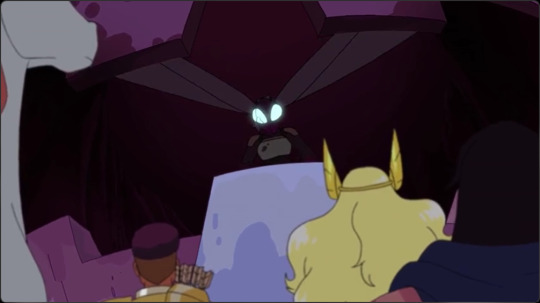
But a weapon, once loaded, will always be used, eventually. That latent malice and energy went somewhere, specifically here. Once again, it was convenient, but it is a potent symbol of becoming exactly the kind of person who oppressed you.
Notice however that this place does have one weakness, hope. The thing that can pull you out of the heart’s embrace is hope that things will get better. Essentially, the abuse can be stopped by pointing out that it is founded in nonsense, which leads me back to Micah.
Micah has survived to this point through determination to see his daughter again. He has stayed sane; he has had a will to survive. He has had somewhere beyond the abuse to anchor himself to. When he realises his wife has died (I know she’s technically still alive but come on), he loses that, and he loses his hope. Grief is a demotivator. It’s a kick up the ass, but it teaches you to avoid things rather than go and do them.
Which leads me back to the environment, and to the Pookas.

The Pookas have survived in this place. They are spiky and unpleasant, yes, but they have survived just as well as if not better than Micah, and they have done that together.
The Pookas wear their abuse like a badge of honour, and they don’t direct it at each other. They hunt in packs and don’t squabble, instead they are silent, watching.
There is a theme with every creature in this place appearing as something and then revealing it's other features and I think that's really cool. The bush suddenly has eyes, the spider crab has hands, and the Pookas have their weird mouths, but they show that off immediately. They are up front with how they operate. "I am weird, I am broken, this is my damage."
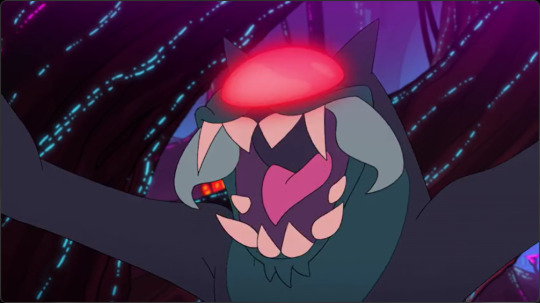
These are weird creatures and I think they are partly synthetic, but they own that. The Pookas break the cycle something savage, and they do it as a group.
Essentially, the Pookas are a support group. They are victims together who can take comfort in each other. They find food together and support each other.
It's not the best method, considering that they hunt people, but it is a step towards healing.
And, for that matter, this step towards healing applies to the rest of the island. This place is alive. There is stuff to eat, there is life growing. Nature gets better, eventually.
That’s the theme of the series. Abuse is cyclical, but those cycles can be broken. You find people to help you, you find a place that is far away from the abuse, you bear your scars for the world to see and you channel your anger in a healthy way.

Final Thoughts
This is a shorter post for two reasons. The first is that I don’t have much time during the week in which I am writing this, but the second is that I really don’t like this episode.
Don’t get me wrong, Daniel Dae Kim kills this role and should be a joy to watch, if the dialogue wasn’t weird and if the conflict surrounding his daughter didn’t come across as contrived and if the tone seemed in any way intentional. Add to that the fact that, until the final scene, the animation that looks like it was made for a different, much lower budget show (why does swift wind have human facial expressions? He’s a horse!), and I had a really bad time rewatching this episode.
So, I focused on stuff I did like. I thought the Pookas were weirdly cute, and I devised a post to talk about that. This blog exists so I can challenge myself to get better, and sometimes that means scratching out a thousand words about Pookas, and that’s ok.
Next week, however, is Destiny Part 1, so stick around if that interests you.
Previous - Next
#rants#literary analysis#literature analysis#what's so special about...?#character analysis#spop#she ra#she ra and the princesses of power#beast island#she ra king micah#king micah#Oh no he's hot!
29 notes
·
View notes